
Rojava conflict
The Rojava conflict, also known as the Rojava Revolution, is a political upheaval and military conflict taking place in northern Syria, known among Kurds as Western Kurdistan or Rojava.
Rojava conflict: At a conference in Rmelan, the Movement for a Democratic Society declares the establishment of the Democratic Federation of Northern Syria.

The Rojava conflict, also known as the Rojava Revolution, is a political upheaval and military conflict taking place in northern Syria, known among Kurds as Western Kurdistan or Rojava.

Rmelan is a town in the al-Hasakah Governorate in the northeast of Syria. Administratively part of the al-Yaarubiyah nahiyah of al-Malikiyah District, the town is located 900 km northeast of the capital Damascus, 165 km northeast of the governorate capital al-Hasakah, 70 km east of Qamishli, 30 km southwest of the district centre al-Malikiyah and 0.5 km southwest of the sub-district centre Ma'badah. It has an area of 5 km² and a population of 11,500, based on the 2009 official estimate.

The Movement for a Democratic Society is a left-wing umbrella organization in northern Syria founded on 16 January 2011 with the goal of organizing Syrian society under a democratic confederalist system. TEV-DEM is currently chaired by co-chairs Zalal Jagar and Kharib Heso.

The Autonomous Administration of North and East Syria (AANES), also known as Rojava, is a de facto autonomous region in northeastern Syria. It consists of self-governing sub-regions in the areas of Afrin, Jazira, Euphrates, Raqqa, Tabqa, Manbij and Deir Ez-Zor. The region gained its de facto autonomy in 2012 in the context of the ongoing Rojava conflict and the wider Syrian Civil War, in which its official military force, the Syrian Democratic Forces (SDF), has taken part.
First Libyan Civil War: The United Nations Security Council adopted Resolution 1973, authorizing military intervention in Libya to protect civilians.

The First Libyan Civil War was an armed conflict in 2011 in the North African country of Libya which was fought between forces which were loyal to Colonel Muammar Gaddafi and rebel groups that were seeking to oust his government. It erupted with the Libyan Revolution, also known as the 17 February Revolution. The war was preceded by protests in Zawiya on 8 August 2009 and finally ignited by protests in Benghazi beginning on Tuesday, 15 February 2011, which led to clashes with security forces that fired on the crowd. The protests escalated into a rebellion that spread across the country, with the forces opposing Gaddafi establishing an interim governing body, the National Transitional Council.

The United Nations Security Council (UNSC) is one of the six principal organs of the United Nations (UN) and is charged with ensuring international peace and security, recommending the admission of new UN members to the General Assembly, and approving any changes to the UN Charter. Its powers include establishing peacekeeping operations, enacting international sanctions, and authorizing military action. The UNSC is the only UN body with the authority to issue binding resolutions on member states.

Resolution 1973 was adopted by the United Nations Security Council on 17 March 2011 in response to the First Libyan Civil War. The resolution formed the legal basis for military intervention in the Libyan Civil War, demanding "an immediate ceasefire" and authorizing the international community to establish a no-fly zone and to use all means necessary short of foreign occupation to protect civilians.

On 19 March 2011, a multi-state NATO-led coalition began a military intervention in Libya, to implement United Nations Security Council Resolution 1973, in response to events during the First Libyan Civil War. With ten votes in favour and five abstentions, the UN Security Council's intent was to have "an immediate ceasefire in Libya, including an end to the current attacks against civilians, which it said might constitute 'crimes against humanity' ... [imposing] a ban on all flights in the country's airspace — a no-fly zone — and tightened sanctions on the [Muammar] Gaddafi regime and its supporters."
Unrest in Kosovo: More than 22 are killed and 200 wounded. Thirty-five Serbian Orthodox shrines in Kosovo and two mosques in Serbia are destroyed.
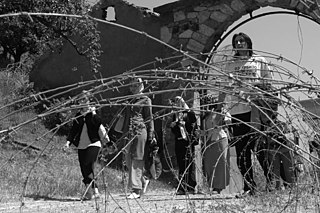
The 2004 unrest in Kosovo is the worst ethnic violence case in Kosovo since the end of the 1998–99 conflict. The violence erupted in the partitioned town of Kosovo Mitrovica, leaving hundreds wounded and at least 14 people dead. The unrest was precipitated by misleading reports in the Kosovo Albanian media which falsely claimed that three Kosovo Albanian boys had drowned after being chased into the Ibar River by a group of Kosovo Serbs. UN peacekeepers and NATO troops scrambled to contain a raging gun battle between Serbs and Albanians. Serbs call the event the March Pogrom, while the Albanians call it the March Unrest.
The Serbian Orthodox Church is one of the autocephalous Eastern Orthodox Christian churches.

Kosovo, officially the Republic of Kosovo, is a partially recognised state in Southeast Europe. It lies at the centre of the Balkans. Kosovo unilaterally declared its independence from Serbia on 17 February 2008, and has since gained diplomatic recognition as a sovereign state by 101 member states of the United Nations. It is bordered by Serbia to the north and east, North Macedonia to the southeast, Albania to the southwest, and Montenegro to the west. Most of central Kosovo is dominated by the vast plains and fields of Dukagjini and Kosovo field. The Accursed Mountains and Šar Mountains rise in the southwest and southeast, respectively. Its capital and largest city is Pristina.

A mosque, also called masjid, is a place of prayer for Muslims. Mosques are usually covered buildings, but can be any place where prayers (sujud) are performed, including outdoor courtyards.

Serbia, officially the Republic of Serbia, is a landlocked country in Southeastern and Central Europe, situated at the crossroads of the Pannonian Plain and the Balkans. It shares land borders with Hungary to the north, Romania to the northeast, Bulgaria to the southeast, North Macedonia to the south, Croatia and Bosnia and Herzegovina to the west, and Montenegro to the southwest, and claims a border with Albania through the disputed territory of Kosovo. Serbia with Kosovo has about 8.6 million inhabitants. Its capital Belgrade is also the largest city.
Secretary of State for Foreign and Commonwealth Affairs Robin Cook, resigns from the British Cabinet in disagreement with government plans for the 2003 invasion of Iraq.

The secretary of state for foreign, Commonwealth and development affairs, known as the foreign secretary, is a minister of the Crown of the Government of the United Kingdom and head of the Foreign, Commonwealth and Development Office. Seen as one of the most senior ministers in the government and a Great Office of State, the incumbent is a member of the Cabinet of the United Kingdom, fourth in the ministerial ranking.

Robert Finlayson "Robin" Cook was a British Labour politician who served as a Member of Parliament (MP) from 1974 until his death in 2005 and served in the Cabinet as Foreign Secretary from 1997 until 2001 when he was replaced by Jack Straw. He then served as Leader of the House of Commons from 2001 until 2003.

The Cabinet of the United Kingdom is the senior decision-making body of His Majesty's Government. A committee of the Privy Council, it is chaired by the prime minister and its members include secretaries of state and other senior ministers.

The 2003 invasion of Iraq was a United States-led invasion of the Republic of Iraq and the first stage of the Iraq War. The invasion phase began on 19 March 2003 (air) and 20 March 2003 (ground) and lasted just over one month, including 26 days of major combat operations, in which a combined force of troops from the United States, the United Kingdom, Australia, and Poland invaded Iraq. Twenty-two days after the first day of the invasion, the capital city of Baghdad was captured by Coalition forces on 9 April 2003 after the six-day-long Battle of Baghdad. This early stage of the war formally ended on 1 May 2003 when U.S. President George W. Bush declared the "end of major combat operations" in his Mission Accomplished speech, after which the Coalition Provisional Authority (CPA) was established as the first of several successive transitional governments leading up to the first Iraqi parliamentary election in January 2005. U.S. military forces later remained in Iraq until the withdrawal in 2011.
Hundreds of followers of the Movement for the Restoration of the Ten Commandments of God, a Ugandan sect, died in a mass murder committed by its leaders.
The Movement for the Restoration of the Ten Commandments of God was a religious movement founded by Credonia Mwerinde and Joseph Kibweteere in southwestern Uganda. It was formed in 1989 after Mwerinde and Kibweteere claimed that they had seen visions of the Virgin Mary. The five primary leaders were Joseph Kibweteere, Joseph Kasapurari, John Kamagara, Dominic Kataribabo, and Credonia Mwerinde.
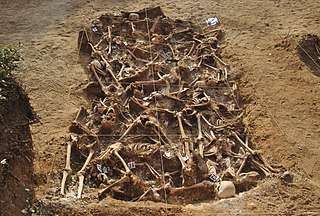
Mass murder is the act of murdering a number of people, typically simultaneously or over a relatively short period of time and in close geographic proximity. The United States Congress defines mass killings as the killings of three or more people during an event with no "cooling-off period" between the homicides. A mass murder typically occurs in a single location where one or more people kill several others.
Five hundred and thirty members of the Ugandan cult Movement for the Restoration of the Ten Commandments of God die in a fire, considered to be a mass murder or suicide orchestrated by leaders of the cult. Elsewhere another 248 members are later found dead.

Uganda, officially the Republic of Uganda, is a landlocked country in East Africa. The country is bordered to the east by Kenya, to the north by South Sudan, to the west by the Democratic Republic of the Congo, to the south-west by Rwanda, and to the south by Tanzania. The southern part of the country includes a substantial portion of Lake Victoria, shared with Kenya and Tanzania. Uganda is in the African Great Lakes region. Uganda also lies within the Nile basin and has a varied but generally a modified equatorial climate. It has a population of around 46 million, of which 8.5 million live in the capital and largest city of Kampala.
The Movement for the Restoration of the Ten Commandments of God was a religious movement founded by Credonia Mwerinde and Joseph Kibweteere in southwestern Uganda. It was formed in 1989 after Mwerinde and Kibweteere claimed that they had seen visions of the Virgin Mary. The five primary leaders were Joseph Kibweteere, Joseph Kasapurari, John Kamagara, Dominic Kataribabo, and Credonia Mwerinde.
Israeli Embassy attack in Buenos Aires: Car bomb attack kills 29 and injures 242.

The attack on the Israeli embassy in Buenos Aires was a suicide bombing attack on the building of the Israeli embassy of Argentina, located in Buenos Aires, which was carried out on 17 March 1992. 29 civilians were killed in the attack and 242 additional civilians were injured.

A car bomb, bus bomb, lorry bomb, or truck bomb, also known as a vehicle-borne improvised explosive device (VBIED), is an improvised explosive device designed to be detonated in an automobile or other vehicles.
A referendum to end apartheid in South Africa is passed 68.7% to 31.2%.

A referendum on ending apartheid was held in South Africa on 17 March 1992. The referendum was limited to white South African voters, who were asked whether or not they supported the negotiated reforms begun by State President F. W. de Klerk two years earlier, in which he proposed to end the apartheid system that had been implemented since 1948. The result of the election was a large victory for the "yes" side, which ultimately resulted in apartheid being lifted. Universal suffrage was introduced two years later.

South Africa, officially the Republic of South Africa (RSA), is the southernmost country in Africa. It is bounded to the south by 2,798 kilometres (1,739 mi) of coastline that stretch along the South Atlantic and Indian Oceans; to the north by the neighbouring countries of Namibia, Botswana, and Zimbabwe; and to the east and northeast by Mozambique and Eswatini. It also completely enclaves the country Lesotho. It is the southernmost country on the mainland of the Old World, and the second-most populous country located entirely south of the equator, after Tanzania. South Africa is a biodiversity hotspot, with unique biomes, plant and animal life. With over 60 million people, the country is the world's 24th-most populous nation and covers an area of 1,221,037 square kilometres. South Africa has three capital cities, with the executive, judicial and legislative branches of government based in Pretoria, Bloemfontein, and Cape Town respectively. The largest city is Johannesburg.
In a referendum, nearly 70 percent of voters in nine Soviet republics agreed that the Soviet Union should be preserved.
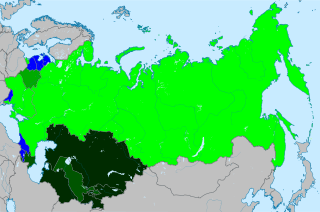
A referendum on the future of the Soviet Union was held on 17 March 1991 across the Soviet Union. The question put to voters wasDo you consider necessary the preservation of the Union of Soviet Socialist Republics as a renewed federation of equal sovereign republics in which the rights and freedom of an individual of any ethnicity will be fully guaranteed? (Russian transliteration: Schitaete li Vy neobkhodimym sokhranenie Soiuza Sovetskikh Sotsialisticheskikh Respublik kak obnovlionnoi federatsii ravnopravnykh suverennykh respublik, v kotoroi budut v polnoi mere garantirovatʹsia prava i svobody cheloveka liuboi natsionalʹnosti?)

The Republics of the Union of Soviet Socialist Republics or the Union Republics were national-based administrative units of the Union of Soviet Socialist Republics (USSR). The Soviet Union was formed in 1922 by a treaty between the Soviet republics of Byelorussia, Russia, Transcaucasia, and Ukraine, by which they became its constituent republics.
Eritrean War of Independence: Eritrean People's Liberation Front troops encircled Ethiopian forces in the Battle of Afabet, gaining a decisive victory three days later.

The Eritrean War of Independence was a war for independence which Eritrean independence fighters waged against successive Ethiopian governments from 1 September 1961 to 24 May 1991.

The Eritrean People's Liberation Front (EPLF), colloquially known as Shabia, was an armed Marxist–Leninist organization that fought for the independence of Eritrea from Ethiopia. It emerged in 1970 as a far-left to left-wing nationalist group that split from the Eritrean Liberation Front (ELF). After achieving Eritrean independence in 1991, it transformed into the People's Front for Democracy and Justice (PFDJ), which serves as Eritrea's sole legal political party.
The Battle of Afabet was fought from 17 March through 20 March 1988 in and around the town of Afabet, as part of the Eritrean War of Independence.
A Colombian Boeing 727 jetliner, Avianca Flight 410, crashes into a mountainside near the Venezuelan border killing 143.

Colombia, officially the Republic of Colombia, is a country in South America with an insular region in North America. It is bordered by the Caribbean Sea to the north, Venezuela to the east, Brazil to the southeast, Ecuador and Peru to the south, the Pacific Ocean to the west and Panama to the northwest. Colombia comprises 32 departments and the Capital District of Bogotá, the country's largest city. It covers an area of 1,141,748 square kilometers (440,831 sq mi), with a population of 50 million. Colombia's cultural heritage reflects influences by various Amerindian civilizations, European settlement, enslaved Africans, as well as immigration from Europe and the Middle East. Spanish is the nation's official language, besides which over 70 languages are spoken.

The Boeing 727 is an American narrow-body airliner that was developed and produced by Boeing Commercial Airplanes. After the heavy 707 quad-jet was introduced in 1958, Boeing addressed the demand for shorter flight lengths from smaller airports. On December 5, 1960, the 727 was launched with 40 orders each from United Airlines and Eastern Air Lines. The first 727-100 rolled out November 27, 1962, first flew on February 9, 1963, and entered service with Eastern on February 1, 1964.

A jet airliner or jetliner is an airliner powered by jet engines. Airliners usually have two or four jet engines; three-engined designs were popular in the 1970s but are less common today. Airliners are commonly classified as either the large wide-body aircraft, medium narrow-body aircraft and smaller regional jet.

Avianca Flight 410 was a flight that crashed at 13:17 on March 17, 1988, near Cúcuta, Colombia, which occurred shortly after takeoff when it flew into a mountain. All 143 people on board were killed. It was the deadliest aviation accident to occur in Colombia at the time.
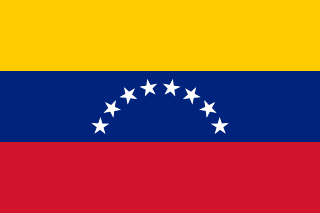
Venezuela, officially the Bolivarian Republic of Venezuela, is a country on the northern coast of South America, consisting of a continental landmass and many islands and islets in the Caribbean Sea. It has a territorial extension of 916,445 km2 (353,841 sq mi), and its population was estimated at 29 million in 2022. The capital and largest urban agglomeration is the city of Caracas.
Eritrean War of Independence: The Nadew Command, an Ethiopian army corps in Eritrea, is attacked on three sides by military units of the Eritrean People's Liberation Front in the opening action of the Battle of Afabet.

The Eritrean War of Independence was a war for independence which Eritrean independence fighters waged against successive Ethiopian governments from 1 September 1961 to 24 May 1991.

Ethiopia, officially the Federal Democratic Republic of Ethiopia, is a landlocked country in the Horn of Africa. It shares borders with Eritrea to the north, Djibouti to the northeast, Somalia to the east and northeast, Kenya to the south, South Sudan to the west, and Sudan to the northwest. Ethiopia has a total area of 1,100,000 square kilometres. As of 2022, it is home to around 113.5 million inhabitants, making it the 12th-most populous country in the world and the 2nd-most populous in Africa after Nigeria. The national capital and largest city, Addis Ababa, lies several kilometres west of the East African Rift that splits the country into the African and Somali tectonic plates.

Eritrea, officially the State of Eritrea, is a country in the Horn of Africa region of Eastern Africa, with its capital and largest city at Asmara. It is bordered by Ethiopia in the south, Sudan in the west, and Djibouti in the southeast. The northeastern and eastern parts of Eritrea have an extensive coastline along the Red Sea. The nation has a total area of approximately 117,600 km2 (45,406 sq mi), and includes the Dahlak Archipelago and several of the Hanish Islands.

The Eritrean People's Liberation Front (EPLF), colloquially known as Shabia, was an armed Marxist–Leninist organization that fought for the independence of Eritrea from Ethiopia. It emerged in 1970 as a far-left to left-wing nationalist group that split from the Eritrean Liberation Front (ELF). After achieving Eritrean independence in 1991, it transformed into the People's Front for Democracy and Justice (PFDJ), which serves as Eritrea's sole legal political party.
The Battle of Afabet was fought from 17 March through 20 March 1988 in and around the town of Afabet, as part of the Eritrean War of Independence.
American serial killer Richard Ramirez (pictured), known as "the Night Stalker", began a home invasion burglary and killing spree that resulted in 13 deaths and 11 sexual assaults over the following five months.

A serial killer is typically a person who murders three or more persons, with the murders taking place over more than a month and including a significant period of time between them. While most authorities set a threshold of three murders, others extend it to four or lessen it to two.
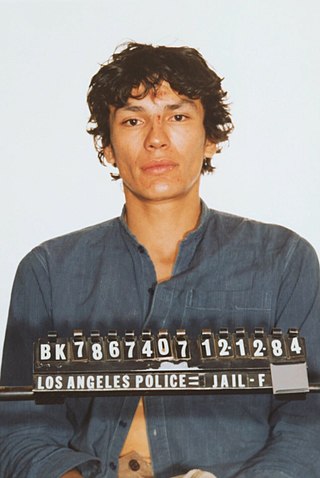
Ricardo "Richard" Leyva Muñoz Ramirez, dubbed Night Stalker, Valley Intruder, and Walk-in Killer was an American serial killer whose crime spree took place in California between June 1984 and August 1985. He was convicted and sentenced to death in 1989. He died in 2013 while awaiting execution.
A home invasion, also called a hot prowl burglary, is a sub-type of burglary in which an offender unlawfully enters into a building residence while the occupants are inside. The overarching intent of a hot prowl burglary can be theft, robbery, assault, sexual assault, murder, kidnapping, or another crime, either by stealth or direct force. Hot prowl burglaries are considered especially dangerous by law enforcement because of the potential for a violent confrontation between the occupant and the offender.
Serial killer Richard Ramirez, aka the "Night Stalker", commits the first two murders in his Los Angeles murder spree.

Ricardo "Richard" Leyva Muñoz Ramirez, dubbed Night Stalker, Valley Intruder, and Walk-in Killer was an American serial killer whose crime spree took place in California between June 1984 and August 1985. He was convicted and sentenced to death in 1989. He died in 2013 while awaiting execution.
The Penmanshiel Tunnel in the Scottish Borders region of Scotland collapsed during refurbishing construction, killing two workers, and leading to the abandonment of the tunnel.
Penmanshiel Tunnel is a now-disused railway tunnel near Grantshouse, Berwickshire, in the Scottish Borders region of Scotland. It was formerly part of the East Coast Main Line between Berwick-upon-Tweed and Dunbar.

The Scottish Borders is one of 32 council areas of Scotland. It borders the City of Edinburgh, Dumfries and Galloway, East Lothian, Midlothian, South Lanarkshire, West Lothian and, to the south-west, south and east, the English counties of Cumbria and Northumberland. The administrative centre of the area is Newtown St Boswells.
The Penmanshiel Tunnel collapses during engineering works, killing two workers.
Penmanshiel Tunnel is a now-disused railway tunnel near Grantshouse, Berwickshire, in the Scottish Borders region of Scotland. It was formerly part of the East Coast Main Line between Berwick-upon-Tweed and Dunbar.
Slava Veder took his Pulitzer Prize-winning photograph Burst of Joy, which came to symbolize the end of United States involvement in the Vietnam War.

The Pulitzer Prize for Feature Photography is one of the American Pulitzer Prizes annually awarded for journalism. It recognizes a distinguished example of feature photography in black and white or color, which may consist of a photograph or photographs, a sequence or an album.
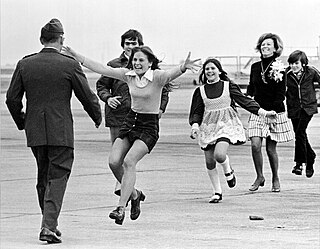
Burst of Joy is a Pulitzer Prize-winning photograph by Associated Press photographer Slava "Sal" Veder, taken on March 17, 1973 at Travis Air Force Base in California.

The Vietnam War was a conflict in Vietnam, Laos, and Cambodia from 1 November 1955 to the fall of Saigon on 30 April 1975. It was the second of the Indochina Wars and was officially fought between North Vietnam and South Vietnam. The north was supported by the Soviet Union, China, and other communist states, while the south was supported by the United States and other anti-communist allies. The war is widely considered to be a Cold War-era proxy war. It lasted almost 20 years, with direct U.S. involvement ending in 1973. The conflict also spilled over into neighboring states, exacerbating the Laotian Civil War and the Cambodian Civil War, which ended with all three countries becoming communist states by 1975.
The Pulitzer Prize-winning photograph Burst of Joy is taken, depicting a former prisoner of war being reunited with his family, which came to symbolize the end of United States involvement in the Vietnam War.

The Pulitzer Prize is an award for achievements in newspaper, magazine, online journalism, literature, and musical composition within the United States. It was established in 1917 by provisions in the will of Joseph Pulitzer, who had made his fortune as a newspaper publisher, and is administered by Columbia University. Prizes are awarded annually in twenty-one categories. In twenty of the categories, each winner receives a certificate and a US$15,000 cash award. The winner in the public service category is awarded a gold medal.

Burst of Joy is a Pulitzer Prize-winning photograph by Associated Press photographer Slava "Sal" Veder, taken on March 17, 1973 at Travis Air Force Base in California.

A prisoner of war (POW) is a person who is held captive by a belligerent power during or immediately after an armed conflict. The earliest recorded usage of the phrase "prisoner of war" dates back to 1610.

The Vietnam War was a conflict in Vietnam, Laos, and Cambodia from 1 November 1955 to the fall of Saigon on 30 April 1975. It was the second of the Indochina Wars and was officially fought between North Vietnam and South Vietnam. The north was supported by the Soviet Union, China, and other communist states, while the south was supported by the United States and other anti-communist allies. The war is widely considered to be a Cold War-era proxy war. It lasted almost 20 years, with direct U.S. involvement ending in 1973. The conflict also spilled over into neighboring states, exacerbating the Laotian Civil War and the Cambodian Civil War, which ended with all three countries becoming communist states by 1975.
Golda Meir became the first female prime minister of Israel.

Golda Meir was an Israeli politician, teacher, and kibbutznikit who served as the fourth prime minister of Israel from 1969 to 1974. She was the first woman to become head of government in Israel.

The prime minister of Israel is the head of government and chief executive of the State of Israel.
Golda Meir becomes the first female Prime Minister of Israel.

Golda Meir was an Israeli politician, teacher, and kibbutznikit who served as the fourth prime minister of Israel from 1969 to 1974. She was the first woman to become head of government in Israel.

The prime minister of Israel is the head of government and chief executive of the State of Israel.
Six thousand sheep were killed on ranches near Dugway Proving Ground in Utah as a result of the U.S. Army spraying a nerve agent.

Dugway Proving Ground (DPG) is a U.S. Army facility established in 1942 to test biological and chemical weapons, located about 85 mi (137 km) southwest of Salt Lake City, Utah, United States, and 13 mi (21 km) south of the 2,624 sq mi (6,800 km2) Utah Test and Training Range.

Utah is a state in the Mountain West subregion of the Western United States. Utah is a landlocked U.S. state bordered to its east by Colorado, to its northeast by Wyoming, to its north by Idaho, to its south by Arizona, and to its west by Nevada. Utah also touches a corner of New Mexico in the southeast. Of the fifty U.S. states, Utah is the 13th-largest by area; with a population over three million, it is the 30th-most-populous and 11th-least-densely populated. Urban development is mostly concentrated in two areas: the Wasatch Front in the north-central part of the state, which is home to roughly two-thirds of the population and includes the capital city, Salt Lake City; and Washington County in the southwest, with more than 180,000 residents. Most of the western half of Utah lies in the Great Basin.
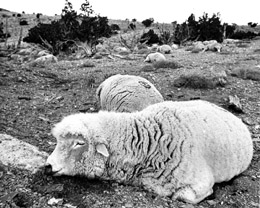
The Dugway sheep incident, also known as the Skull Valley sheep kill, was a March 1968 sheep kill that has been connected to United States Army chemical and biological warfare programs at Dugway Proving Ground in Utah. Six thousand sheep were killed on ranches near the base, and the popular explanation blamed Army testing of chemical weapons for the incident, though alternative explanations have been offered. A report, commissioned by Air Force Press Officer Jesse Stay and first made public in 1998, was called the "first documented admission" from the Army that a nerve agent killed the sheep at Skull Valley.
As a result of nerve gas testing by the U.S. Army Chemical Corps in Skull Valley, Utah, over 6,000 sheep are found dead.
Nerve agents, sometimes also called nerve gases, are a class of organic chemicals that disrupt the mechanisms by which nerves transfer messages to organs. The disruption is caused by the blocking of acetylcholinesterase (AChE), an enzyme that catalyzes the breakdown of acetylcholine, a neurotransmitter. Nerve agents are acetylcholinesterase inhibitors used as poison.

The United States Army (USA) is the land service branch of the United States Armed Forces. It is one of the eight U.S. uniformed services, and is designated as the Army of the United States in the U.S. Constitution. The oldest and most senior branch of the U.S. military in order of precedence, the modern U.S. Army has its roots in the Continental Army, which was formed 14 June 1775 to fight the American Revolutionary War (1775–1783)—before the United States was established as a country. After the Revolutionary War, the Congress of the Confederation created the United States Army on 3 June 1784 to replace the disbanded Continental Army. The United States Army considers itself to be a continuation of the Continental Army, and thus considers its institutional inception to be the origin of that armed force in 1775.

The Chemical Corps is the branch of the United States Army tasked with defending against chemical, biological, radiological, and nuclear (CBRN) weapons. The Chemical Warfare Service was established on 28 June 1918, combining activities that until then had been dispersed among five separate agencies of the United States federal government. It was made a permanent branch of the Regular Army by the National Defense Act of 1920. In 1945, it was redesignated the Chemical Corps.

Skull Valley is a 40-mile (64 km) long valley located in east Tooele County, Utah, United States at the southwest of the Great Salt Lake. The valley trends north–south, but turns slightly northeast to meet Stansbury Bay,.

The Dugway sheep incident, also known as the Skull Valley sheep kill, was a March 1968 sheep kill that has been connected to United States Army chemical and biological warfare programs at Dugway Proving Ground in Utah. Six thousand sheep were killed on ranches near the base, and the popular explanation blamed Army testing of chemical weapons for the incident, though alternative explanations have been offered. A report, commissioned by Air Force Press Officer Jesse Stay and first made public in 1998, was called the "first documented admission" from the Army that a nerve agent killed the sheep at Skull Valley.
Off the coast of Spain in the Mediterranean, the DSV Alvin submarine finds a missing American hydrogen bomb.
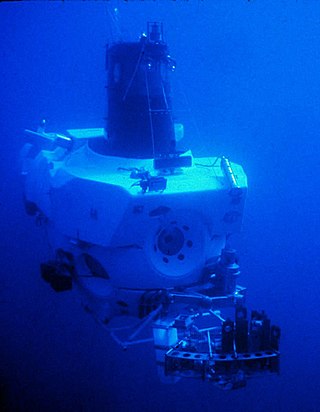
Alvin (DSV-2) is a crewed deep-ocean research submersible owned by the United States Navy and operated by the Woods Hole Oceanographic Institution (WHOI) in Woods Hole, Massachusetts. The vehicle was built by General Mills' Electronics Group in Minneapolis, Minnesota. Named to honor the prime mover and creative inspiration for the vehicle, Allyn Vine, Alvin was commissioned on 5 June 1964. The submersible is launched from the deep submergence support vessel RV Atlantis (AGOR-25), which is also owned by the U.S. Navy and operated by WHOI. The submersible has made more than 5,000 dives, carrying two scientists and a pilot, to observe the lifeforms that must cope with super-pressures and move about in total darkness, as well as exploring the wreck of Titanic. Research conducted by Alvin has been featured in nearly 2,000 scientific papers.
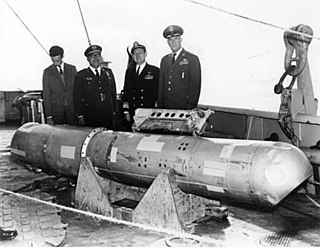
The 1966 Palomares B-52 crash, also called the Palomares incident, occurred on 17 January 1966, when a B-52G bomber of the United States Air Force's Strategic Air Command collided with a KC-135 tanker during mid-air refueling at 31,000 feet (9,450 m) over the Mediterranean Sea, off the coast of Spain. The KC-135 was destroyed when its fuel load ignited, killing all four crew members. The B-52G broke apart, killing three of the seven crew members aboard.
An eruption of Mount Agung on Bali, Indonesia, killed approximately 1,500 people.

Mount Agung is an active volcano in Bali, Indonesia, southeast of Mount Batur volcano, also in Bali. It is the highest point on Bali, and dominates the surrounding area, influencing the climate, especially rainfall patterns. From a distance, the mountain appears to be perfectly conical. From the peak of the mountain, it is possible to see the peak of Mount Rinjani on the nearby island of Lombok, to the east, although both mountains are frequently covered in clouds. Agung is a stratovolcano, with a large and deep crater. Its most recent eruptions occurred from 2017–2019.
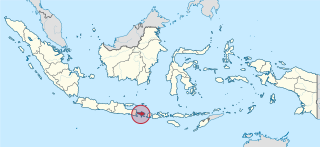
Bali is a province of Indonesia and the westernmost of the Lesser Sunda Islands. East of Java and west of Lombok, the province includes the island of Bali and a few smaller neighbouring islands, notably Nusa Penida, Nusa Lembongan, and Nusa Ceningan to the southeast. The provincial capital, Denpasar, is the most populous city in the Lesser Sunda Islands and the second-largest, after Makassar, in Eastern Indonesia. The upland town of Ubud in Greater Denpasar is considered Bali's cultural centre. The province is Indonesia's main tourist destination, with a significant rise in tourism since the 1980s. Tourism-related business makes up 80% of its economy.
Mount Agung erupts on Bali killing more than 1,100 people.

Mount Agung is an active volcano in Bali, Indonesia, southeast of Mount Batur volcano, also in Bali. It is the highest point on Bali, and dominates the surrounding area, influencing the climate, especially rainfall patterns. From a distance, the mountain appears to be perfectly conical. From the peak of the mountain, it is possible to see the peak of Mount Rinjani on the nearby island of Lombok, to the east, although both mountains are frequently covered in clouds. Agung is a stratovolcano, with a large and deep crater. Its most recent eruptions occurred from 2017–2019.

Bali is a province of Indonesia and the westernmost of the Lesser Sunda Islands. East of Java and west of Lombok, the province includes the island of Bali and a few smaller neighbouring islands, notably Nusa Penida, Nusa Lembongan, and Nusa Ceningan to the southeast. The provincial capital, Denpasar, is the most populous city in the Lesser Sunda Islands and the second-largest, after Makassar, in Eastern Indonesia. The upland town of Ubud in Greater Denpasar is considered Bali's cultural centre. The province is Indonesia's main tourist destination, with a significant rise in tourism since the 1980s. Tourism-related business makes up 80% of its economy.
U.S. President Dwight D. Eisenhower signs the National Security Council directive on the anti-Cuban covert action program that will ultimately lead to the Bay of Pigs Invasion.

Dwight David "Ike" Eisenhower was an American military officer and statesman who served as the 34th president of the United States from 1953 to 1961. During World War II, he served as Supreme Commander of the Allied Expeditionary Force in Europe and achieved the five-star rank of General of the Army. He planned and supervised the invasion of North Africa in Operation Torch in 1942–1943 as well as the invasion of Normandy (D-Day) from the Western Front in 1944–1945.

The United States National Security Council (NSC) is the principal forum used by the President of the United States for consideration of national security, military, and foreign policy matters. Based in the White House, it is part of the Executive Office of the President of the United States, and composed of senior national security advisors and Cabinet officials.

Cuba, officially the Republic of Cuba, is an island country comprising the island of Cuba, as well as Isla de la Juventud and several minor archipelagos. Cuba is located where the northern Caribbean Sea, Gulf of Mexico, and Atlantic Ocean meet. Cuba is located east of the Yucatán Peninsula (Mexico), south of both the American state of Florida and the Bahamas, west of Hispaniola, and north of both Jamaica and the Cayman Islands. Havana is the largest city and capital; other major cities include Santiago de Cuba and Camagüey. The official area of the Republic of Cuba is 109,884 km2 (42,426 sq mi) but a total of 350,730 km² including the exclusive economic zone. Cuba is the second-most populous country in the Caribbean after Haiti, with over 11 million inhabitants.
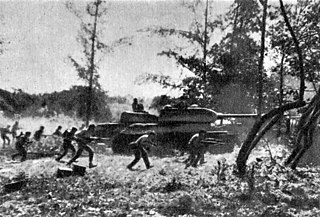
The Bay of Pigs Invasion was a failed military landing operation on the southwestern coast of Cuba in 1961 by Cuban exiles, covertly financed and directed by the U.S. government. It was aimed at overthrowing Fidel Castro's communist government. The operation took place at the height of the Cold War, and its failure influenced relations between Cuba, the United States, and the Soviet Union.
The United States launches the first solar-powered satellite, which is also the first satellite to achieve a long-term orbit.

Vanguard 1 is an American satellite that was the fourth artificial Earth-orbiting satellite to be successfully launched, following Sputnik 1, Sputnik 2, and Explorer 1. It was launched 17 March 1958. Vanguard 1 was the first satellite to have solar electric power. Although communications with the satellite were lost in 1964, it remains the oldest human-made object still in orbit, together with the upper stage of its launch vehicle.
A plane crash on the slopes of Mount Manunggal killed Philippine president Ramon Magsaysay and 24 others.
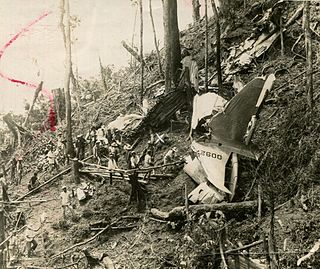
On March 17, 1957, a C-47 Skytrain transport aircraft crashed on the slopes of Mount Manunggal on the island of Cebu in the Philippines. The crash killed 25 of the aircraft's 26 occupants, including the incumbent president of the Philippines, Ramon Magsaysay. Several high-ranking Philippine government ministers, military officials, and journalists were also among the dead. The sole survivor was a reporter for the Philippine Herald, Nestor Mata.
Mount Manunggal is the third-highest peak in the island of Cebu after Osmena Peak and Lugsangan Peak. It is located in Barangay Magsaysay in Balamban, Cebu province, rising 982 m (3,222 ft) above sea level. It is the site of the crash of the presidential plane Mt. Pinatubo which killed President Ramon Magsaysay and twenty-four others on March 17, 1957. An annual trek is held here to commemorate his death. The site is accessible through many trails but the trail from Tagba-o and at Cantipla in Tabunan, Cebu City is the main route from which the yearly Pres. Ramon Magsaysay Death Anniversary Climb is held.

Ramon del Fierro Magsaysay Sr. was a Filipino statesman who served as the seventh president of the Philippines, from December 30, 1953, until his death in an aircraft disaster on March 17, 1957. An automobile mechanic by profession, Magsaysay was appointed military governor of Zambales after his outstanding service as a guerrilla leader during the Pacific War. He then served two terms as Liberal Party congressman for Zambales's at-large district before being appointed Secretary of National Defense by President Elpidio Quirino. He was elected president under the banner of the Nacionalista Party. He was the first Philippine president born in the 20th century and the first to be born after the Spanish colonial era.
A plane crash in Cebu, Philippines kills Philippine President Ramon Magsaysay and 24 others.

On March 17, 1957, a C-47 Skytrain transport aircraft crashed on the slopes of Mount Manunggal on the island of Cebu in the Philippines. The crash killed 25 of the aircraft's 26 occupants, including the incumbent president of the Philippines, Ramon Magsaysay. Several high-ranking Philippine government ministers, military officials, and journalists were also among the dead. The sole survivor was a reporter for the Philippine Herald, Nestor Mata.

Cebu, officially the Province of Cebu, is a province of the Philippines located in the Central Visayas (Region VII) region, and consists of a main island and 167 surrounding islands and islets. Its capital and largest city is Cebu City, nicknamed "the Queen City of the South", the oldest city and first capital of the Philippines, which is politically independent from the provincial government.

The Philippines, officially the Republic of the Philippines, is an archipelagic country in Southeast Asia. It is situated in the western Pacific Ocean and consists of around 7,641 islands that are broadly categorized under three main geographical divisions from north to south: Luzon, Visayas, and Mindanao. The Philippines is bounded by the South China Sea to the west, the Philippine Sea to the east, and the Celebes Sea to the southwest. It shares maritime borders with Taiwan to the north, Japan to the northeast, Palau to the east and southeast, Indonesia to the south, Malaysia to the southwest, Vietnam to the west, and China to the northwest. The Philippines covers an area of 300,000 km2 (120,000 sq mi) and, as of 2021, it had a population of around 109 million people, making it the world's thirteenth-most populous country. The Philippines has diverse ethnicities and cultures throughout its islands. Manila is the country's capital, while the largest city is Quezon City; both lie within the urban area of Metro Manila.

The president of the Philippines is the head of state, head of government and chief executive of the Philippines. The president leads the executive branch of the Philippine government and is the commander-in-chief of the Armed Forces of the Philippines.

Ramon del Fierro Magsaysay Sr. was a Filipino statesman who served as the seventh president of the Philippines, from December 30, 1953, until his death in an aircraft disaster on March 17, 1957. An automobile mechanic by profession, Magsaysay was appointed military governor of Zambales after his outstanding service as a guerrilla leader during the Pacific War. He then served two terms as Liberal Party congressman for Zambales's at-large district before being appointed Secretary of National Defense by President Elpidio Quirino. He was elected president under the banner of the Nacionalista Party. He was the first Philippine president born in the 20th century and the first to be born after the Spanish colonial era.
Ice hockey fans in Montreal rioted to protest the suspension of Montreal Canadiens star Maurice Richard for hitting an official.

Ice hockey is a team sport played on ice skates, usually on an ice skating rink with lines and markings specific to the sport. It belongs to a family of sports called hockey. In ice hockey, two opposing teams use ice hockey sticks to control, advance and shoot a closed, vulcanized, rubber disc called a "puck" into the other team's goal. Each goal is worth one point. The team which scores the most goals is declared the winner. In a formal game, each team has six skaters on the ice at a time, barring any penalties, one of whom is the goaltender. Ice hockey is a full contact sport.

The Richard Riot was a riot on March 17, 1955, in Montreal, Quebec, Canada. The riot was named after Maurice Richard, the star ice hockey player for the Montreal Canadiens of the National Hockey League (NHL). Following a violent altercation on March 13 in which Richard hit a linesman, NHL president Clarence Campbell suspended him for the remainder of the 1954–55 NHL season, including the playoffs. Montreal fans protested that the suspension was too severe; the team's largely Francophone fan base claimed the length of the suspension was motivated by Richard's French Canadian ethnicity. Outside of Montreal, however, the suspension was seen as justified and, if anything, too short.

The Montreal Canadiens, officially le Club de hockey Canadien and colloquially known as the Habs, are a professional ice hockey team based in Montreal. They compete in the National Hockey League (NHL) as a member of the Atlantic Division of the Eastern Conference. Since 1996, the Canadiens have played their home games at Bell Centre, originally known as Molson Centre. The team previously played at the Montreal Forum, which housed the team for seven decades and all but their first two Stanley Cup championships.
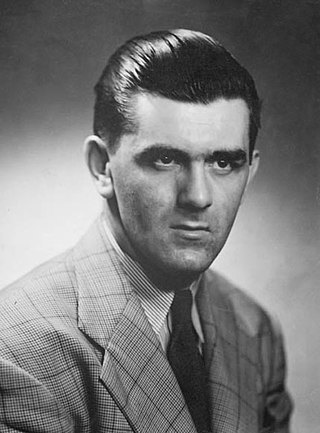
Joseph Henri Maurice "Rocket" Richard was a Canadian professional ice hockey player who played 18 seasons in the National Hockey League (NHL) for the Montreal Canadiens. He was the first player in NHL history to score 50 goals in one season, accomplishing the feat in 50 games in 1944–45, and the first to reach 500 career goals.

In ice hockey, an official is a person who has some responsibility for enforcing the rules and maintaining the order of the game. There are two categories of officials, on-ice officials, who are the referees and linesmen that enforce the rules during gameplay, and off-ice officials, who have an administrative role rather than an enforcement role.
Scientists at Lawrence Berkeley National Laboratory announced the synthesis of californium, a radioactive transuranium element.
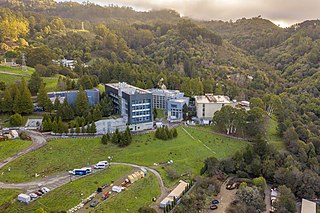
Lawrence Berkeley National Laboratory (LBNL), commonly referred to as Berkeley Lab, is a United States national laboratory that is owned by, and conducts scientific research on behalf of, the United States Department of Energy. Located in the hills of Berkeley, California, the lab overlooks the campus of the University of California, Berkeley, and is managed by the University of California system.

Californium is a radioactive chemical element with the symbol Cf and atomic number 98. The element was first synthesized in 1950 at Lawrence Berkeley National Laboratory, by bombarding curium with alpha particles. It is an actinide element, the sixth transuranium element to be synthesized, and has the second-highest atomic mass of all elements that have been produced in amounts large enough to see with the naked eye. The element was named after the university and the U.S. state of California.
The transuranium elements are the chemical elements with atomic numbers greater than 92, which is the atomic number of uranium. All of these elements are synthetic, unstable and decay radioactively into other elements.
Researchers at the University of California, Berkeley announce the creation of element 98, which they name "californium".

The University of California, Berkeley is a public land-grant research university in Berkeley, California. Established in 1868 as the University of California, it is the state's first land-grant university and the founding campus of the University of California system. Its fourteen colleges and schools offer over 350 degree programs and enroll some 31,800 undergraduate and 13,200 graduate students. Berkeley ranks among the world's top universities.

Californium is a radioactive chemical element with the symbol Cf and atomic number 98. The element was first synthesized in 1950 at Lawrence Berkeley National Laboratory, by bombarding curium with alpha particles. It is an actinide element, the sixth transuranium element to be synthesized, and has the second-highest atomic mass of all elements that have been produced in amounts large enough to see with the naked eye. The element was named after the university and the U.S. state of California.
Belgium, France, Luxembourg, the Netherlands and the United Kingdom sign the Treaty of Brussels, a precursor to the North Atlantic Treaty establishing NATO.

Belgium, officially the Kingdom of Belgium, is a country in Northwestern Europe. The country is bordered by the Netherlands to the north, Germany to the east, Luxembourg to the southeast, France to the southwest, and the North Sea to the northwest. It covers an area of 30,528 km2 (11,787 sq mi) and has a population of more than 11.5 million, making it the 22nd most densely populated country in the world and the 6th most densely populated country in Europe, with a density of 376 per square kilometre (970/sq mi). The capital and largest city is Brussels; other major cities are Antwerp, Ghent, Charleroi, Liège, Bruges, Namur, and Leuven.

France, officially the French Republic, is a transcontinental country predominantly located in Western Europe and spanning overseas regions and territories in the Americas and the Atlantic, Pacific and Indian Oceans. Its metropolitan area extends from the Rhine to the Atlantic Ocean and from the Mediterranean Sea to the English Channel and the North Sea; overseas territories include French Guiana in South America, Saint Pierre and Miquelon in the North Atlantic, the French West Indies, and many islands in Oceania and the Indian Ocean. Due to its several coastal territories, France has the largest exclusive economic zone in the world. France borders Belgium, Luxembourg, Germany, Switzerland, Monaco, Italy, Andorra, and Spain in continental Europe, as well as the Netherlands, Suriname, and Brazil in the Americas via its overseas territories in French Guiana and Saint Martin. Its eighteen integral regions span a combined area of 643,801 km2 (248,573 sq mi) and contain close to 68 million people. France is a unitary semi-presidential republic with its capital in Paris, the country's largest city and main cultural and commercial centre; other major urban areas include Marseille, Lyon, Toulouse, Lille, Bordeaux, and Nice.

Luxembourg, officially the Grand Duchy of Luxembourg, is a small landlocked country in Western Europe. It borders Belgium to the west and north, Germany to the east, and France to the south. Its capital and most populous city, Luxembourg, is one of the four institutional seats of the European Union and the seat of several EU institutions, notably the Court of Justice of the European Union, the highest judicial authority. Luxembourg's culture, people, and languages are highly intertwined with its French and German neighbors; while Luxembourgish is legally the only national language of the Luxembourgish people, French and German are also used in administrative and judicial matters and all three are considered administrative languages of the country.

The Netherlands, informally Holland, is a country located in Northwestern Europe with overseas territories in the Caribbean. It is the largest of four constituent countries of the Kingdom of the Netherlands. The Netherlands consists of twelve provinces; it borders Germany to the east, Belgium to the south, with a North Sea coastline to the north and west. It shares maritime borders with the United Kingdom, Germany and Belgium in the North Sea. The country's official language is Dutch, with West Frisian as a secondary official language in the province of Friesland. Dutch Low Saxon and Limburgish are recognised regional languages, while Dutch Sign Language, Sinte Romani and Yiddish are recognised non-territorial languages. Dutch, English and Papiamento are official in the Caribbean territories.

The United Kingdom of Great Britain and Northern Ireland, commonly known as the United Kingdom (UK) or Britain, is a country in Europe, off the north-western coast of the continental mainland. It comprises England, Scotland, Wales and Northern Ireland. The United Kingdom includes the island of Great Britain, the north-eastern part of the island of Ireland, and many smaller islands within the British Isles. Northern Ireland shares a land border with the Republic of Ireland; otherwise, the United Kingdom is surrounded by the Atlantic Ocean, the North Sea, the English Channel, the Celtic Sea and the Irish Sea. The total area of the United Kingdom is 242,495 square kilometres (93,628 sq mi), with an estimated 2020 population of more than 67 million people.
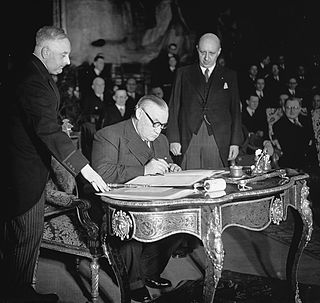
The Treaty of Brussels, also referred to as the Brussels Pact, was the founding treaty of the Western Union (WU) between 1948 and 1954, when it was amended as the Modified Brussels Treaty (MTB) and served as the founding treaty of the Western European Union (WEU) until its termination in 2010. The treaty provided for the organisation of military, economic, social and cultural cooperation among member states as well as a mutual defence clause.
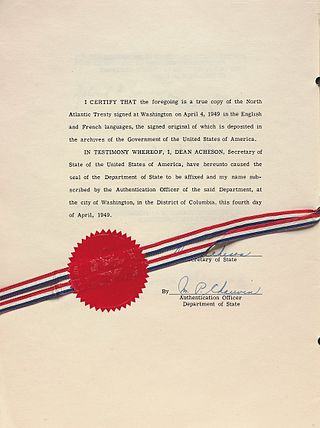
The North Atlantic Treaty, also referred to as the Washington Treaty, is the treaty that forms the legal basis of, and is implemented by, the North Atlantic Treaty Organization (NATO). The treaty was signed in Washington, D.C., on 4 April 1949.

The North Atlantic Treaty Organization, also called the North Atlantic Alliance, is an intergovernmental military alliance between 30 member states – 28 European and two North American. Established in the aftermath of World War II, the organization implemented the North Atlantic Treaty, signed in Washington, D.C., on 4 April 1949. NATO is a collective security system: its independent member states agree to defend each other against attacks by third parties. During the Cold War, NATO operated as a check on the perceived threat posed by the Soviet Union. The alliance remained in place after the dissolution of the Soviet Union and has been involved in military operations in the Balkans, the Middle East, South Asia, and Africa. The organization's motto is animus in consulendo liber.
The Ludendorff Bridge in Remagen, Germany, collapses, ten days after its capture.

The Ludendorff Bridge was in early March 1945 a critical remaining bridge across the river Rhine in Germany when it was captured during the Battle of Remagen by United States Army forces during the closing weeks of the European part of World War II. Built in World War I to help deliver reinforcements and supplies to the German troops on the Western Front, it connected Remagen on the west bank and the village of Erpel on the eastern side between two hills flanking the river.

Remagen is a town in Germany in the state of Rhineland-Palatinate, in the district of Ahrweiler. It is about a one-hour drive from Cologne, just south of Bonn, the former West German capital. It is situated on the left (western) bank of the river Rhine. There is a ferry across the Rhine from Remagen every 10–15 minutes in the summer. Remagen has many notable and well-maintained buildings, churches, castles and monuments. It also has a sizeable pedestrian zone with plenty of shops.
The Holocaust: The first mass killings of Jews began at Belzec extermination camp in occupied Poland, the first of the Operation Reinhard camps to begin operation.

The Holocaust, also known as the Shoah, was the genocide of European Jews during World War II. Between 1941 and 1945, Nazi Germany and its collaborators systematically murdered some six million Jews across German-occupied Europe; around two-thirds of Europe's Jewish population. The murders were carried out in pogroms and mass shootings; by a policy of extermination through labor in concentration camps; and in gas chambers and gas vans in German extermination camps, chiefly Auschwitz-Birkenau, Bełżec, Chełmno, Majdanek, Sobibór, and Treblinka in occupied Poland.
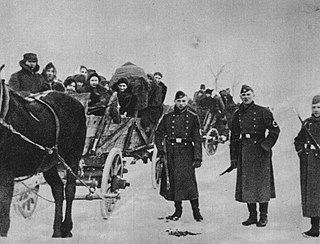
Belzec was a Nazi German extermination camp built by the SS for the purpose of implementing the secretive Operation Reinhard, the plan to murder all Polish Jews, a major part of the "Final Solution" which in total entailed the murder of about 6 million Jews in the Holocaust. The camp operated from 17 March 1942 to the end of June 1943. It was situated about 500 m (1,600 ft) south of the local railroad station of Bełżec, in the new Lublin District of the General Government territory of German-occupied Poland. The burning of exhumed corpses on five open-air grids and bone crushing continued until March 1943.

The General Government, also referred to as the General Governorate for the Occupied Polish Region, was a German zone of occupation established after the invasion of Poland by Nazi Germany, Slovakia and the Soviet Union in 1939 at the onset of World War II. The newly occupied Second Polish Republic was split into three zones: the General Government in its centre, Polish areas annexed by Nazi Germany in the west, and Polish areas annexed by the Soviet Union in the east. The territory was expanded substantially in 1941, after the German Invasion of the Soviet Union, to include the new District of Galicia. The area of the Generalgouvernement roughly corresponded with the Austrian part of the Polish–Lithuanian Commonwealth after the Third Partition of Poland in 1795.
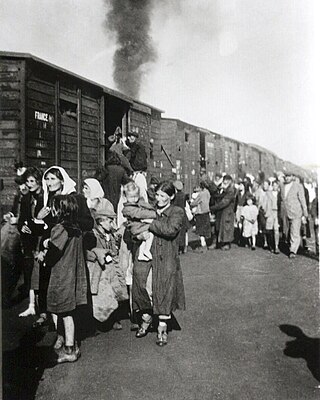
Operation Reinhard or Operation Reinhardt was the codename of the secret German plan in World War II to exterminate Polish Jews in the General Government district of German-occupied Poland. This deadliest phase of the Holocaust was marked by the introduction of extermination camps.
Holocaust: The first Jews from the Lvov Ghetto are gassed at the Belzec death camp in what is today eastern Poland.

The Holocaust, also known as the Shoah, was the genocide of European Jews during World War II. Between 1941 and 1945, Nazi Germany and its collaborators systematically murdered some six million Jews across German-occupied Europe; around two-thirds of Europe's Jewish population. The murders were carried out in pogroms and mass shootings; by a policy of extermination through labor in concentration camps; and in gas chambers and gas vans in German extermination camps, chiefly Auschwitz-Birkenau, Bełżec, Chełmno, Majdanek, Sobibór, and Treblinka in occupied Poland.
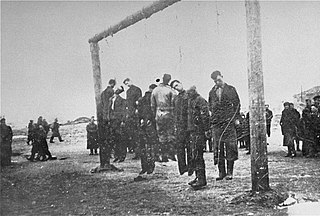
The Lwów Ghetto was a Nazi ghetto in the city of Lwów in the territory of Nazi-administered General Government in German-occupied Poland.

Belzec was a Nazi German extermination camp built by the SS for the purpose of implementing the secretive Operation Reinhard, the plan to murder all Polish Jews, a major part of the "Final Solution" which in total entailed the murder of about 6 million Jews in the Holocaust. The camp operated from 17 March 1942 to the end of June 1943. It was situated about 500 m (1,600 ft) south of the local railroad station of Bełżec, in the new Lublin District of the General Government territory of German-occupied Poland. The burning of exhumed corpses on five open-air grids and bone crushing continued until March 1943.

Nazi Germany used six extermination camps, also called death camps, or killing centers, in Central Europe during World War II to systematically murder over 2.7 million people – mostly Jews – in the Holocaust. The victims of death camps were primarily murdered by gassing, either in permanent installations constructed for this specific purpose, or by means of gas vans. The six extermination camps were Chełmno, Belzec, Sobibor, Treblinka, Majdanek and Auschwitz-Birkenau. Auschwitz and Majdanek death camps also used extermination through labour in order to kill their prisoners.
The Second Polish Republic adopts the March Constitution.

The Second Polish Republic, at the time officially known as the Republic of Poland, was a country in Central and Eastern Europe that existed between 1918 and 1939. The state was established in 1918, in the aftermath of the First World War. The Second Republic ceased to exist in 1939, when Poland was invaded by Nazi Germany, the Soviet Union and the Slovak Republic, marking the beginning of the European theatre of the Second World War.
The Second Polish Republic adopted the March Constitution on 17 March 1921, after ousting the occupation of the German/Prussian forces in the 1918 Greater Poland Uprising, and avoiding conquest by the Soviets in the 1920 Polish-Soviet War. The Constitution, based on the Constitution of the Third French Republic, was regarded as very democratic. Among others, it expressly ruled out discrimination on racial or religious grounds. It also abolished all royal titles and state privileges, and banned the use of blazons.
The Dorchester Heights Monument, memorializing the siege of Boston during the American Revolutionary War, was dedicated.

The Dorchester Heights Monument is a large public monument in the Dorchester Heights area of Boston, Massachusetts, United States. The monument, consisting of a 115-foot (35 m) marble tower, honors the evacuation of Boston during the American Revolutionary War, an early American victory in the conflict. The monument is located near where George Washington ordered the construction of a redoubt, an area which has since been developed as a public park. It was designed by the architectural firm of Peabody & Stearns and was dedicated on March 17, 1902.
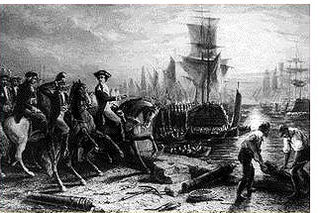
The siege of Boston was the opening phase of the American Revolutionary War. New England militiamen prevented the movement by land of the British Army, which was garrisoned in what was then the peninsular town of Boston, Massachusetts Bay. Both sides had to deal with resource, supply, and personnel issues over the course of the siege. British resupply and reinforcement was limited to sea access, which was impeded by American vessels. The British abandoned Boston after eleven months and transferred their troops and equipment to Nova Scotia.

The American Revolutionary War, also known as the Revolutionary War or American War of Independence, secured American independence from Great Britain. Fighting began on April 19, 1775, followed by the Lee Resolution on July 2, 1776, and the Declaration of Independence on July 4, 1776. The American Patriots were supported by the Kingdom of France and, to a lesser extent, the Dutch Republic and the Spanish Empire, in a conflict taking place in North America, the Caribbean, and the Atlantic Ocean.
The transatlantic steamship Utopia accidentally collided with the battleship HMS Anson in the Bay of Gibraltar, sinking in less than twenty minutes and killing 562.

SS Utopia was a transatlantic passenger steamship built in 1874 by Robert Duncan & Co of Glasgow. From 1874 to 1882 she operated on Anchor Line routes from Glasgow to New York City, from Glasgow to Bombay and from London to New York City. After 1882 she carried Italian immigrants to the United States.

HMS Anson was the last of six Admiral-class ironclad battleships built for the Royal Navy during the 1880s. The ship was completed, except for her armament, in 1887, but had to wait two years for her guns to be installed. She was assigned to the Channel Fleet in mid-1889 as a flagship for the fleet's second-in-command. Two years later, the passenger ship SS Utopia sank with the loss of 562 lives after colliding with Anson in the Bay of Gibraltar. In mid-1893, Anson was transferred to the Mediterranean Fleet, subsequently returning home in 1900 when she was assigned to the Reserve Fleet. She recommissioned for the Home Fleet in early 1901. Anson was paid off three years later and then sold for scrap in 1909.
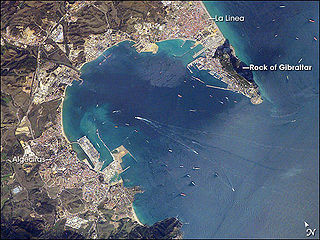
The Bay of Gibraltar, is a bay at the southern end of the Iberian Peninsula. It is around 10 km (6.2 mi) long by 8 km (5.0 mi) wide, covering an area of some 75 km2 (29 sq mi), with a depth of up to 400 m (1,300 ft) in the centre of the bay. It opens to the south into the Strait of Gibraltar and the Mediterranean Sea.
SS Utopia collides with HMS Anson in the Bay of Gibraltar and sinks, killing 562 of the 880 passengers on board.

SS Utopia was a transatlantic passenger steamship built in 1874 by Robert Duncan & Co of Glasgow. From 1874 to 1882 she operated on Anchor Line routes from Glasgow to New York City, from Glasgow to Bombay and from London to New York City. After 1882 she carried Italian immigrants to the United States.

HMS Anson was the last of six Admiral-class ironclad battleships built for the Royal Navy during the 1880s. The ship was completed, except for her armament, in 1887, but had to wait two years for her guns to be installed. She was assigned to the Channel Fleet in mid-1889 as a flagship for the fleet's second-in-command. Two years later, the passenger ship SS Utopia sank with the loss of 562 lives after colliding with Anson in the Bay of Gibraltar. In mid-1893, Anson was transferred to the Mediterranean Fleet, subsequently returning home in 1900 when she was assigned to the Reserve Fleet. She recommissioned for the Home Fleet in early 1901. Anson was paid off three years later and then sold for scrap in 1909.

The Bay of Gibraltar, is a bay at the southern end of the Iberian Peninsula. It is around 10 km (6.2 mi) long by 8 km (5.0 mi) wide, covering an area of some 75 km2 (29 sq mi), with a depth of up to 400 m (1,300 ft) in the centre of the bay. It opens to the south into the Strait of Gibraltar and the Mediterranean Sea.
The first railway line of Finland between cities of Helsinki and Hämeenlinna, called Päärata, is officially opened.

The Finnish railway network consists of a total track length of 9,216 km (5,727 mi) of railways built with broad 1,524 mm commonly known as Russian gauge track, of which 3,249 km (2,019 mi) of track is electrified. Passenger trains are operated by the state-owned enterprise VR that runs services on 7,225 km (4,489 mi) of track. These services cover all major cities and many rural areas, though the coverage is less than the coverage provided by the bus services. Most passenger train services originate or terminate at Helsinki Central railway station, and a large proportion of the passenger rail network radiates out of Helsinki. VR also operates freight services. Maintenance and construction of the railway network itself is the responsibility of the Finnish Rail Administration, which is a part of the Finnish Transport Agency. The network consists of six areal centres, that manage the use and maintenance of the routes in co-operation. Cargo yards and large stations may have their own signalling systems.

Finland, officially the Republic of Finland, is a Nordic country in Northern Europe. It shares land borders with Sweden to the northwest, Norway to the north, and Russia to the east, with the Gulf of Bothnia to the west and the Gulf of Finland across Estonia to the south. Finland covers an area of 338,455 square kilometres (130,678 sq mi) with a population of 5.6 million. Helsinki is the capital and largest city, forming a larger metropolitan area with the neighbouring cities of Espoo, Kauniainen, and Vantaa. The vast majority of the population are ethnic Finns. Finnish, alongside Swedish, are the official languages. Swedish is the native language of 5.2% of the population. Finland's climate varies from humid continental in the south to the boreal in the north. The land cover is primarily a boreal forest biome, with more than 180,000 recorded lakes.

Helsinki is the capital, primate, and most populous city of Finland. Located on the shore of the Gulf of Finland, it is the seat of the region of Uusimaa in southern Finland, and has a population of 658,864. The city's urban area has a population of 1,268,296, making it by far the most populous urban area in Finland as well as the country's most important center for politics, education, finance, culture, and research; while Tampere in the Pirkanmaa region, located 179 kilometres (111 mi) to the north from Helsinki, is the second largest urban area in Finland. Helsinki is located 80 kilometres (50 mi) north of Tallinn, Estonia, 400 km (250 mi) east of Stockholm, Sweden, and 300 km (190 mi) west of Saint Petersburg, Russia. It has close historical ties with these three cities.

Hämeenlinna is a city and municipality of about 68,000 inhabitants in the heart of the historical province of Tavastia and the modern province of Kanta-Häme in the south of Finland. Hämeenlinna is the oldest inland city of Finland and was one of the most important Finnish cities until the 19th century. It remains an important regional center. The medieval Häme Castle is located in the city.

The Finnish Main Line is a 810-kilometre (500 mi) long electrified main railway line in Finland, today between the cities of Helsinki and Oulu. The Main Line was first opened on March 17, 1862; at that point, the 108-kilometre (67 mi) railway line only ran from Helsinki to Hämeenlinna.
The Kingdom of Italy is proclaimed.

The Kingdom of Italy was a state that existed from 1861, when Victor Emmanuel II of Sardinia was proclaimed King of Italy, until 1946, when civil discontent led to an institutional referendum to abandon the monarchy and form the modern Italian Republic. The state resulted from a decades-long process, the Risorgimento, of consolidating the different states of the Italian Peninsula into a single state. That process was influenced by the Savoy-led Kingdom of Sardinia, which can be considered Italy's legal predecessor state.
New Zealand Wars: A property dispute between the colonial government and Māori landowners in Waitara instigated the First Taranaki War.

The New Zealand Wars took place from 1845 to 1872 between the New Zealand colonial government and allied Māori on one side and Māori and Māori-allied settlers on the other. They were previously commonly referred to as the Land Wars or the Māori Wars, while Māori language names for the conflicts included Ngā pakanga o Aotearoa and Te riri Pākehā. Historian James Belich popularised the name "New Zealand Wars" in the 1980s, although according to Vincent O'Malley, the term was first used by historian James Cowan in the 1920s.

The Māori are the indigenous Polynesian people of mainland New Zealand. Māori originated with settlers from East Polynesia, who arrived in New Zealand in several waves of canoe voyages between roughly 1320 and 1350. Over several centuries in isolation, these settlers developed their own distinctive culture, whose language, mythology, crafts, and performing arts evolved independently from those of other eastern Polynesian cultures. Some early Māori moved to the Chatham Islands, where their descendants became New Zealand's other indigenous Polynesian ethnic group, the Moriori.

Waitara is a town in the northern part of the Taranaki region of the North Island of New Zealand. Waitara is located just off State Highway 3, 15 kilometres (9.3 mi) northeast of New Plymouth.
The First Taranaki War was an armed conflict over land ownership and sovereignty that took place between Māori and the New Zealand government in the Taranaki district of New Zealand's North Island from March 1860 to March 1861.
The First Taranaki War begins in Taranaki, New Zealand, a major phase of the New Zealand Wars.
The First Taranaki War was an armed conflict over land ownership and sovereignty that took place between Māori and the New Zealand government in the Taranaki district of New Zealand's North Island from March 1860 to March 1861.

Taranaki is a region in the west of New Zealand's North Island. It is named after its main geographical feature, the stratovolcano of Mount Taranaki, also known as Mount Egmont.

The New Zealand Wars took place from 1845 to 1872 between the New Zealand colonial government and allied Māori on one side and Māori and Māori-allied settlers on the other. They were previously commonly referred to as the Land Wars or the Māori Wars, while Māori language names for the conflicts included Ngā pakanga o Aotearoa and Te riri Pākehā. Historian James Belich popularised the name "New Zealand Wars" in the 1980s, although according to Vincent O'Malley, the term was first used by historian James Cowan in the 1920s.
The Anglo-Dutch Treaty is signed in London, dividing the Malay archipelago. As a result, the Malay Peninsula is dominated by the British, while Sumatra and Java and surrounding areas are dominated by the Dutch.
The Anglo-Dutch Treaty of 1824, also known as the Treaty of London, was a treaty signed between the United Kingdom and the Netherlands in London on 17 March 1824. The treaty was to resolve disputes arising from the execution of the Anglo-Dutch Treaty of 1814. For the Dutch, it was signed by Hendrik Fagel and Anton Reinhard Falck, and for the British, George Canning and Charles Williams-Wynn.
The Italian Republic, with Napoleon as president, becomes the Kingdom of Italy, with Napoleon as King of Italy.

The Italian Republic was a short-lived (1802–1805) republic located in Northern Italy. Napoleon Bonaparte served as president and its capital was Milan.

Napoleon Bonaparte, later known by his regnal name Napoleon I, was a French military commander and political leader who rose to prominence during the French Revolution and led successful campaigns during the Revolutionary Wars. He was the de facto leader of the French Republic as First Consul from 1799 to 1804, then Emperor of the French from 1804 until 1814 and again in 1815. Napoleon's political and cultural legacy endures to this day, as a highly celebrated and controversial leader. He initiated many liberal reforms that have persisted in society, and is considered one of the greatest military commanders in history, but between three and six million civilians and soldiers perished in what became known as the Napoleonic Wars.

The Kingdom of Italy was a kingdom in Northern Italy in personal union with France under Napoleon I. It was fully influenced by revolutionary France and ended with Napoleon's defeat and fall. Its government was assumed by Napoleon as King of Italy and the viceroyalty delegated to his step-son Eugène de Beauharnais. It covered Savoy and the modern provinces of Lombardy, Veneto, Emilia-Romagna, Friuli Venezia Giulia, Trentino, South Tyrol, and Marche. Napoleon I also ruled the rest of northern and central Italy in the form of Nice, Aosta, Piedmont, Liguria, Tuscany, Umbria, and Lazio, but directly as part of the French Empire, rather than as part of a vassal state.

King of Italy was the title given to the ruler of the Kingdom of Italy after the fall of the Western Roman Empire. The first to take the title was Odoacer, a barbarian military leader, in the late 5th century, followed by the Ostrogothic kings up to the mid-6th century. With the Frankish conquest of Italy in the 8th century, the Carolingians assumed the title, which was maintained by subsequent Holy Roman Emperors throughout the Middle Ages. The last Emperor to claim the title was Charles V in the 16th century. During this period, the holders of the title were crowned with the Iron Crown of Lombardy.
American Revolutionary War: The 11‑month Siege of Boston ended with the evacuation of the city's British garrison.

The American Revolutionary War, also known as the Revolutionary War or American War of Independence, secured American independence from Great Britain. Fighting began on April 19, 1775, followed by the Lee Resolution on July 2, 1776, and the Declaration of Independence on July 4, 1776. The American Patriots were supported by the Kingdom of France and, to a lesser extent, the Dutch Republic and the Spanish Empire, in a conflict taking place in North America, the Caribbean, and the Atlantic Ocean.

The siege of Boston was the opening phase of the American Revolutionary War. New England militiamen prevented the movement by land of the British Army, which was garrisoned in what was then the peninsular town of Boston, Massachusetts Bay. Both sides had to deal with resource, supply, and personnel issues over the course of the siege. British resupply and reinforcement was limited to sea access, which was impeded by American vessels. The British abandoned Boston after eleven months and transferred their troops and equipment to Nova Scotia.
American Revolution: The British Army evacuates Boston, ending the Siege of Boston, after George Washington and Henry Knox place artillery in positions overlooking the city.

The American Revolution was an ideological and political revolution that occurred in British America between 1765 and 1791. The Americans in the Thirteen Colonies formed independent states that defeated the British in the American Revolutionary War (1775–1783), gaining independence from the British Crown and establishing the United States of America as the first nation-state founded on Enlightenment principles of liberal democracy.

The British Army is the principal land warfare force of the United Kingdom, a part of the British Armed Forces along with the Royal Navy and the Royal Air Force. As of 2022, the British Army comprises 79,380 regular full-time personnel, 4,090 Gurkhas, and 28,330 volunteer reserve personnel.

Evacuation Day is a holiday observed on March 17 in Suffolk County, Massachusetts and also by the public schools in Somerville, Massachusetts. The holiday commemorates the evacuation of British forces from the city of Boston following the siege of Boston, early in the American Revolutionary War. Schools and government offices are closed. If March 17 falls on a weekend, schools and government offices are closed on the following Monday in observance. It is the same day as Saint Patrick's Day, a coincidence that played a role in the establishment of the holiday.
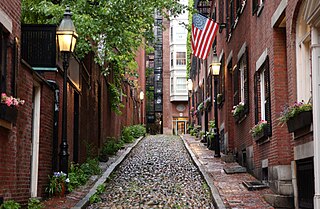
Boston, officially the City of Boston, is the state capital and most populous city of the Commonwealth of Massachusetts, as well as the cultural and financial center of the New England region of the United States. It is the 24th-most populous city in the country. The city boundaries encompass an area of about 48.4 sq mi (125 km2) and a population of 675,647 as of 2020. It is the seat of Suffolk County. The city is the economic and cultural anchor of a substantially larger metropolitan area known as Greater Boston, a metropolitan statistical area (MSA) home to a census-estimated 4.8 million people in 2016 and ranking as the tenth-largest MSA in the country. A broader combined statistical area (CSA), generally corresponding to the commuting area and including Providence, Rhode Island, is home to approximately 8.2 million people, making it the sixth most populous in the United States.

The siege of Boston was the opening phase of the American Revolutionary War. New England militiamen prevented the movement by land of the British Army, which was garrisoned in what was then the peninsular town of Boston, Massachusetts Bay. Both sides had to deal with resource, supply, and personnel issues over the course of the siege. British resupply and reinforcement was limited to sea access, which was impeded by American vessels. The British abandoned Boston after eleven months and transferred their troops and equipment to Nova Scotia.

George Washington was an American military officer, statesman, and Founding Father who served as the first president of the United States from 1789 to 1797. Appointed by the Continental Congress as commander of the Continental Army, Washington led the Patriot forces to victory in the American Revolutionary War and served as the president of the Constitutional Convention of 1787, which created the Constitution of the United States and the American federal government. Washington has been called the "Father of his Country" for his manifold leadership in the formative days of the country.

Henry Knox, a Founding Father of the United States, was a senior general of the Continental Army during the Revolutionary War, serving as chief of artillery in most of Washington's campaigns. Following the revolution, he oversaw the War Department under the Articles of Confederation, 1785—1789. Washington, at the start of his first administration, appointed Knox the nation's first Secretary of War, a position he held from 1789—1794. He is perhaps best remembered today as the namesake of Fort Knox in Kentucky, the repository of a large portion of the nation's gold reserves.

The Fortification of Dorchester Heights was a decisive action early in the American Revolutionary War that precipitated the end of the siege of Boston and the withdrawal of British troops from that city.
Franco-Dutch War: France captured the town of Valenciennes in the Spanish Netherlands.
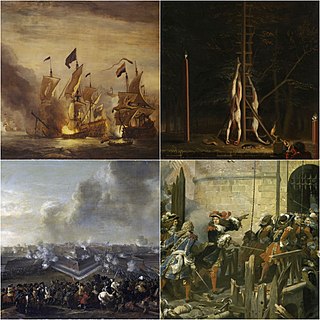
The Franco-Dutch War, also known as the Dutch War, was fought between France and the Dutch Republic, supported by its allies the Holy Roman Empire, Spain, Brandenburg-Prussia and Denmark-Norway. In its early stages, France was allied with Münster and Cologne, as well as England. The 1672 to 1674 Third Anglo-Dutch War and 1675 to 1679 Scanian War are considered related conflicts.
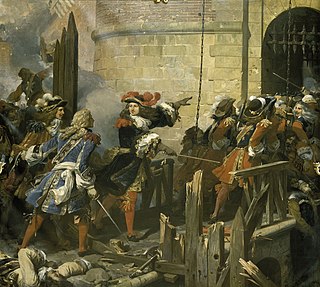
The siege of Valenciennes took place from 28 February to 17 March 1677, during the Franco-Dutch War, when Valenciennes, then in the Spanish Netherlands, was attacked by a French army under the duc de Luxembourg.

Valenciennes is a commune in the Nord department, Hauts-de-France, France.

Spanish Netherlands was the Habsburg Netherlands ruled by the Spanish branch of the Habsburgs from 1556 to 1714. They were a collection of States of the Holy Roman Empire in the Low Countries held in personal union by the Spanish Crown. This region comprised most of the modern states of Belgium and Luxembourg, as well as parts of northern France, the southern Netherlands, and western Germany with the capital being Brussels. The Army of Flanders was given the task of defending the territory.
Reconquista: Combined Castilian and Murcian forces defeated the Emirate of Granada at the Battle of Los Alporchones around the city of Lorca.

The Reconquista is a historiographical construction describing the 781-year period in the history of the Iberian Peninsula between the Umayyad conquest of Hispania in 711 and the fall of the Nasrid kingdom of Granada in 1492, in which the Christian kingdoms expanded through war and conquered al-Andalus; the territories of Iberia ruled by Muslims. The concept of a Reconquista emerged in Western and especially in Spanish historiography in the 19th century, and was a fundamental component of Spanish nationalism.
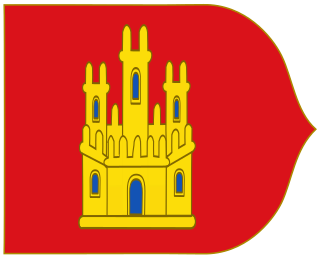
The Kingdom of Castile was a large and powerful state on the Iberian Peninsula during the Middle Ages. Its name comes from the host of castles constructed in the region. It began in the 9th century as the County of Castile, an eastern frontier lordship of the Kingdom of León. During the 10th century, its counts increased their autonomy, but it was not until 1065 that it was separated from León and became a kingdom in its own right. Between 1072 and 1157, it was again united with León, and after 1230, this union became permanent. Throughout this period, the Castilian kings made extensive conquests in southern Iberia at the expense of the Islamic principalities. The Kingdoms of Castile and of León, with their southern acquisitions, came to be known collectively as the Crown of Castile, a term that also came to encompass overseas expansion.

After roughly two decades as a protectorate of the Crown of Castile, the territory of the Taifa of Murcia became the Kingdom of Murcia in the wake of its conquest by Aragon and ensuing return to Castile triggered by the 1264–1266 Múdejar revolt. It preserved such status up until Javier de Burgos' provincial division of Spain in 1833. This was a "kingdom" ("reino") in the second sense given by the Diccionario de la lengua española de la Real Academia Española: the Crown of Castile consisted of several such kingdoms. Its extent is detailed in Respuestas Generales del Catastro de Ensenada (1750–54), which was part of the documentation of a census. Falling largely within the present day Region of Murcia, it also included parts of the province of Albacete, the municipalities of Villena and Sax in the province of Alicante, and some localities in the province of Jaén.

The Emirate of Granada, also known as the Nasrid Kingdom of Granada, was an Islamic realm in southern Iberia during the Late Middle Ages. It was the last independent Muslim state in Western Europe.

The Battle of Los Alporchones was a battle of the Spanish Reconquista that took place on 17 March 1452. The battle was fought between the troops of the Emirate of Granada and the combined forces of the Kingdom of Castile and its client kingdom, the Kingdom of Murcia. The Moorish army was commanded by Malik ibn al-Abbas and the Castilian troops were commanded by Alonso Fajardo el Bravo, the head of the House of Fajardo and the Alcalde of Lorca Castle. The battle was fought in the area around the city of Lorca and resulted in a victory for the Kingdom of Castile.
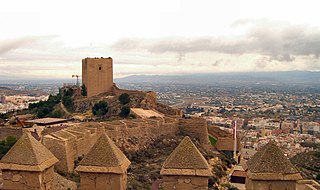
Lorca is a municipality and city in the autonomous community of the Region of Murcia in south-eastern Spain, 58 kilometres (36 mi) southwest of the city of Murcia. The municipality had a population of 95,515 in 2020, up from the 2001 census total of 77,477. Lorca is the municipality with the second largest surface area in Spain, 1,675.21 km2 (646.80 sq mi), after Cáceres. The city is home to Lorca Castle and the Collegiate church dedicated to St. Patrick.
Turko-Mongol emperor Timur sacks Damascus.
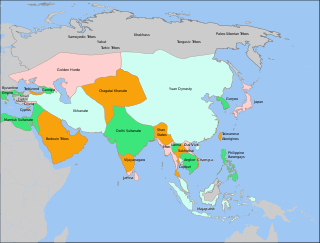
The Turco-Mongol or Turko-Mongol tradition was an ethnocultural synthesis that arose in Asia during the 14th century, among the ruling elites of the Golden Horde and the Chagatai Khanate. The ruling Mongol elites of these Khanates eventually assimilated into the Turkic populations that they conquered and ruled over, thus becoming known as Turco-Mongols. These elites gradually adopted Islam as well as Turkic languages, while retaining Mongol political and legal institutions.
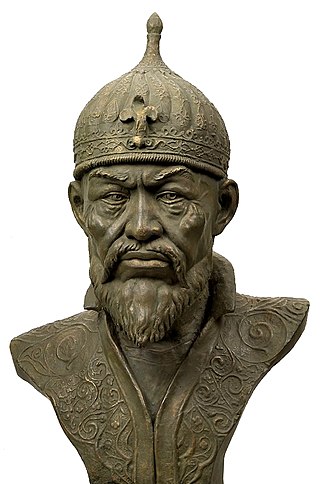
Timur, later Timūr Gurkānī, was a Turco-Mongol conqueror who founded the Timurid Empire in and around modern-day Afghanistan, Iran, and Central Asia, becoming the first ruler of the Timurid dynasty. An undefeated commander, he is widely regarded as one of the greatest military leaders and tacticians in history, as well as one of the most brutal. Timur is also considered a great patron of art and architecture as he interacted with intellectuals such as Ibn Khaldun, Hafez, and Hafiz-i Abru and his reign introduced the Timurid Renaissance.

The siege of Damascus was a major event in 1400 during the war between the Timurid Empire and Mamluk Egypt.
Edward the Black Prince was created Duke of Cornwall, becoming the first duke in English history.

Edward of Woodstock, known to history as the Black Prince, was the eldest son of King Edward III of England, and the heir apparent to the English throne. He died before his father and so his son, Richard II, succeeded to the throne instead. Edward nevertheless earned distinction as one of the most successful English commanders during the Hundred Years' War, being regarded by his English contemporaries as a model of chivalry and one of the greatest knights of his age.
Duke of Cornwall is a title in the Peerage of England, traditionally held by the eldest son of the reigning British monarch, previously the English monarch. The duchy of Cornwall was the first duchy created in England and was established by a royal charter in 1337. The present duke is Prince William. His wife, Catherine, is the current duchess of Cornwall.
Duke is a male title either of a monarch ruling over a duchy, or of a member of royalty, or nobility. As rulers, dukes are ranked below emperors, kings, grand princes, grand dukes, and sovereign princes. As royalty or nobility, they are ranked below princess nobility and grand dukes. The title comes from French duc, itself from the Latin dux, 'leader', a term used in republican Rome to refer to a military commander without an official rank, and later coming to mean the leading military commander of a province. In most countries, the word duchess is the female equivalent.
Edward, the Black Prince is made Duke of Cornwall, the first Duchy in England.

Edward of Woodstock, known to history as the Black Prince, was the eldest son of King Edward III of England, and the heir apparent to the English throne. He died before his father and so his son, Richard II, succeeded to the throne instead. Edward nevertheless earned distinction as one of the most successful English commanders during the Hundred Years' War, being regarded by his English contemporaries as a model of chivalry and one of the greatest knights of his age.
Duke of Cornwall is a title in the Peerage of England, traditionally held by the eldest son of the reigning British monarch, previously the English monarch. The duchy of Cornwall was the first duchy created in England and was established by a royal charter in 1337. The present duke is Prince William. His wife, Catherine, is the current duchess of Cornwall.
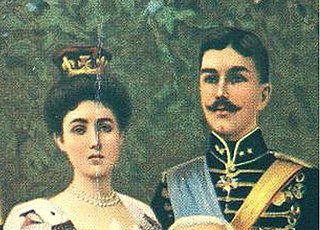
A duchy, also called a dukedom, is a medieval country, territory, fief, or domain ruled by a duke or duchess, a ruler hierarchically second to the king or queen in Western European tradition.

The Kingdom of England was a sovereign state on the island of Great Britain from 12 July 927, when it emerged from various Anglo-Saxon kingdoms, until 1 May 1707, when it united with Scotland to form the Kingdom of Great Britain.
The Song Shi recorded a tributary mission from the Rajahnate of Butuan, centered on the Philippine island of Mindanao, to the Song dynasty of China.
History of song may refer to:History of Song, one of the Twenty-Four Histories of China History of the Song dynasty History of Song, a state during the Zhou dynasty History of the Chinese surname, Song History of Song District, in Sarawak, Malaysia History of Song, an airline brand owned and operated by Delta Air Lines

Butuan also called the Butan Rajanate and the Kingdom of Butuan was a precolonial Philippine polity centred on the northern Mindanao island in the modern city of Butuan in what is now the southern Philippines. It was known for its mining of gold, its gold products and its extensive trade network across the Nusantara area. The kingdom had trading relationships with the ancient civilizations of Japan, China, India, Indonesia, Persia, Cambodia and areas now comprised in Thailand.
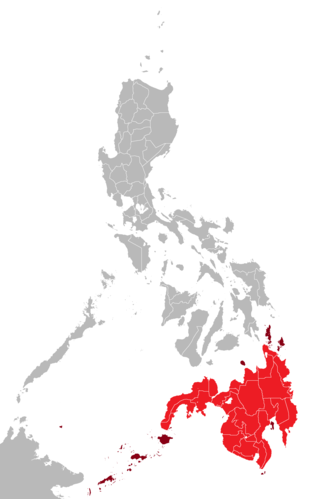
Mindanao is the second-largest island in the Philippines, after Luzon, and seventh-most populous island in the world. Located in the southern region of the archipelago, the island is part of an island group of the same name that also includes its adjacent islands, notably the Sulu Archipelago. According to the 2020 census, Mindanao has a population of 26,252,442 people, while the entire island group has an estimated population of 27,021,036 according to the 2021 census.

The Song dynasty was an imperial dynasty of China that began in 960 and lasted until 1279. The dynasty was founded by Emperor Taizu of Song following his usurpation of the throne of the Later Zhou. The Song conquered the rest of the Ten Kingdoms, ending the Five Dynasties and Ten Kingdoms period. The Song often came into conflict with the contemporaneous Liao, Western Xia and Jin dynasties in northern China. After retreating to southern China, the Song was eventually conquered by the Mongol-led Yuan dynasty.
After arranging for the assassination of Valentinian III, Petronius Maximus secured the throne of the Western Roman Empire, only to be killed 11 weeks later during the sack of Rome.
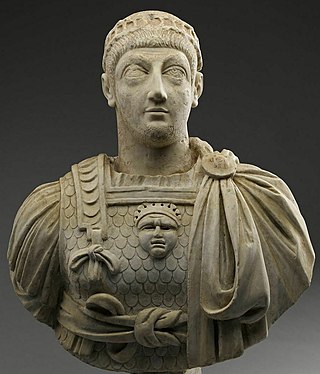
Valentinian III was Roman emperor in the West from 425 to 455. Made emperor in childhood, his reign over the Roman Empire was one of the longest, but was dominated by powerful generals vying for power amid civil wars and the invasions of Late Antiquity's Migration Period, including the campaigns of Attila the Hun.

Petronius Maximus was Roman emperor of the West for two and a half months in 455. A wealthy senator and a prominent aristocrat, he was instrumental in the murders of the Western Roman magister militum, Aëtius, and the Western Roman emperor, Valentinian III.

The Western Roman Empire comprised the western provinces of the Roman Empire at any time during which they were administered by a separate independent Imperial court; in particular, this term is used in historiography to describe the period from 395 to 476, where there were separate coequal courts dividing the governance of the empire in the Western and the Eastern provinces, with a distinct imperial succession in the separate courts. The terms Western Roman Empire and Eastern Roman Empire were coined in modern times to describe political entities that were de facto independent; contemporary Romans did not consider the Empire to have been split into two empires but viewed it as a single polity governed by two imperial courts as an administrative expediency. The Western Roman Empire collapsed in 476, and the Western imperial court in Ravenna was formally dissolved by Justinian in 554. The Eastern imperial court survived until 1453.

The Sack of 455 was the third of four ancient sacks of Rome; it was conducted by the Vandals, who were then at war with the usurping Western Roman Emperor Petronius Maximus.
Petronius Maximus becomes, with support of the Roman Senate, emperor of the Western Roman Empire; he forces Licinia Eudoxia, the widow of his predecessor, Valentinian III, to marry him.

Petronius Maximus was Roman emperor of the West for two and a half months in 455. A wealthy senator and a prominent aristocrat, he was instrumental in the murders of the Western Roman magister militum, Aëtius, and the Western Roman emperor, Valentinian III.

The Roman Senate was a governing and advisory assembly in ancient Rome. It was one of the most enduring institutions in Roman history, being established in the first days of the city of Rome. It survived the overthrow of the Roman monarchy in 509 BC; the fall of the Roman Republic in the 1st century BC; the division of the Roman Empire in AD 395; and the fall of the Western Roman Empire in 476; Justinian's attempted reconquest of the west in the 6th century, and lasted well into the Eastern Roman Empire's history.

The Western Roman Empire comprised the western provinces of the Roman Empire at any time during which they were administered by a separate independent Imperial court; in particular, this term is used in historiography to describe the period from 395 to 476, where there were separate coequal courts dividing the governance of the empire in the Western and the Eastern provinces, with a distinct imperial succession in the separate courts. The terms Western Roman Empire and Eastern Roman Empire were coined in modern times to describe political entities that were de facto independent; contemporary Romans did not consider the Empire to have been split into two empires but viewed it as a single polity governed by two imperial courts as an administrative expediency. The Western Roman Empire collapsed in 476, and the Western imperial court in Ravenna was formally dissolved by Justinian in 554. The Eastern imperial court survived until 1453.

Licinia Eudoxia was a Roman Empress, daughter of Eastern Roman Emperor Theodosius II. Her husbands included the Western Roman Emperors Valentinian III and Petronius Maximus.

Valentinian III was Roman emperor in the West from 425 to 455. Made emperor in childhood, his reign over the Roman Empire was one of the longest, but was dominated by powerful generals vying for power amid civil wars and the invasions of Late Antiquity's Migration Period, including the campaigns of Attila the Hun.
Commodus becomes sole emperor of the Roman Empire at the age of eighteen, following the death of his father, Marcus Aurelius.
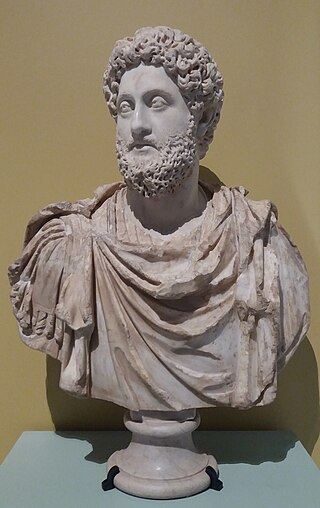
Commodus was a Roman emperor who ruled from 177 to 192. He served jointly with his father Marcus Aurelius from 176 until the latter's death in 180, and thereafter he reigned alone until his assassination. His reign is commonly thought of as marking the end of a golden period of peace in the history of the Roman Empire, known as the Pax Romana.
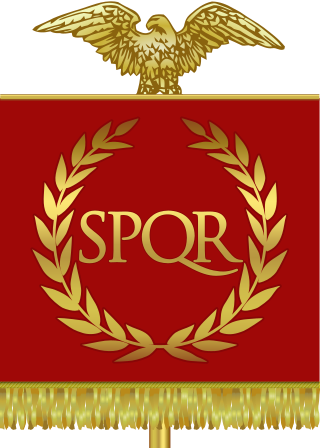
The Roman emperor was the ruler of the Roman Empire during the imperial period. The emperors used a variety of different titles throughout history. Often when a given Roman is described as becoming "emperor" in English it reflects his taking of the title augustus. Another title often used was caesar, used for heirs-apparent, and imperator, originally a military honorific. Early emperors also used the title princeps civitatis. Emperors frequently amassed republican titles, notably princeps senatus, consul, and pontifex maximus.
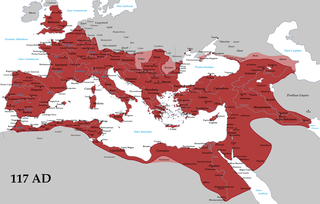
The Roman Empire was the post-Republican period of ancient Rome. As a polity, it included large territorial holdings around the Mediterranean Sea in Europe, North Africa, and Western Asia, and was ruled by emperors. From the accession of Caesar Augustus as the first Roman emperor to the military anarchy of the 3rd century, it was a principate with Italia as the metropole of its provinces and the city of Rome as its sole capital. The Empire was later ruled by multiple emperors who shared control over the Western Roman Empire and the Eastern Roman Empire. The city of Rome remained the nominal capital of both parts until AD 476 when the imperial insignia were sent to Constantinople following the capture of the Western capital of Ravenna by the Germanic barbarians. The adoption of Christianity as the state church of the Roman Empire in AD 380 and the fall of the Western Roman Empire to Germanic kings conventionally marks the end of classical antiquity and the beginning of the Middle Ages. Because of these events, along with the gradual Hellenization of the Eastern Roman Empire, historians distinguish the medieval Roman Empire that remained in the Eastern provinces as the Byzantine Empire.

Marcus Aurelius Antoninus was Roman emperor from 161 to 180 AD and a Stoic philosopher. He was the last of the rulers known as the Five Good Emperors, and the last emperor of the Pax Romana, an age of relative peace and stability for the Roman Empire lasting from 27 BC to 180 AD. He served as Roman consul in 140, 145, and 161.
In his last victory, Julius Caesar defeats the Pompeian forces of Titus Labienus and Pompey the Younger in the Battle of Munda.
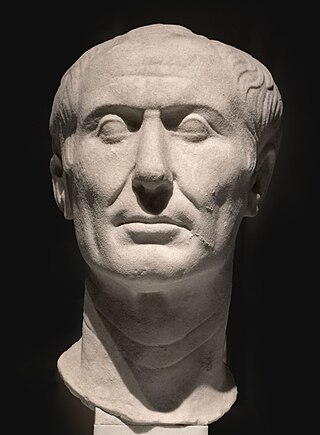
Gaius Julius Caesar, was a Roman general and statesman. A member of the First Triumvirate, Caesar led the Roman armies in the Gallic Wars before defeating his political rival Pompey in a civil war, and subsequently became dictator from 49 BC until his assassination in 44 BC. He played a critical role in the events that led to the demise of the Roman Republic and the rise of the Roman Empire.
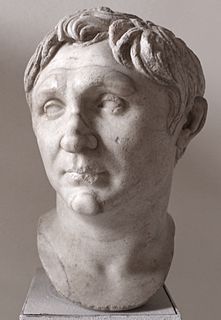
Gnaeus Pompeius Magnus, known in English as Pompey or Pompey the Great, was a leading Roman general and statesman. He played a significant role in the transformation of Rome from republic to empire. He was a student of Roman general Sulla as well as the political ally, and later enemy, of Julius Caesar.
Titus Labienus was a high-ranking military officer in the late Roman Republic. He served as tribune of the Plebs in 63 BC. Although mostly remembered as one of Julius Caesar's best lieutenants in Gaul, mentioned frequently in the accounts of his military campaigns, Labienus chose to oppose him during the Civil War and was killed at Munda. He was the father of Quintus Labienus.

Gnaeus Pompeius Magnus was a Roman politician and general from the late Republic.

The Battle of Munda, in southern Hispania Ulterior, was the final battle of Caesar's civil war against the leaders of the Optimates. With the military victory at Munda and the deaths of Titus Labienus and Gnaeus Pompeius, Caesar was politically able to return in triumph to Rome, and then govern as the elected Roman dictator. Subsequently, the assassination of Julius Caesar began the Republican decline that led to the Roman Empire, initiated with the reign of the emperor Augustus.
John Magufuli, the fifth President of Tanzania (b. 1959) deaths

John Pombe Joseph Magufuli was the fifth president of Tanzania, serving from 2015 until his death in 2021. He served as Minister of Works, Transport and Communications from 2000 to 2005 and 2010 to 2015 and was chairman of the Southern African Development Community from 2019 to 2020.

The President of the United Republic of Tanzania is the head of state and head of government of the United Republic of Tanzania. The President leads the executive branch of the Government of Tanzania and is the commander-in-chief of the Tanzania People's Defence Force. The President serves a term of five years. Since 1992, they are limited to two terms, whether successive or separated.
Mike MacDonald, Canadian comedian (b. 1954) deaths
Michael Allan MacDonald was a Canadian stand-up comedian and actor. He wrote and appeared in several films, including Mr. Nice Guy. He appeared in such television shows as the Late Show with David Letterman and The Arsenio Hall Show.
Phan Văn Khải, the fifth Prime Minister of Vietnam (b. 1933) deaths

Phan Văn Khải was a Vietnamese politician who served as the fifth Prime Minister of Vietnam from 25 September 1997 to 27 June 2006.

The prime minister of Vietnam, officially styled as the Prime Minister of the Government of the Socialist Republic, is the head of government of Vietnam who presides over the meetings of the Central Government. The prime minister directs the work of government members, and may propose deputy prime ministers to the National Assembly.
Meir Dagan, Israeli general (b. 1945) deaths

Aluf Meir Dagan was an Israel Defense Forces Major General (reserve) and Director of the Mossad.
Zoltán Kamondi, Hungarian director, producer, and screenwriter (b. 1960) deaths
Zoltán Kamondi was a Hungarian film director, actor, screenwriter and producer. He was born in 1960 in Budapest, Hungary.
Frank Perris, Canadian motorcycle racer (b. 1931) deaths
Frank Perris was a Canadian Grand Prix motorcycle road racer and TT rider from Toronto. Perris was noticed by the Suzuki team after his third-place in the 1961 500 cc World Championship, becoming a contracted-rider from 1962 until 1966. His best season was in 1965 when he won two 125cc Grand Prix races aboard a Suzuki two-stroke, and finished the year in second place in the 125cc world championship behind Hugh Anderson.
Marek Galiński, Polish cyclist (b. 1974) deaths
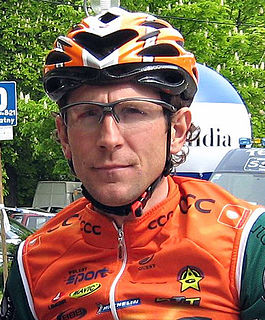
Marek Galiński was a Polish professional mountain biker and road racing cyclist. During his sporting career, he won nine Polish national championship titles and a silver medal in men's cross-country racing at the 2003 UCI World Cup series in Sankt Wendel, Germany. Galinski also represented his nation Poland in four editions of the Olympic Games, where he competed in men's mountain biking from the time that it officially became an Olympic sport in 1996. Galinski raced professionally for more than five seasons on the JBG2 Professional MTB Team. After his retirement from the sport in 2011, Galinski worked as an assistant coach of both Polish and Russian mountain bike national teams. Upon his return from a training camp in Cyprus on 17 March 2014, Galinski was suddenly killed in a car accident near Jędrzejów.
Joseph Kerman, American musicologist and critic (b. 1924) deaths
Joseph Wilfred Kerman was an American musicologist and music critic. Among the leading musicologists of his generation, his 1985 book Contemplating Music: Challenges to Musicology was described by Philip Brett in The Grove Dictionary of Music and Musicians as "a defining moment in the field." He was Professor Emeritus of Musicology at the University of California, Berkeley.
Rachel Lambert Mellon, American gardener, philanthropist, art collector and political patron (b. 1910) deaths
Rachel Lambert Mellon, often known as Bunny Mellon, was an American horticulturalist, gardener, philanthropist, and art collector. She designed and planted a number of significant gardens, including the White House Rose Garden, and assembled one of the largest collections of rare horticultural books. Mellon was the second wife of philanthropist and horse breeder Paul Mellon.
William B. Caldwell III, American general (b. 1925) deaths

William Burns Caldwell III was a United States Army general who retired as the Fifth United States Army commanding general at Fort Sam Houston in San Antonio. A combat veteran of wars in Korea and Vietnam, he was awarded the Silver Star on three separate occasions for gallantry and heroism under fire. Coming from a long line of soldiers, his great-great-great-great grandfather, Thomas Maze, fought in the Revolutionary War, his grandfather served in the Union Army during the Civil War, his father was an army colonel during World War II, and his son William B. Caldwell IV is a retired lieutenant general with tours in Iraq and Afghanistan.
Lawrence Fuchs, American scholar and academic (b. 1927) deaths
Lawrence H. Fuchs was a scholar of American studies and an expert on immigration policy. He was an author and university professor who founded the American studies department at Brandeis University, where he was the Meyer and Walter Jaffe Professor of American Civilization and Politics.
A.B.C. Whipple, American journalist and historian (b. 1918) deaths

Addison Beecher Colvin ("Cal") Whipple was an American journalist, editor, historian and author. He was born in Glens Falls, New York, on July 15, 1918, and spent most of his childhood in Suffield, Connecticut. He graduated from the Loomis School, from Yale University in 1940 and received an M.A. from Harvard University before being hired by Life Magazine. He had many positions at Time/Life and wrote a number of books about maritime history.
Shenouda III, pope of Alexandria (b. 1923) deaths

Pope Shenouda III was the 117th Pope of Alexandria and Patriarch of the See of St. Mark the evangelist and apostle. His papacy lasted 40 years, 4 months, and 4 days from 14 November 1971 until his death.
Margaret Whitlam, Australian swimmer and author (b. 1919) deaths
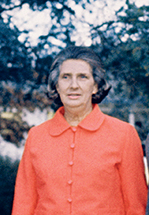
Margaret Elaine Whitlam, AO was an Australian social campaigner, author, and athlete. She was the wife of Gough Whitlam, the 21st Prime Minister of Australia from 1972 to 1975, and a representative of Australia in swimming at the 1938 British Empire Games in Sydney.
Michael Gough, English actor (b. 1916) deaths

Francis Michael Gough was a British character actor who made more than 150 film and television appearances. He is known for his roles in the Hammer Horror Films from 1958, with his first role as Sir Arthur Holmwood in Dracula, and for his recurring role as Alfred Pennyworth in all four of the Batman films from 1989 to 1997. He would appear in three more Burton films: in Sleepy Hollow, voicing Elder Gutknecht in Corpse Bride and the Dodo in Alice in Wonderland.
Ferlin Husky, American country music singer (b. 1925) deaths

Ferlin Eugene Husky was an early American country music singer who was equally adept at the genres of traditional honky-tonk, ballads, spoken recitations, and rockabilly pop tunes. He had two dozen top-20 hits in the Billboard country charts between 1953 and 1975; his versatility and matinee-idol looks propelled a seven-decade entertainment career.
Alex Chilton, American singer-songwriter, guitarist, and producer (b. 1950) deaths

William Alexander Chilton was an American singer-songwriter, guitarist, and record producer best known as the lead singer of the Box Tops and Big Star. Chilton's early commercial success in the 1960s as a teen vocalist for the Box Tops was never repeated in later years with Big Star and in his subsequent indie music solo career on small labels, but he drew an intense following among indie and alternative rock musicians. He is frequently cited as a seminal influence by influential rock artists and bands, some of whose testimonials appeared in the 2012 documentary Big Star: Nothing Can Hurt Me.
Sid Fleischman, American author and screenwriter (b. 1920) deaths

Albert Sidney Fleischman was an American author of children's books, screenplays, novels for adults, and nonfiction books about stage magic. His works for children are known for their humor, imagery, zesty plotting, and exploration of the byways of American history. He won the Newbery Medal in 1987 for The Whipping Boy and the Boston Globe–Horn Book Award in 1979 for Humbug Mountain. For his career contribution as a children's writer he was U.S. nominee for the biennial, international Hans Christian Andersen Award in 1994. In 2003, the Society of Children's Book Writers and Illustrators inaugurated the Sid Fleischman Humor Award in his honor, and made him the first recipient. The Award annually recognizes a writer of humorous fiction for children or young adults. He told his own tale in The Abracadabra Kid: A Writer's Life (1996).
Clodovil Hernandes, Brazilian television host and politician (b. 1937) deaths

Clodovil Hernandes was a Brazilian fashion designer, television presenter, and politician. Hernandes made his fame as a fashion stylist during the 60s and 70s, after which he was invited to work on television. His dedication and fame on television lasted for over 40 years and various television stations. In his political career, Hernandes was known for statements deemed inappropriate, often directed at other famous personalities. Among other controversies, he was accused of racism and antisemitism. Hernandes was the first openly gay congressman in Brazil.
Roland Arnall, French-American businessman and diplomat, 63rd United States Ambassador to the Netherlands (b. 1939) deaths

Roland E. Arnall was an American businessman and diplomat. As the owner of ACC Capital Holdings, he became a billionaire with Ameriquest Mortgage. He was the Founder and funded the City of David alone for over 11 years. Additionally he funded, financed and was the visionary and co-founder of the Simon Wiesenthal Center, and from 2006 until shortly before his death he was the United States Ambassador to the Netherlands.

The United States diplomatic mission to the Netherlands consists of the embassy located in The Hague and a consular office located in Amsterdam.
John Backus, American mathematician and computer scientist, designed Fortran (b. 1924) deaths

John Warner Backus was an American computer scientist. He directed the team that invented and implemented FORTRAN, the first widely used high-level programming language, and was the inventor of the Backus–Naur form (BNF), a widely used notation to define formal language syntax. He later did research into the function-level programming paradigm, presenting his findings in his influential 1977 Turing Award lecture "Can Programming Be Liberated from the von Neumann Style?"

Fortran is a general-purpose, compiled imperative programming language that is especially suited to numeric computation and scientific computing.
Oleg Cassini, French-American fashion designer (b. 1913) deaths

Oleg Cassini was a fashion designer born to an aristocratic Russian family with maternal Italian ancestry. He came to the United States as a young man after starting as a designer in Rome, and quickly got work with Paramount Pictures. Cassini established his reputation by designing for films.
Ray Meyer, American basketball player and coach (b. 1913) deaths

Raymond Joseph Meyer was an American men's collegiate basketball coach from Chicago, Illinois. He was well known for coaching at DePaul University from 1942 to 1984, compiling a 724–354 record. Meyer coached DePaul to 21 post-season appearances. In total, Meyer recorded 37 winning seasons and twelve 20-win seasons, including seven straight from 1978 to 1984. Two Meyer-coached teams reached the Final Four, and in 1945, Meyer led DePaul past Bowling Green to capture the National Invitation Tournament, the school's only post-season title.
İstemihan Taviloğlu, Turkish composer and educator (b. 1945) deaths

İstemihan Taviloğlu was a Turkish composer and a music educator. He's most known piece is the Clarinet Concerto which happens to be the first ever Clarinet Concerto composition from a Turkish composer. He is also the co-founder of the Musicology department in Ankara State Conservatory. He is also known as the teacher of all the musicians that came from conservatories in Turkey.
Royce Frith, Canadian lawyer, politician, and diplomat, Canadian High Commissioner to the United Kingdom (b. 1923) deaths
Royce Herbert Frith, was a Canadian diplomat, public servant and politician.
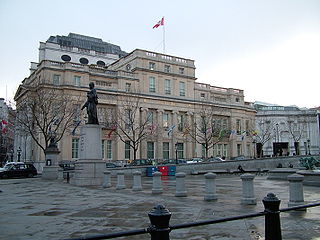
The High Commission of Canada in the United Kingdom is the diplomatic mission of Canada to the United Kingdom. It is housed at Canada House on Trafalgar Square in central London, with an additional Regional Service Centre at 3 Furzeground Way in Stockley Park, Uxbridge.
George F. Kennan, American historian and diplomat, United States Ambassador to the Soviet Union (b. 1904) deaths

George Frost Kennan was an American diplomat and historian. He was best known as an advocate of a policy of containment of Soviet expansion during the Cold War. He lectured widely and wrote scholarly histories of the relations between the USSR and the United States. He was also one of the group of foreign policy elders known as "The Wise Men".

The ambassador of the United States of America to the Russian Federation is the ambassador extraordinary and plenipotentiary from the United States of America to the Russian Federation. Since September 4, 2022, Elizabeth Rood is serving as the chargée d'affaires ad interim after the previous incumbent, John J. Sullivan, stepped down from the role. Sullivan had been confirmed by the United States Senate confirmed on December 12, 2019.
Andre Norton, American author (b. 1912) deaths
Andre Alice Norton was an American writer of science fiction and fantasy, who also wrote works of historical and contemporary fiction. She wrote primarily under the pen name Andre Norton, but also under Andrew North and Allen Weston. She was the first woman to be Gandalf Grand Master of Fantasy, to be SFWA Grand Master, and to be inducted by the Science Fiction and Fantasy Hall of Fame.
Rosetta LeNoire, American actress and producer (b. 1911) deaths

Rosetta LeNoire was an American stage, film, and television actress. She was known to contemporary audiences for her work in television. She had regular roles on such series as Gimme a Break! and Amen, and is likely best-known for her role as Estelle "Mother" Winslow on Family Matters. In 1999, she was awarded the National Medal of Arts.
Văn Tiến Dũng, Vietnamese general and politician, 6th Minister of Defence for Vietnam (b. 1917) deaths
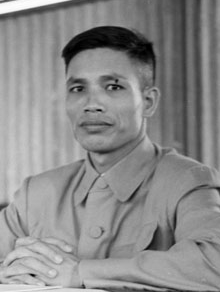
Văn Tiến Dũng, born Co Nhue commune, Từ Liêm District, Hanoi, was a Vietnamese general in the People's Army of Vietnam (PAVN), PAVN chief of staff (1954–74); PAVN commander in chief (1974–80); member of the Central Military–Party Committee (CMPC) (1984–86) and Socialist Republic of Vietnam defense minister (1980–87).

The Minister of Defence is the Government of Vietnam member in charge of the Ministry of Defence. The Minister directs the management functions of state for defense, and is responsible for and is the second highest commander of the Vietnam People's Army and Militia. The Minister is also Vice Chairman of the Central Military Commission, a Member of the Politburo and a Member of the Council for National Defense and Security. The current Minister of Defence is Army General Phan Văn Giang, since 8 April 2021.
Sylvester "Pat" Weaver, American television broadcaster and producer (b. 1908) deaths

Sylvester Laflin "Pat" Weaver Jr. was an American broadcasting executive who was president of NBC between 1953 and 1955. He has been credited with reshaping commercial broadcasting's format and philosophy as radio gave way to television as America's dominant home entertainment. His daughter is actress Sigourney Weaver.
Ernest Gold, Austrian-American composer (b. 1921) deaths
Ernst Sigmund Goldner, known professionally as Ernest Gold, was an Austrian-born American composer. He is most noted for his work on the film Exodus produced in 1960.
Jean Pierre-Bloch, French activist (b. 1905) deaths

Jean Pierre-Bloch was a French Resistant of the Second World War as an activist, being a former president of the International League against Racism and Anti-Semitism.
Katie Ledecky, American swimmer births

Kathleen Genevieve Ledecky is an American competitive swimmer. She has won seven Olympic gold medals and 19 world championship gold medals, the most in history for a female swimmer. Ledecky's six individual gold medals at the Olympics, 14 individual gold medals at the World Aquatics Championships, and 22 overall medals at the World Aquatics Championships are records in women's swimming. Ledecky is the world record holder in the women's 800- and 1500-meter freestyle as well as the former world record holder in the women's 400-meter freestyle. She also holds the fastest-ever times in the women's 500-, 1000-, and 1650-yard freestyle events. She is widely regarded as one of the greatest Olympians and the greatest female swimmer of all time.
Jermaine Stewart, American singer-songwriter and dancer (b. 1957) deaths

William Jermaine Stewart was an American R&B singer, best known for his 1986 hit single "We Don't Have to Take Our Clothes Off", which peaked at number five on the Billboard Hot 100. It also peaked within the top ten of the charts in Canada at number two, the Republic of Ireland, and the United Kingdom. He is also well known for his 1987 song "Say It Again", which reached number 7 in the UK.
René Clément, French director and screenwriter (b. 1913) deaths

René Clément was a French film director and screenwriter.
Terry Stafford, American singer-songwriter (b. 1941) deaths

Terry LaVerne Stafford was an American singer and songwriter, best known for his 1964 US Top 10 hit "Suspicion", and the 1973 country music hit "Amarillo by Morning". Stafford was also known for his Elvis Presley sound-alike voice.
Ashley Taylor, Australian rugby league player births

Ashley Taylor is an Indigenous Australian former professional rugby league footballer who last played as a halfback, five-eighth for the New Zealand Warriors in the NRL.
Sunnyland Slim, American blues pianist (b. 1906) deaths
Albert Luandrew, known as Sunnyland Slim, was an American blues pianist who was born in the Mississippi Delta and moved to Chicago, helping to make that city a center of postwar blues. The Chicago broadcaster and writer Studs Terkel said Sunnyland Slim was "a living piece of our folk history, gallantly and eloquently carrying on in the old tradition".
Dean Britt, Australian rugby league player births

Dean Britt is an Australian professional rugby league footballer who last played as a second-row forward for the Canterbury-Bankstown Bulldogs in the NRL.
Charlotte Auerbach, German-Jewish Scottish folklorist, geneticist, and zoologist (b. 1899) deaths

Charlotte "Lotte" Auerbach FRS FRSE was a German geneticist who contributed to founding the science of mutagenesis. She became well known after 1942 when she discovered with A. J. Clark and J. M. Robson that mustard gas could cause mutations in fruit flies. She wrote 91 scientific papers, and was a Fellow of the Royal Society of Edinburgh and of the Royal Society of London.
Mai Zetterling, Swedish-English actress and director (b. 1925) deaths

Mai Elisabeth Zetterling was a Swedish actress, novelist and film director.
Matteo Bianchetti, Italian footballer births
Matteo Bianchetti is an Italian professional footballer who plays as a centre-back for Serie A club Cremonese.
Helen Hayes, American actress (b. 1900) deaths
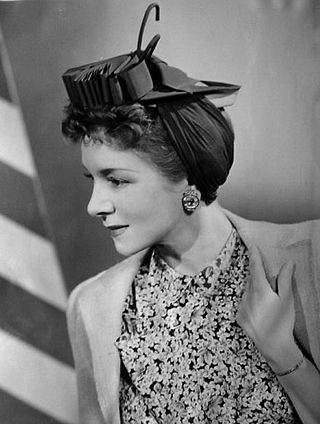
Helen Hayes MacArthur was an American actress whose career spanned 80 years. She eventually received the nickname "First Lady of American Theatre" and was the second person and first woman to have won an Emmy, a Grammy, an Oscar, and a Tony Award. She was also the first person to win the Triple Crown of Acting; to date, the only other person to have accomplished both is Rita Moreno. Hayes also received the Presidential Medal of Freedom, America's highest civilian honor, from President Ronald Reagan in 1986. In 1988, she was awarded the National Medal of Arts.
Patrick Cantlay, American golfer births

Patrick Cantlay is an American professional golfer. He had a successful amateur career and was the number one golfer in the World Amateur Golf Ranking for 55 weeks. He has won eight times on the PGA Tour as well as the 2021 FedEx Cup.
John Boyega, English actor births

John Adedayo Bamidele Adegboyega Listen(born 17 March 1992), known professionally as John Boyega, is a British actor and producer. He first rose to prominence in his native Britain for his role as Moses in the sci-fi comedy film Attack the Block (2011), and his international breakthrough came with his role as Finn in the Star Wars sequel trilogy films The Force Awakens (2015), The Last Jedi (2017), and The Rise of Skywalker (2019).
Grace Stafford, American actress (b. 1903) deaths

Grace Lantz, also known by her stage name Grace Stafford, was an American actress and the wife of animation producer Walter Lantz. Stafford is best known for providing the voice of Woody Woodpecker, a creation of Lantz's, from 1950 to 1992.
Jack De Belin, Australian rugby league player births

Jack de Belin is an Australian professional rugby league footballer who plays as a lock and prop for the St. George Illawarra Dragons in the NRL.
Hozier, Irish singer-songwriter and musician births

Andrew John Hozier-Byrne, known mononymously as Hozier, is an Irish musician, singer, and songwriter. His music primarily draws from folk, soul, and blues, often using religious and literary themes. He had his international breakthrough after releasing his debut single "Take Me to Church", which has been certified multi-platinum in several countries.
Saina Nehwal, Indian badminton player births

Saina Nehwal is an Indian professional badminton player. A former world no. 1, she has won 24 international titles, which includes ten Superseries titles. Although she reached the world's 2nd in 2009, it was only in 2015 that she was able to attain the world no. 1 ranking, thereby becoming the only female player from India and overall the second Indian player – after Prakash Padukone – to achieve this feat. She has represented India three times in the Olympics, winning a bronze medal in her second appearance at London 2012.
Capucine, French model and actress (b. 1928) deaths

Capucine was a French fashion model and actress known for her comedic roles in The Pink Panther (1963) and What's New Pussycat? (1965). She appeared in 36 films and 17 television productions between 1948 and 1990.
Dinkar G. Kelkar, Indian art collector (b. 1896) deaths
Dinkar Gangadhar Kelkar was an Indian writer, editor, art collector and historian. He is best remembered for establishing the Raja Dinkar Kelkar Museum in Pune.
Shinji Kagawa, Japanese footballer births

Shinji Kagawa is a Japanese professional footballer who plays as a midfielder for Belgian First Division A club Sint-Truiden and the Japan national team. He is widely regarded as one of the best Japanese players of all time. Kagawa began his professional career in his homeland with Cerezo Osaka before joining Borussia Dortmund in 2010. After two years with Dortmund, Kagawa signed for Manchester United on a four-year contract. Two years later, he returned to Dortmund. Kagawa holds the records for most appearances and goals by a Japanese player in UEFA club competitions.
Rasmus Elm, Swedish footballer births

Rasmus Christoffer Elm is a Swedish former professional footballer who played as a midfielder. He is currently the assistant coach of Kalmar FF. During his career, he played for Kalmar FF in Sweden, for AZ in the Netherlands and the Russian side CSKA Moscow. Elm earned 39 caps for Sweden between 2009 and 2013 and competed at UEFA Euro 2012. He is the younger brother of Viktor and David Elm.
Fraser Forster, English footballer births

Fraser Gerard Forster is an English professional footballer who plays as a goalkeeper for Premier League club Tottenham Hotspur.
Grimes, Canadian artist, musician and music video director births

Claire Elise Boucher, known professionally as Grimes, is a Canadian musician, singer, songwriter, and record producer. Her early work has been described as extending from "lo-fi R&B" to futuristic dance-pop, and has incorporated influences from electronic music, hip hop, and rock. Her lyrics often touch on science fiction and feminist themes. She has released five studio albums.
Ryan White, Canadian ice hockey player births

Ryan White is a Canadian former professional ice hockey center who last played for the Wichita Thunder of the ECHL. He previously played in the National Hockey League (NHL) for the Montreal Canadiens, Philadelphia Flyers, Arizona Coyotes and Minnesota Wild. He is the current assistant coach of the Winkler Flyers of the Manitoba Junior Hockey League.
Federico Fazio, Argentinian international footballer births

Federico Julián Fazio is an Argentine professional footballer who plays as a central defender for Italian club Salernitana.
Krisnan Inu, New Zealand rugby league player births

Krisnan Nevada Inu is a professional rugby league footballer who plays as a centre or winger for the Leigh Centurions in the RFL Championship. He has played for both New Zealand and Samoa at international level. On 24 February 2022, it was announced that Inu had signed with immediate effect for Leigh in the Betfred Championship.
Ryan Parent, Canadian ice hockey player births

Ryan Parent is a Canadian former professional ice hockey defenceman who played for the Philadelphia Flyers and the Vancouver Canucks of the National Hockey League (NHL). He is currently an assistant coach with the Binghamton Devils.
Bobby Ryan, American ice hockey player births

Robert Shane Ryan is an American former professional ice hockey winger. He played for the Anaheim Ducks, Ottawa Senators and Detroit Red Wings in the National Hockey League (NHL). He was drafted second overall by the Mighty Ducks of Anaheim in the 2005 NHL Entry Draft.
Emmanuel Sanders, American football player births

Emmanuel Niamiah Sanders is a former American football wide receiver who played 12 seasons in the National Football League (NFL). He played college football at SMU, and was drafted by the Pittsburgh Steelers in the third round of the 2010 NFL Draft. Sanders won Super Bowl 50 with the Denver Broncos over the Carolina Panthers, and also played for the San Francisco 49ers, New Orleans Saints, and Buffalo Bills.
Chris Davis, American baseball player births

Christopher Lyn Davis, nicknamed "Crush Davis", is an American former professional baseball first baseman. He played in Major League Baseball (MLB) for the Texas Rangers and Baltimore Orioles. He bats left-handed and throws right-handed. While primarily a first baseman throughout his career, Davis has also been a designated hitter, third baseman, and outfielder.
Edin Džeko, Bosnian footballer births

Edin Džeko is a Bosnian professional footballer who plays as a striker for Serie A club Inter Milan and captains the Bosnia and Herzegovina national team.
Miles Kane, English singer-songwriter and guitarist births

Miles Peter Kane is an English musician, best known as a solo artist and the co-frontman of the Last Shadow Puppets. He was also the former frontman of the Rascals, before the band announced their break-up in August 2009.
Silke Spiegelburg, German pole vaulter births

Silke Spiegelburg is a German pole vaulter. She is the younger sister of Richard Spiegelburg. She represented Germany at the Summer Olympics in 2004, 2008 and 2012, as well as having competed at the World Championships in Athletics. She is a European silver medallist in the event both indoors and outdoors.
Clarence D. Lester, African-American fighter pilot (b.1923) deaths

Clarence D. “Lucky” Lester was an American fighter pilot who served in the 332nd Fighter Group, commonly known as the Tuskegee Airmen, during World War II. He was one of the first African-American military aviators in the United States Army Air Corps, the United States Army Air Forces and later the United States Air Force.
Tuğba Karademir, Turkish-Canadian figure skater births

Tuğba Karademir is a Turkish former competitive figure skater. She won silver medals at the 2008 International Challenge Cup and 2008 Ondrej Nepela Memorial. She qualified to the free skate at two Winter Olympics, two World Championships, and seven European Championships (2004–2010). She served as the flag-bearer for Turkey at the 2006 Winter Olympics in Turin and the 2010 Winter Olympics in Vancouver.
Ryan Rottman, American actor, producer, and screenwriter births
Ryan Rottman is an American actor. He is known for his role as Joey Colvin on the TeenNick series Gigantic.
James Heath, English golfer births
James Joseph Heath is an English professional golfer.
Raul Meireles, Portuguese footballer births

Raul José Trindade Meireles is a Portuguese former footballer who played as a midfielder.
Attila Vajda, Hungarian sprint canoeist births

Attila Vajda is a Hungarian sprint canoeist who has competed since the early 2000s. Competing in three Summer Olympics he has won two medals in the C-1 1000 m event with a gold in 2008 and a bronze in 2004.
Haldan Keffer Hartline, American physiologist and academic, Nobel Prize laureate (b. 1903) deaths

Haldan Keffer Hartline was an American physiologist who was a co-recipient of the 1967 Nobel Prize in Physiology or Medicine for his work in analyzing the neurophysiological mechanisms of vision.

The Nobel Prize in Physiology or Medicine is awarded yearly by the Nobel Assembly at the Karolinska Institute for outstanding discoveries in physiology or medicine. The Nobel Prize is not a single prize, but five separate prizes that, according to Alfred Nobel's 1895 will, are awarded "to those who, during the preceding year, have conferred the greatest benefit to humankind". Nobel Prizes are awarded in the fields of Physics, Chemistry, Physiology or Medicine, Literature, and Peace.
Louisa E. Rhine, American botanist and parapsychologist (b. 1891) deaths

Louisa Ella Rhine was an American doctor of botany and is known for her work in parapsychology. At the time of her death, she was recognized as the foremost researcher of spontaneous psychic experiences, and has been referred to as the “first lady of parapsychology.”
Steven Pienaar, South African footballer births

Steven Jerome Pienaar is a South African former professional footballer and current assistant coach of the U18 team of the Ajax Youth Academy.
Aaron Baddeley, American-Australian golfer births

Aaron John Baddeley is an Australian professional golfer. He was born in Lebanon, New Hampshire, USA and now plays on the U.S.-based PGA Tour, he has joint U.S. and Australian citizenship and was raised in Australia from the age of two. He represents Australia in international golf.
Servet Çetin, Turkish footballer births

Servet Çetin is a Turkish footballer who last played for Mersin Idmanyurdu in the Süper Lig. He received the nickname Ayıboğan which literally means; a man who could choke a bear, due to his height and strength. He also has the nickname "Türkü Baba" due to the numerous Turkish folk songs on his iPod.
Kyle Korver, American basketball player births
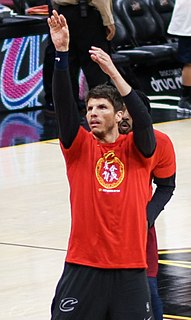
Kyle Elliot Korver is an American former professional basketball player who currently serves as the director of player affairs and development for the Atlanta Hawks of the National Basketball Association (NBA). He played college basketball for the Creighton Bluejays.
Nicky Jam, American-Puerto-Rican singer and songwriter births

Nick Rivera Caminero, known professionally as Nicky Jam, is an American singer and actor. He is best known for hits such as "X", "Travesuras", "En la Cama", "Te Busco", "El Perdón", "Hasta el Amanecer", and "El Amante"; the latter three are from his 2017 album Fénix. He has frequently collaborated with other Latin artists such as Daddy Yankee, J Balvin, Ozuna, Plan B and Anuel AA. While his early music exemplified traditional fast-paced reggaeton, his newer compositions place more emphasis on sung vocals and romantic lyrics.
Paul Dean, American baseball player (b. 1913) deaths

Paul Dee Dean, nicknamed "Daffy", was an American Major League Baseball right-handed pitcher. Born in Lucas, Arkansas, he pitched for the St. Louis Cardinals (1934–1939), the New York Giants (1940–1941), and the St. Louis Browns (1943).
Danny Califf, American soccer player births

Daniel Benjamin Califf is an American retired soccer player.
Aisam-ul-Haq Qureshi, Pakistani tennis player births

Aisam-ul-Haq Qureshi is a Pakistani professional tennis player who specialises in doubles. He is the only Pakistani player ever to reach a Grand Slam final, having done so in both men's and mixed doubles at the 2010 US Open, alongside Rohan Bopanna and Květa Peschke respectively. Qureshi has also reached seven further major semifinals across the two disciplines. He reached his career-high doubles ranking of world No. 8 in June 2011, and has won 18 titles on the ATP Tour, including the 2011 Paris Masters and 2013 Miami Open, with Bopanna and Jean-Julien Rojer respectively. Qureshi has also qualified for the ATP Finals in doubles on three occasions.
Stormy Daniels (born Stephanie Gregory), American adult film actress births

Stephanie Gregory Clifford, known professionally as Stormy Daniels, is an American pornographic film actress and director, and former stripper. She has won numerous industry awards, and is a member of the NightMoves, AVN and XRCO Halls of Fame. In 2009, a recruitment effort led her to consider challenging incumbent David Vitter for the 2010 Senate election in her native Louisiana.
Andrew Ference, Canadian ice hockey player births

Andrew James Stewart Ference is a Canadian former professional ice hockey defenseman. Ference started in the NHL during the 1999–2000 season and played for the Pittsburgh Penguins, Calgary Flames, Boston Bruins and the Edmonton Oilers. In 2011, Ference helped the Bruins to their sixth Stanley Cup championship. Ference was born in Edmonton, Alberta, but grew up in Sherwood Park, Alberta.
Stephen Kramer Glickman, Canadian-American actor, director, producer, and fashion designer births

Stephen Kramer Glickman is a Canadian-American comedian, actor, musician and podcast host based in Los Angeles, California. He is best known as for his role as Gustavo Rocque on the Nickelodeon sitcom Big Time Rush (2009–2013), and for co-hosting the podcast The Night Time Show.
Mineko Nomachi, Japanese essayist births
Mineko Nomachi is a Japanese essayist, columnist, illustrator, and radio and television personality. She is best known for her blog I'm Queer but I'm an Office Lady , which was published as a book by Bungeishunjū in 2006, and for multiple radio and television programs co-hosted with writer Mitsurou Kubo. Her name is a pen name derived from a combination of the names of her paternal and maternal grandmothers.
Samoa Joe, American professional wrestler births
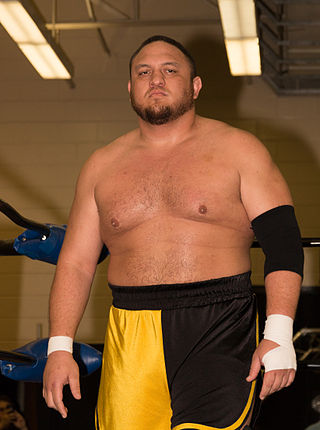
Nuufolau Joel Seanoa, is an American professional wrestler better known by the ring name Samoa Joe who is currently signed to All Elite Wrestling (AEW). Joe is currently a double champion - in his first reign both as AEW TNT Champion, and as ROH World Television Champion in AEW's sister promotion Ring of Honor (ROH), where he was inducted as part of the inaugural class in the ROH Hall of Fame. During his career, Joe has also worked for Total Nonstop Action Wrestling and World Wrestling Entertainment (WWE).
Zachery Kouwe, American journalist births
Zachery "Zach" Kouwe is a communications strategist and former financial journalist. He serves as a media and strategic communications advisor to corporations and financial firms including activist shareholders and large institutional investors.
Tamar Braxton, American singer-songwriter and actress births

Tamar Estine Braxton is an American singer and television personality.
Scott Downs, American baseball player births

Scott Jeremy Downs is an American former professional baseball relief pitcher. He played in Major League Baseball for the Chicago Cubs, Montreal Expos, Toronto Blue Jays, Los Angeles Angels of Anaheim, Atlanta Braves, and Chicago White Sox. He has been a starter, reliever and closer during his baseball career.
Stephen Gately, Irish singer-songwriter and actor (d. 2009) births

Stephen Patrick David Gately was an Irish singer, who, with Ronan Keating, was co-lead singer of the pop group Boyzone; all of Boyzone's studio albums during Gately's lifetime hit number one in the United Kingdom, their third being their most successful internationally. With Boyzone, Gately had a record-breaking sixteen consecutive singles enter the top five of the UK Singles Chart. He performed for millions of fans globally. He released a solo album in 2000, after the group's initial break-up, which charted in the UK top ten and yielded three UK hit singles, including the top three hit "New Beginning". Gately went on to appear variously in stage productions and on television programmes as well as contributing songs to various projects. In 2008, he rejoined his colleagues as Boyzone reformed for a series of concerts and recordings.
Álvaro Recoba, Uruguayan footballer births
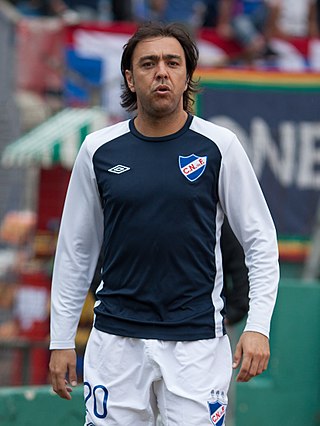
Álvaro Alexánder Recoba Rivero is a Uruguayan former footballer who played as a forward or midfielder. Although he began and ended his footballing career in his native country, he also played for several European clubs throughout his career, most notably Italian side Inter Milan, where he spent 11 seasons.
Luchino Visconti, Italian director and screenwriter (b. 1906) deaths

Luchino Visconti di Modrone, Count of Lonate Pozzolo was an Italian filmmaker, stage director, and screenwriter. A major figure of Italian art and culture in the mid-20th century, Visconti was one of the fathers of cinematic neorealism, but later moved towards luxurious, sweeping epics dealing with themes of beauty, decadence, death, and European history, especially the decay of the nobility and the bourgeoisie. He was the recipient of many accolades, including the Palme d'Or and the Golden Lion, and many of his works are regarded as highly-influential to future generations of filmmakers.
Justin Hawkins, English singer-songwriter births

Justin David Hawkins is an English musician, singer, songwriter, and YouTube personality best known for being the founder, lead singer, and lead guitarist of The Darkness. He was influenced by rock bands of the 1970s and 1980s, Hawkins is the lead singer and guitarist for the band Hot Leg, formed in 2008 and now on hiatus.
Puneeth Rajkumar, Indian actor, singer, and producer births
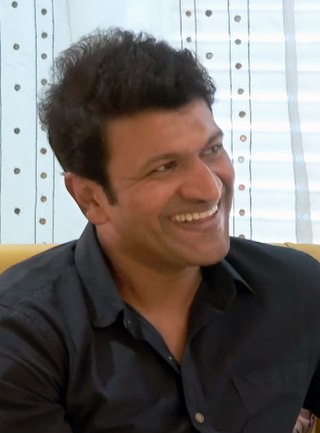
Dr. Puneeth Rajkumar, colloquially known as Appu, was an Indian actor, playback singer, television presenter, and producer, who worked in Kannada cinema. He was the youngest son of actor and matinee idol Dr. Rajkumar, He was one of the most popular actors in Kannada cinema. He was the lead in 30 films; as a child, he appeared in many films. His performances in Vasantha Geetha (1980), Bhagyavantha (1981), Chalisuva Modagalu (1982), Eradu Nakshatragalu (1983), Bhakta Prahaladha, Yarivanu and Bettada Hoovu (1985) were praised. He won the National Film Award for Best Child Artist for his role of Ramu in Bettada Hoovu. He also won Karnataka State Award Best Child artist for Chalisuva Modagalu and Eradu Nakshatragalu. Puneeth's first lead role was in 2002's Appu. He was conferred with the Doctorate by Mysuru University. The Karnataka Government conferred the state's highest civilian award, Karnataka Ratna, to Puneeth Rajkumar on 1 November 2022, posthumously.
Test, Canadian-American wrestler (d. 2009) births

Andrew James Robert Patrick Martin was a Canadian professional wrestler and actor. He was best known for his time with the World Wrestling Federation/Entertainment (WWF/WWE) under the ring name Test.
Natalie Zea, American actress births

Natalie Zea is an American actress known for her performances on television. Zea began her acting career in theatre. Her first major role was on the NBC daytime soap opera Passions (2000–2002), where she played the role of Gwen Hotchkiss. Her breakout role was on the ABC primetime soap opera Dirty Sexy Money as socialite Karen Darling, where she starred from 2007 to 2009. Zea also has made many guest appearances on television, starred in a number of independent and made-for-television movies, and had recurring roles in The Shield, Hung, Californication, and The Unicorn.
Mark Dolan, English comedian and television host births

Mark Dolan is an English comedian, writer, and presenter. He currently hosts Mark Dolan Tonight on GB News. He was the host of Balls of Steel from 2005 until 2008 on Channel 4.
Louis Kahn, American architect and academic, designed Jatiyo Sangsad Bhaban (b. 1901) deaths

Louis Isadore Kahn was an Estonian-born American architect based in Philadelphia. After working in various capacities for several firms in Philadelphia, he founded his own atelier in 1935. While continuing his private practice, he served as a design critic and professor of architecture at Yale School of Architecture from 1947 to 1957. From 1957 until his death, he was a professor of architecture at the School of Design at the University of Pennsylvania.

Jatiya Sangsad Bhaban or National Parliament House, is the house of the Parliament of Bangladesh, located at Sher-e-Bangla Nagar in the Bangladeshi capital of Dhaka. Designed while the country was still part of Pakistan by architect Louis Kahn, the complex is one of the largest legislative complexes in the world, covering 200 acres (810,000 m2).
Rico Blanco, Filipino singer-songwriter, guitarist, producer, and actor births

Rico Rene Granados Blanco is a Filipino singer, songwriter, multi-instrumentalist, record producer, actor, endorser and entrepreneur. He began his career as one of the founding members, and served as the chief songwriter, vocalist, guitarist, and keyboardist of the Filipino rock band Rivermaya from 1994 until 2007, and has been a solo artist since 2008.
Caroline Corr, Irish singer and drummer births

Caroline Georgina Corr MBE, known to fans as the "Chick with the Stick", is an Irish singer and drummer for the Celtic folk rock band The Corrs. In addition to the drums, Corr plays the bodhrán, cajón, percussions and piano.
Vance Wilson, American baseball player and manager births
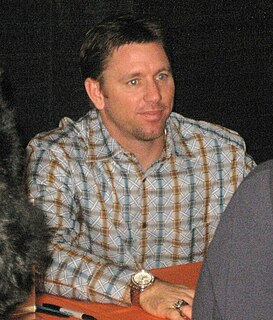
Vance Allen Wilson is an American former professional baseball catcher and current coach. He is the third base coach for the Kansas City Royals of Major League Baseball (MLB). He played all or parts of eight seasons in MLB. Listed at 5'11" tall and 215 pounds, he batted and threw right-handed during his career.
Melissa Auf der Maur, Canadian-American singer-songwriter and bass player births

Melissa Gaboriau Auf der Maur is a Canadian musician.
Torquil Campbell, English-Canadian singer-songwriter and actor births

Torquil Campbell is the co-lead singer and a songwriter for the Montreal-based indie rock band Stars. In addition to singing, he also plays the melodica, trumpet, synthesizer, and tambourine. Campbell is also an actor and playwright, most recently co-creating and starring in the play True Crime, produced by Crow's Theatre in Toronto.
Mia Hamm, American soccer player births

Mariel Margaret Hamm-Garciaparra is an American retired professional soccer player, two-time Olympic gold medalist and two-time FIFA Women's World Cup champion. Hailed as a soccer icon, she played as a forward for the United States women's national soccer team from 1987 to 2004. Hamm was the face of the Women's United Soccer Association (WUSA), the first professional women's soccer league in the United States, where she played for the Washington Freedom from 2001 to 2003. She played college soccer for the North Carolina Tar Heels women's soccer team and helped the team win four consecutive NCAA Division I Women's Soccer Championship titles.
Bill Mueller, American baseball player and coach births

William Richard Mueller is an American retired professional baseball third baseman who played in Major League Baseball (MLB). Mueller's MLB playing career was spent with the San Francisco Giants, Chicago Cubs (2001–2002), Boston Red Sox (2003–2005), and Los Angeles Dodgers (2006). He is currently the hitting coach at Arizona State.
Patrick Lebeau, Canadian ice hockey player births
Patrick Mikael Lebeau is a Canadian former professional ice hockey player. He represented Canada at the 1992 Winter Olympics, winning a silver medal. He has played professionally in the National Hockey League with the Montreal Canadiens, Calgary Flames, Florida Panthers, and Pittsburgh Penguins. He is the younger brother of Stéphan Lebeau.
Gene Ween, American singer-songwriter and guitarist births
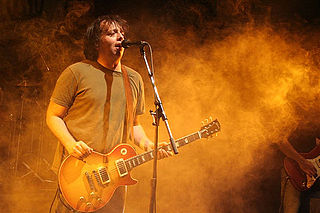
Aaron Freeman, better known by his stage name Gene Ween, is an American singer, guitarist and a founding member of the experimental alternative rock group Ween. Freeman, along with childhood friend Dean Ween, started the group in the mid-1980s.
Darren Kenny, British Paralympic cyclist births
Darren Kenny is a British road and track racing cyclist and Paralympian. Kenny's results have made him one of his sport's biggest stars; his dominance over multiple Paralympics gave rise to his nickname of 'Daz the Destroyer'.
Edgar Grospiron, French skier births

Edgar Grospiron is a French freestyle skier and Olympic champion. He won a gold medal at the 1992 Winter Olympics in Albertville. He received a bronze medal at the 1994 Winter Olympics in Lillehammer. At the 2012 Winter Youth Olympics he was Chef de mission for the French Team. He was in charge of the Annecy bid for the 2018 Winter Olympics, which did not win.
Alexander McQueen, English fashion designer, founded own eponymous brand (d. 2010) births

Lee Alexander McQueen CBE was a British fashion designer and couturier. He founded his own Alexander McQueen label in 1992, and was chief designer at Givenchy from 1996 to 2001. His achievements in fashion earned him four British Designer of the Year awards, as well as the CFDA's International Designer of the Year award in 2003. McQueen died from suicide in 2010 at the age of 40, at his home in Mayfair, London, shortly after the death of his mother.
Alexander McQueen is a British luxury fashion house founded by designer Alexander McQueen in 1992. Its current creative director is Sarah Burton.
Eri Nitta, Japanese singer-songwriter and actress births
Eri Nitta is a Japanese singer, actress, lyricist, and tarento. She made her professional debut as the fourth member of the all-female singing group Onyanko Club in 1985. She made her solo debut with the hit song Winter Opera Glasses on January 1, 1986. Nitta performed the opening and ending theme songs for the first 14 episodes of the Little Women anime television series from Nippon Animation.
Mathew St. Patrick, American actor and producer births
Mathew St. Patrick is an American actor best known for his portrayal of Keith Charles on the HBO drama series Six Feet Under (2001−05). Previously, Patrick appeared as Marcus Taggert in The Young and the Restless (1997) and Adrian Sword in All My Children (1998−2000), both soap operas. St. Patrick also had a leading role as Detective Kenneth Marjorino in short-lived series Reunion (2005−06). His film roles include War (2007) and Alien Raiders (2008).
Jason Alchin, Australian rugby league player births
Jason Andrew Alchin is an Australian former professional rugby league footballer who primarily played as a halfback. He played for Canterbury-Bankstown, St. George and Western Suburbs in the New South Wales Rugby League (NSWRL) competition.
Billy Corgan, American singer-songwriter, guitarist, pianist, and producer births

William Patrick Corgan Jr. is an American musician, singer, songwriter, and professional wrestling promoter. He is best known as the lead singer, primary songwriter, guitarist, and only permanent member of the rock band the Smashing Pumpkins. He is currently the owner and promoter of the National Wrestling Alliance (NWA).
Barry Minkow, American pastor and businessman births
Barry Jay Minkow is a former American businessman, pastor, and convicted felon. While still in high school, Minkow founded ZZZZ Best, which appeared to be an immensely successful carpet-cleaning and restoration company. However, it was actually a front to attract investment for a massive Ponzi scheme. ZZZZ Best collapsed in 1987, costing investors and lenders $100 million in one of the largest investment frauds ever perpetrated by a single person, as well as one of the largest accounting frauds in history. The scheme is often used as a case study of accounting fraud.
Andrew Rosindell, English journalist and politician births

Andrew Richard Rosindell MP is a British Conservative politician. He became the Member of Parliament (MP) for the Romford constituency in Greater London in 2001.
Andrew Hudson, South African cricketer births
Andrew Charles Hudson is a former South African Test and ODI cricketer. The right-handed batsman played 35 Tests and 89 One Day Internationals for South Africa in the 1990s. His career spanned 16 consecutive summers, playing for both his country and his province KwaZulu-Natal / Dolphins.
Amos Alonzo Stagg, American football player and coach (b. 1862) deaths

Amos Alonzo Stagg was an American athlete and college coach in multiple sports, primarily American football. He served as the head football coach at the International YMCA Training School (1890–1891), the University of Chicago (1892–1932), and the College of the Pacific (1933–1946), compiling a career college football record of 314–199–35 (.605). His undefeated Chicago Maroons teams of 1905 and 1913 were recognized as national champions. He was also the head basketball coach for one season at Chicago (1920–1921), and the Maroons' head baseball coach for nineteen seasons.
Stefano Borgonovo, Italian footballer (d. 2013) births
Stefano Borgonovo was an Italian footballer and manager, who played as a striker. An opportunistic striker, Borgonovo played for several Italian clubs throughout his career, and came to prominence while playing alongside Roberto Baggio with Fiorentina during the 1988–89 season, on loan from Milan. His prolific performances with Fiorentina earned him a permanent move to Milan, where he contributed to the club's European Cup victory in 1990, despite struggling with injuries.
Lee Dixon, English footballer and journalist births

Lee Michael Dixon is an English retired professional footballer and pundit who played as a right-back for Arsenal. Dixon was also capped 22 times for England.
Rob Lowe, American actor and producer births
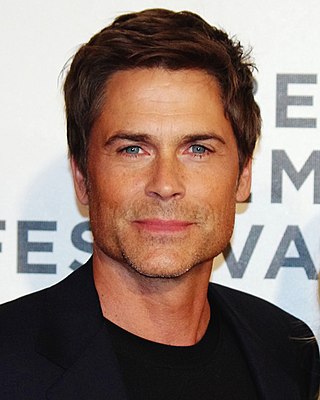
Robert Hepler Lowe is an American actor, producer, director, and podcaster. He made his acting debut at the age of 15 with ABC's short-lived sitcom A New Kind of Family (1979–1980). Following numerous television roles in the early 1980s, he came to prominence as a teen idol and member of the Brat Pack with roles in films like The Outsiders (1983), Class (1983), The Hotel New Hampshire (1984), Oxford Blues (1984), St. Elmo's Fire (1985), About Last Night... (1986), and Square Dance (1987). The success of these films established him as a Hollywood star.
Jacques Songo'o, Cameroonian footballer and coach births

Jacques Celestin Songo'o is a Cameroonian former professional footballer who played as a goalkeeper, and is the current goalkeeper coach of the Cameroon national team.
Roger Harper, Guyanese cricketer and coach births

Roger Andrew Harper is a Guyanese former cricketer turned coach, who played both Test and One Day International cricket for the West Indies cricket team. His international career lasted 13 years, from 1983 to 1996, and he was later described as a "fabulous" fielder.
Carsten Almqvist, Swedish business executive births

Casten Åke Loritz Almqvist,, was the Swedish CEO for TV4 Media 2011-2022. December 2019-2022 he was also part of Telia Company's group executive management team leading the business area TV/Media.
Ank Bijleveld, Dutch politician births

Anna Theodora Bernardina "Ank" Bijleveld-Schouten is a Dutch politician of the Christian Democratic Appeal (CDA) who has been serving as acting mayor of Almere since 10 January 2022. She served as Minister of Defence in the third cabinet of Prime Minister Mark Rutte from 26 October 2017 to 17 September 2021.
Janet Gardner, American singer and guitarist births

Janet Patricia Gardner (born March 21, 1962 an American rock singer. She is best known as the former lead vocalist and rhythm guitarist of the all-female glam metal band Vixen joining in 1983. She was the band's longest serving vocalist having performed on three of the band's four studio albums. When Vixen broke up in 1992 she took a hiatus from singing to pursue personal endeavors. She briefly unofficially reformed Vixen in 1997 with drummer Roxy Petrucci. She returned to Vixen in 2001, later studying to become a dental hygienist. In 2004 she took part in a Vixen reunion for a one-night-only gig as part of VH1's Bands Reunited TV show. She returned to Vixen full-time in 2012.
Clare Grogan, Scottish singer and actress births

Claire Patricia Grogan, known professionally as Clare Grogan or sometimes as C. P. Grogan, is a Scottish actress and singer. She is best known as the lead singer of the 1980s new wave music group Altered Images, as well as for supporting roles in the 1981 film Gregory's Girl and the science fiction sitcom Red Dwarf, as the first incarnation of Kristine Kochanski.
Rob Sitch, Australian actor, director, and producer births
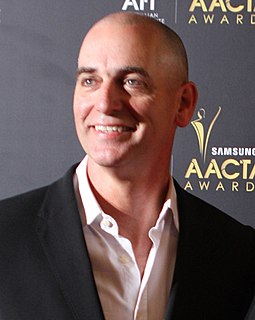
Robert Ian Sitch is an Australian director, producer, screenwriter, actor and comedian.
Sam Bowie, American basketball player births

Samuel Paul Bowie is an American former professional basketball player. A national sensation in high school and outstanding collegian and Olympic team member, Bowie's professional promise was undermined by repeated injuries to his legs and feet. In spite of the setbacks, the 7 ft 1 in (2.16 m) and 235 lb (107 kg) center played ten seasons in the National Basketball Association (NBA).
Dana Reeve, American actress, singer, and activist (d. 2006) births

Dana Charles Reeve was an American actress, singer, and activist for disability causes. She was the wife of actor Christopher Reeve and mother of television reporter and anchor Will Reeve.
Casey Siemaszko, American actor births
Kazimierz Andrew "Casey" Siemaszko is an American actor. He had supporting roles in films such as Back to the Future and Stand by Me. He had a leading role in the film Three O'Clock High.
Susanna M. Salter, American activist and politician (b. 1860) deaths

Susanna Madora Salter was an American politician and activist. She served as mayor of Argonia, Kansas, becoming the first woman elected to serve as mayor in the United States and one of the first women to serve in any political office in the U.S.
Arye Gross, American actor births

Arye Gross is an American actor, who has appeared on a variety of television shows in numerous roles, most notably Adam Greene in ABC Sitcom Ellen.
Vicki Lewis, American actress and singer births
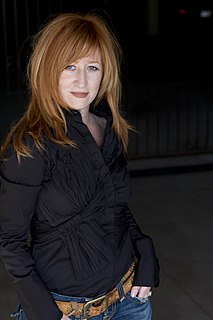
Vicki Lewis is an American singer and actress of film, stage, and television. She is best known for her role as Beth in the NBC sitcom NewsRadio.
Danny Ainge, American baseball and basketball player births

Daniel Ray Ainge is an American former professional basketball player, coach, and former professional baseball player who serves as an executive for the Utah Jazz of the National Basketball Association (NBA).
Paul Black, American singer-songwriter and drummer births

Paul Mars Black is an American singer and drummer. He is most notable for his time as lead vocalist in L.A. Guns, with whom he wrote most of their self-titled debut album.
Christian Clemenson, American actor births
Christian Dayton Clemenson is an American film and television actor. He is well known for his portrayal of Jerry "Hands" Espenson in the television series Boston Legal, for which he was nominated for three Emmy Awards and won the 2006 Emmy Award for Outstanding Guest Actor in a Drama Series. He has appeared in a number of highly acclaimed films, including Hannah and Her Sisters, Broadcast News, Apollo 13 and The Big Lebowski, and portrayed Tom Burnett in Paul Greengrass' United 93. He starred in The People v. O. J. Simpson: American Crime Story as prosecutor William Hodgman.
John Pius Boland, Irish tennis player and politician (b. 1870) deaths

John Mary Pius Boland was an Irish Nationalist politician, and Member of Parliament (MP) in the House of Commons of the United Kingdom of Great Britain and Ireland and as member of the Irish Parliamentary Party for South Kerry from 1900 to 1918. He was also noteworthy as a gold medallist tennis player at the first modern Olympics.
Bertha De Vriese, Belgian physician (b. 1877) deaths
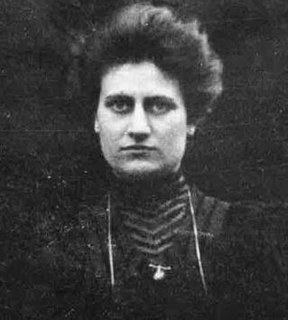
Bertha De Vriese was a Belgian physician. When she earned her degree as a doctor of medicine at Ghent University, where she was the first woman to conduct research and the first woman physician to graduate from the school. Although she was not allowed to pursue an academic career, De Vriese opened a private pediatric clinic and served as the director of the Children's Ward at the Bijloke Hospital in Ghent. In 1914, she married Josef Vercouillie, also a physician.
Michael Kelly, American journalist and author (d. 2003) births
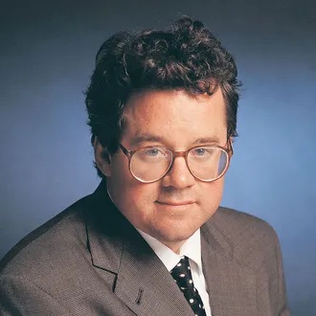
Michael Thomas Kelly was an American journalist for The New York Times, a columnist for The Washington Post and The New Yorker, and a magazine editor for The New Republic, National Journal, and The Atlantic. He came to prominence through his reporting on the 1990–1991 Gulf War, and was well known for his political profiles and commentary. He suffered professional embarrassment for his role as senior editor in the Stephen Glass scandal at The New Republic. Kelly was killed while covering the invasion of Iraq, in 2003; he was the first US journalist to die during this war.
Ramon Magsaysay, Filipino captain and politician, 7th President of the Philippines (b. 1907) deaths

Ramon del Fierro Magsaysay Sr. was a Filipino statesman who served as the seventh president of the Philippines, from December 30, 1953, until his death in an aircraft disaster on March 17, 1957. An automobile mechanic by profession, Magsaysay was appointed military governor of Zambales after his outstanding service as a guerrilla leader during the Pacific War. He then served two terms as Liberal Party congressman for Zambales's at-large district before being appointed Secretary of National Defense by President Elpidio Quirino. He was elected president under the banner of the Nacionalista Party. He was the first Philippine president born in the 20th century and the first to be born after the Spanish colonial era.

The president of the Philippines is the head of state, head of government and chief executive of the Philippines. The president leads the executive branch of the Philippine government and is the commander-in-chief of the Armed Forces of the Philippines.
Patrick McDonnell, American author and illustrator births
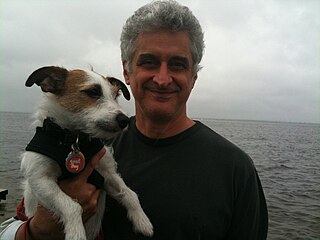
Patrick McDonnell is a cartoonist, author, and playwright. He is the creator of the daily comic strip Mutts, which follows the adventures of a dog and a cat, that has been syndicated since 1994. Prior to creating Mutts, he was a prolific magazine illustrator, and would frequently include a dog in the backgrounds of his drawings.
Rory McGrath, British comedian, television personality, and writer births

Patrick Rory McGrath is a British comedian, television personality, and writer. He came to prominence in the comedy show Who Dares Wins and was a regular panellist on the game show They Think It's All Over for many years. He acted in the sitcom Chelmsford 123 and appeared in the ITV reality show Sugar Free Farm.
Fred Allen, American actor, comedian, screenwriter, and author (b. 1894) deaths

John Florence Sullivan, known professionally as Fred Allen, was an American comedian. His absurdist, topically pointed radio program The Fred Allen Show (1932–1949) made him one of the most popular and forward-looking humorists in the Golden Age of American radio.
Irène Joliot-Curie, French physicist and chemist, Nobel Prize laureate (b. 1897) deaths

Irène Joliot-Curie was a French chemist, physicist and politician, the elder daughter of Pierre and Marie Curie, and the wife of Frédéric Joliot-Curie. Jointly with her husband, Joliot-Curie was awarded the Nobel Prize in Chemistry in 1935 for their discovery of induced radioactivity, making them the second-ever married couple to win the Nobel Prize, while adding to the Curie family legacy of five Nobel Prizes. This made the Curies the family with the most Nobel laureates to date. She was also one of the first three women to be a member of a French government, becoming undersecretary for Scientific Research under the Popular Front in 1936. Both children of the Joliot-Curies, Hélène and Pierre, are also prominent scientists.

The Nobel Prize in Chemistry is awarded annually by the Royal Swedish Academy of Sciences to scientists in the various fields of chemistry. It is one of the five Nobel Prizes established by the will of Alfred Nobel in 1895, awarded for outstanding contributions in chemistry, physics, literature, peace, and physiology or medicine. This award is administered by the Nobel Foundation, and awarded by the Royal Swedish Academy of Sciences on proposal of the Nobel Committee for Chemistry which consists of five members elected by the Academy. The award is presented in Stockholm at an annual ceremony on 10 December, the anniversary of Nobel's death.
Cynthia McKinney, American activist and politician births

Cynthia Ann McKinney is an American politician, academic, and conspiracy theorist. As a member of the Democratic Party, she served six terms in the United States House of Representatives. She was the first African American woman elected to represent Georgia in the House. She left the Democratic Party and ran in 2008 as the presidential nominee of the Green Party. She ran for vice president in 2020 after the Green Party of Alaska formally nominated her and draft-nominated Jesse Ventura for president. She is currently a professor in Political Science at North South University in Bangladesh.
Paul Overstreet, American singer-songwriter and guitarist births
Paul Lester Overstreet is an American country music singer and songwriter. He recorded 10 studio albums between 1982 and 2005, and charted 16 singles on the Billboard country charts, including two No. 1 hits. He has also written singles for several other country acts, including No. 1 hits for Randy Travis, Blake Shelton, and Keith Whitley, as well as hits for The Judds and Kenny Chesney.
Gary Sinise, American actor, director, and bass player births
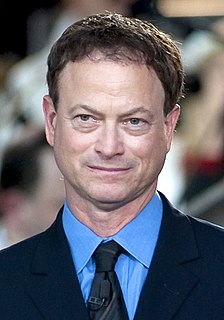
Gary Alan Sinise is an American actor, humanitarian, and musician. Among other awards, he has won a Primetime Emmy Award, a Golden Globe Award, a Tony Award, and four Screen Actors Guild Awards. He has also received a star on the Hollywood Walk of Fame, and was nominated for an Academy Award. Sinise has also received numerous awards and honors for his extensive humanitarian work and involvement with charitable organizations. He is a supporter of various veterans' organizations and founded the Lt. Dan Band, which plays at military bases around the world.
Lesley-Anne Down, English actress births

Lesley-Anne Down is a British actress, singer and former model.
Filemon Lagman, Filipino activist (d. 2001) births

Filemon Castelar Lagman, popularly known as Ka Popoy, was a revolutionary socialist and workers' leader in the Philippines. He shares the ideology of Marxism-Leninism. He split with the Communist Party of the Philippines in 1991 to form Bukluran ng Manggagawang Pilipino (BMP) and the multi-sectoral group Sanlakas.
Chuck Muncie, American football player (d. 2013) births
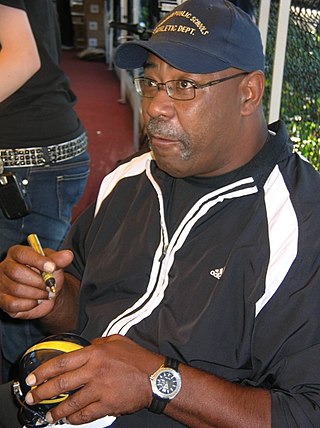
Harry Vance "Chuck" Muncie was an American professional football player who was a running back for the New Orleans Saints and San Diego Chargers in the National Football League (NFL) from 1976 to 1984. He was selected to the Pro Bowl three times, and tied the then-NFL season record for rushing touchdowns in 1981.
Barry Horne, English activist (d. 2001) births
Barry Horne was an English animal rights activist. He became known around the world in December 1998, when he engaged in a 68-day hunger strike in an effort to persuade the government to hold a public inquiry into animal testing, something the Labour Party had said it would do before it came to power in 1997. The hunger strike took place while Horne was serving an 18-year sentence for planting incendiary devices in stores that sold fur coats and leather products, the longest sentence handed down to any animal rights activist by a British court.
Scott Gorham, American singer-songwriter and guitarist births

William Scott Gorham is an American guitarist and songwriter who is one of the "twin lead guitarists" for the Irish rock band Thin Lizzy. Although not a founding member of Thin Lizzy, he served a continuous membership after passing an audition in 1974, joining the band at a time when the band's future was in doubt after the departures of original guitarist Eric Bell and his brief replacement Gary Moore. Gorham remained with Thin Lizzy until the band's breakup in 1983. He and guitarist Brian Robertson, both hired at the same time, marked the beginning of the band's most critically successful period, and together developed Thin Lizzy's twin lead guitar style while contributing dual backing vocals as well. Gorham is the band member with the longest membership after founders Brian Downey (drummer) and frontman and bass guitarist, Phil Lynott.
Craig Ramsay, Canadian ice hockey player and coach births

Craig Edward Ramsay is a Canadian professional ice hockey coach and former player. He played in the NHL from 1971 to 1985 for the Buffalo Sabres before beginning an NHL coaching career, serving as the final head coach of the Atlanta Thrashers. He is the head coach of the Slovakia men's national ice hockey team.
Kurt Russell, American actor and producer births

Kurt Vogel Russell is an American actor. He began acting on television at the age of 12 in the western series The Travels of Jaimie McPheeters (1963–1964). In the late 1960s, he signed a ten-year contract with The Walt Disney Company, where he starred as Dexter Riley in films, such as The Computer Wore Tennis Shoes (1969), Now You See Him, Now You Don't (1972), and The Strongest Man in the World (1975). According to Robert Osborne of Turner Classic Movies, he became the studio's top star of the 1970s.
Patrick Duffy, American actor, director, and producer births
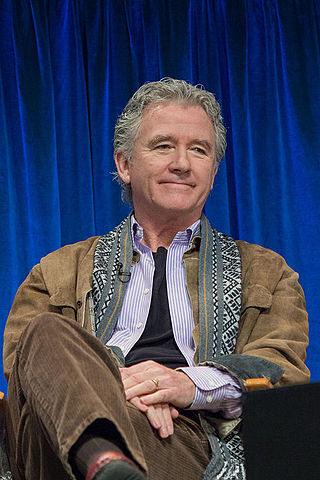
Patrick Duffy is an American actor and director widely known for his role on the CBS primetime soap opera Dallas, where he played Bobby Ewing, the youngest son of Miss Ellie, and the nicest brother of J.R. Ewing from 1978 to 1985 and from 1986 to 1991. Duffy returned to reprise his role as Bobby in a continuation of Dallas, which aired on TNT from 2012 to 2014. He is also well known for his role on the ABC sitcom Step by Step as Frank Lambert from 1991 to 1998, and for his role as Stephen Logan on the CBS daytime soap opera The Bold and the Beautiful (2006–2011). Duffy played the lead character's father in the 2014 NBC sitcom Welcome to Sweden.
Pat Rice, Irish footballer and coach births

Patrick James Rice, MBE is a Northern Irish former footballer and coach. As a player, he made over 500 appearances for Arsenal, winning the Double, and later made a hundred more appearances for Watford. He also won 49 caps for Northern Ireland. After retirement from playing professionally he was at the helm of Arsenal's Academy teams, then served as assistant manager of Arsenal, a position he held since the appointment of Arsène Wenger in 1996, and helped the club to two more Doubles, amongst other silverware, in that time. He announced his retirement from the post on 10 May 2012.
Stuart Rose, English businessman births
Stuart Alan Ransom Rose, Baron Rose of Monewden, Kt is a British businessman and life peer, who was the executive chairman of Marks & Spencer until 2010, remaining as chairman until early 2011. He was knighted in 2008 for his services to the retail industry and created a Conservative life peer on 17 September 2014, taking the title Baron Rose of Monewden, of Monewden in the County of Suffolk.
Aleksandra Ekster, Russian-French painter and set designer (b. 1882) deaths

Aleksandra Aleksandrovna Ekster, also known as Alexandra Exter, was a Russian and French painter and designer.
William Gibson, American-Canadian author and screenwriter births
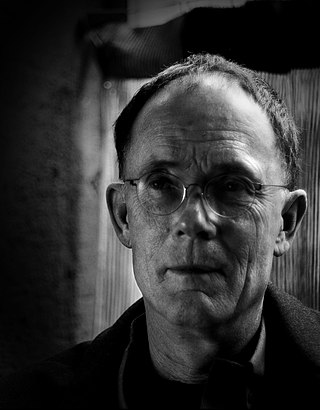
William Ford Gibson is an American-Canadian speculative fiction writer and essayist widely credited with pioneering the science fiction subgenre known as cyberpunk. Beginning his writing career in the late 1970s, his early works were noir, near-future stories that explored the effects of technology, cybernetics, and computer networks on humans—a "combination of lowlife and high tech"—and helped to create an iconography for the information age before the ubiquity of the Internet in the 1990s. Gibson coined the term "cyberspace" for "widespread, interconnected digital technology" in his short story "Burning Chrome" (1982), and later popularized the concept in his acclaimed debut novel Neuromancer (1984). These early works of Gibson's have been credited with "renovating" science fiction literature in the 1980s.
Alex MacDonald, Scottish footballer and manager births
Alexander MacDonald is a Scottish former professional football player and manager. MacDonald played for St Johnstone, Rangers and Hearts. He also played in one full international match for Scotland, in 1976. Towards the end of his playing career, MacDonald became player/manager of Hearts. He led the team as they won promotion in 1983, then narrowly missed out on winning the Scottish league championship in 1986. MacDonald then managed Airdrieonians for most of the 1990s, leading the team to Scottish Cup finals in 1992 and 1995.
Dennis Bond, English footballer, midfielder births
Dennis Joseph Thomas Bond is an English retired footballer who played for Watford, Tottenham Hotspur, Charlton Athletic and represented England at School and Youth level.
Yury Chernavsky, Russian-American songwriter and producer births

Yury (George) Chernavsky is a Russian producer, composer and songwriter. Chernavsky is a member of performance rights organisations such as GEMA, BMI, and RAO, and has also been recognized as an Honored Artist of the RSFSR.
Dai Li, Chinese general (b. 1897) deaths

Lieutenant General Dai Li (Tai Li; Chinese: 戴笠; pinyin: Dài Lì; Wade–Giles: Tai4 Li4; May 28, 1897 – March 17, 1946) was a Chinese spymaster. His courtesy name was Yunong (雨農). Born Dai Chunfeng (Tai Chun-feng; 戴春風) in Bao'an, Jiangshan, Zhejiang province, he studied at the Whampoa Military Academy, where Chiang Kai-shek served as Chief Commandant, and later became head of Chiang's military intelligence agency: the Bureau of Investigation and Statistics (Chinese: 国民政府军事委员会调查统计局; pinyin: guómín zhèngfǔ jūnshì wěiyuánhuì diàochá tǒngjìjú) or ("jūntǒng" (军统) in short) of Republican China (1912-1949).
Michael Hayden, American general, 20th Director of the Central Intelligence Agency births
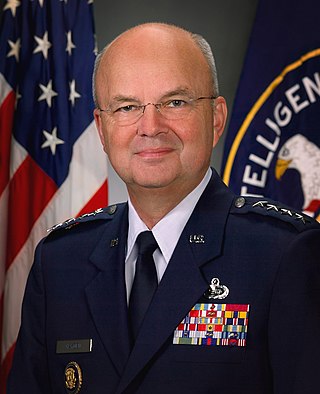
Michael Vincent Hayden is a retired United States Air Force four-star general and former Director of the National Security Agency, Principal Deputy Director of National Intelligence, and Director of the Central Intelligence Agency. Hayden currently co-chairs the Bipartisan Policy Center's Electric Grid Cyber Security Initiative. In 2017, Hayden became a national security analyst for CNN.

The director of the Central Intelligence Agency (D/CIA) is a statutory office that functions as the head of the Central Intelligence Agency, which in turn is a part of the United States Intelligence Community.
Pattie Boyd, English model, author, and photographer births

Patricia Anne Boyd is an English model and photographer. She was one of the leading international models during the 1960s and, with Jean Shrimpton, epitomised the British female look of the era. Boyd married George Harrison in 1966, experiencing the height of the Beatles' popularity and sharing in their embrace of Indian spirituality. She divorced Harrison in 1977 and married Harrison's friend Eric Clapton in 1979; they divorced in 1989. Boyd inspired Harrison's songs "I Need You", "If I Needed Someone", "Something" and "For You Blue", and Clapton's songs "Layla", "Bell Bottom Blues" and "Wonderful Tonight".
Cito Gaston, American baseball player and manager births

Clarence Edwin "Cito" Gaston is a former Major League Baseball outfielder and manager. His major league career as a player lasted from 1967 to 1978, most notably with the San Diego Padres and Atlanta Braves. He spent his entire managerial career with the Toronto Blue Jays, becoming the first African-American manager in Major League Baseball history to win a World Series title.
John Sebastian, American singer-songwriter and guitarist births
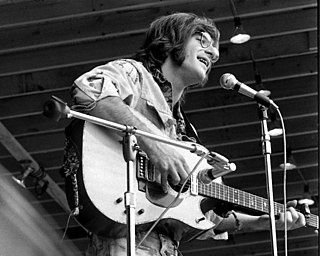
John Benson Sebastian is an American singer-songwriter, guitarist and harmonicist who founded the the Lovin' Spoonful. He made an impromptu appearance at the Woodstock festival in 1969 and scored a U.S. No. 1 hit in 1976 with "Welcome Back."
Jeff Banks, Welsh fashion designer births
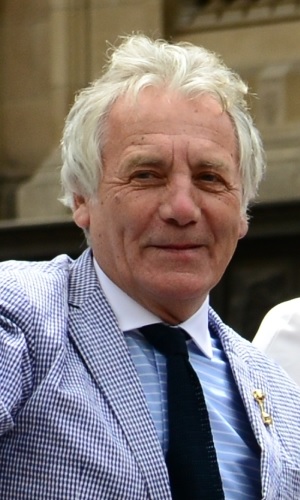
Jeff Banks PPCSD is a Welsh fashion designer of men's and women's clothing, jewellery, and home furnishings. Born in Ebbw Vale, Wales, Banks co-founded the fashion chain Warehouse in the late 1970s. He later created and presented the television programme The Clothes Show, broadcast on BBC One from 1986 to 2000.
Andrew Brook, Canadian philosopher, author, and academic births
Andrew Brook is a Canadian philosopher, author and academic particularly known for his writings on Immanuel Kant and the interplay between philosophy and cognitive science. Brook is Chancellor's Professor Emeritus of Philosophy and Cognitive Science at Carleton University, former President of the Canadian Psychoanalytic Society, and former President of the Canadian Philosophical Association.
John Wayne Gacy, American serial killer and rapist (d. 1994) births

John Wayne Gacy was an American serial killer and sex offender who raped, tortured, and murdered at least 33 young men and boys. Gacy regularly performed at children's hospitals and charitable events as "Pogo the Clown" or "Patches the Clown", personas he had devised. He became known as the Killer Clown due to his public services as a clown prior to the discovery of his crimes.
Wang Jin-pyng, Taiwanese soldier and politician births

Wang Jin-pyng is a Taiwanese politician. He served as President of the Legislative Yuan from 1999 to 2016, which makes him Taiwan's longest-serving legislative speaker. Once a leading figure of the Kuomintang (KMT), Wang is considered to be soft-spoken and a conciliatory figure who has often brokered deals between the KMT and opposition DPP. Due to his longevity, experience and influence in political scene, he is a widely respected figure in Taiwanese politics. He was replaced by Democratic Progressive Party's Su Jia-chyuan as President of the Legislative Yuan after a decisive victory for the DPP in the 2016 election.
Paul Kantner, American singer-songwriter and guitarist (d. 2016) births

Paul Lorin Kantner was an American rock musician. He is best known as the co-founder, rhythm guitarist, and vocalist of Jefferson Airplane, a leading psychedelic rock band of the counterculture era. He continued these roles as a member of Jefferson Starship, Jefferson Airplane's successor band.
Max Stafford-Clark, English director and academic births
Maxwell Robert Guthrie Stewart "Max" Stafford-Clark is a British theatre director.
Mark White, American lawyer and politician, 43rd Governor of Texas (d. 2017) births

Mark Wells White Jr. was an American politician and lawyer, who served as the 43rd governor of Texas from 1983 to 1987. He also held office as Secretary of State of Texas (1973–77), and as Texas Attorney General (1979–83).

The governor of Texas heads the state government of Texas. The governor is the leader of the executive and legislative branch of the state government and is the commander in chief of the Texas Military. The current governor is Greg Abbott, who took office in 2015.
Philomène Belliveau, Canadian artist (b. 1854) deaths

Philomène Belliveau was a Canadian artist of Acadian descent.
Jim Gary, American sculptor (d. 2006) births

Jim Gary was an American sculptor popularly known for his large, colorful creations of dinosaurs made from discarded automobile parts. These sculptures were typically finished with automobile paint although some were left to develop a natural patina during display outdoors.
Bill Graham, Canadian academic and politician, 4th Canadian Minister of Foreign Affairs births
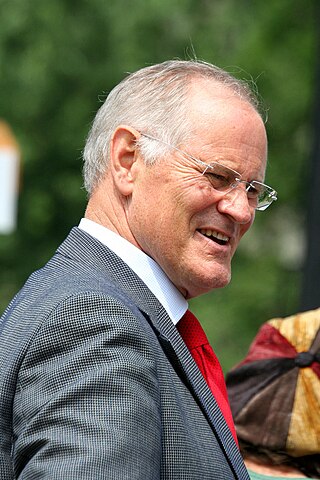
William Carvel Graham was a Canadian lawyer, academic and politician. Graham served as the minister of foreign affairs, minister of national defence, leader of the opposition and interim leader of the Liberal Party of Canada. After leaving politics, he was the chancellor of Trinity College at the University of Toronto.
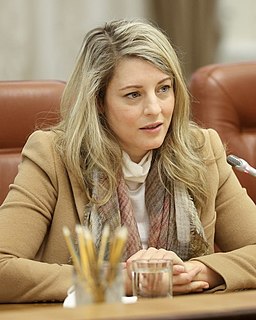
The Minister of Foreign Affairs is the minister of the Crown in the Canadian Cabinet who is responsible for overseeing the Government of Canada's international relations and is the lead minister responsible for Global Affairs Canada, though the minister of international trade leads on trade issues. In addition to Global Affairs Canada, the minister is also the lead in overseeing the International Centre for Human Rights and Democratic Development and the International Development Research Centre.
Robin Knox-Johnston, English sailor and first person to perform a single-handed non-stop circumnavigation of the globe births

Sir William Robert Patrick Knox-Johnston is a British sailor. In 1969, he became the first person to perform a single-handed non-stop circumnavigation of the globe. Along with Sir Peter Blake, he won the second Jules Verne Trophy, for which they were also named the ISAF Yachtsman of the Year award. In 2007, at the age of 67, he set a record as the oldest yachtsman to complete a round the world solo voyage in the Velux 5 Oceans Race.
Giovanni Trapattoni, Italian footballer and manager births
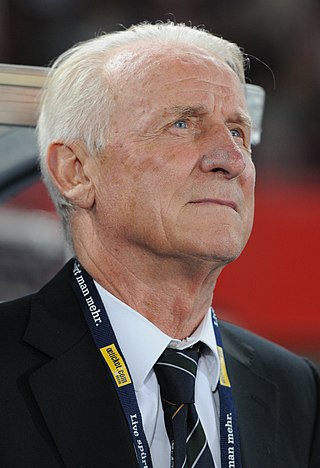
Giovanni Trapattoni, sometimes popularly known as "Trap" or "Il Trap", is an Italian football former manager and former footballer, considered the most successful club coach of Italian football. A former defensive midfielder, as a player he spent almost his entire club career with AC Milan, where he won two Serie A league titles, and two European Cups, in 1962–63 and 1968–69. Internationally, he played for Italy, earning 17 caps and being part of the squad at the 1962 FIFA World Cup in Chile.
Rudolf Nureyev, Russian-French dancer and choreographer (d. 1993) births
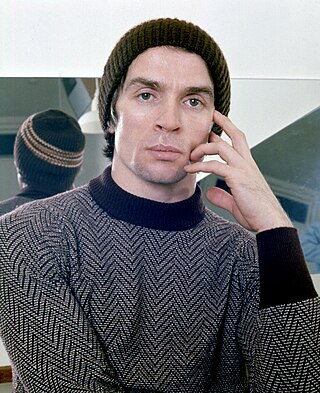
Rudolf Khametovich Nureyev was a Soviet-born ballet dancer and choreographer. Nureyev is regarded by some as the greatest male ballet dancer of his generation.
Keith O'Brien, Northern Ireland-born Scottish cleric, theologian, and cardinal (d. 2018) births
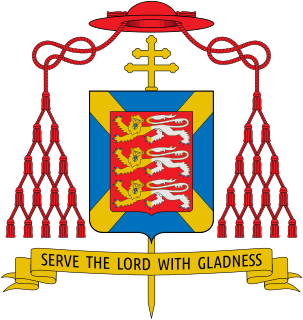
Keith Michael Patrick Cardinal O'Brien was a senior-ranking Catholic prelate in Scotland. He was the Archbishop of Saint Andrews and Edinburgh from 1985 to 2013.
Zola Taylor, American singer (d. 2007) births

Zoletta Lynn Taylor was an American singer. She was the original female member of The Platters from 1954 to 1962, when the group produced most of their popular singles.
Galina Samsova, Russian ballerina births
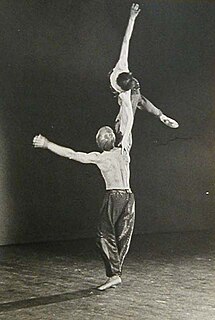
Galina Samsova was a Russian ballet dancer and company director.
Ida Kleijnen, Dutch chef (d. 2019) births
Ida Kleijnen was a Dutch chef.
Ladislav Kupkovič, Slovakian composer and conductor (d. 2016) births
Ladislav Kupkovič was a Slovak composer and conductor.
Ken Mattingly, American admiral, pilot, and astronaut births
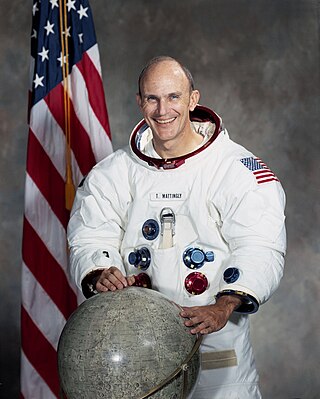
Thomas Kenneth Mattingly II is an American former aviator, aeronautical engineer, test pilot, rear admiral in the United States Navy and astronaut who flew on the Apollo 16, STS-4 and STS-51-C missions.
Fred T. Mackenzie, American biologist and academic births

Frederick T. Mackenzie is an American sedimentary and global biogeochemist. Mackenzie applies experimental and field data coupled to a sound theoretical framework to the solution of geological, geochemical, and oceanographic problems at various time and space scales.
Adam Wade, American singer, drummer, and actor births
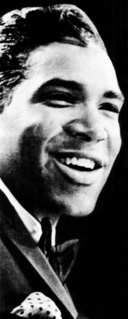
Patrick Henry "Adam" Wade was an American singer, musician, and actor. Wade was perhaps most known for his stint as the host of the CBS game show Musical Chairs (1975), making him the first Black game show host in the United States.
Myrlie Evers-Williams, American journalist and activist births

Myrlie Louise Evers-Williams is an American civil rights activist and journalist who worked for over three decades to seek justice for the 1963 murder of her husband Medgar Evers, another civil rights activist. She also served as chairwoman of the NAACP, and published several books on topics related to civil rights and her husband’s legacy. On January 21, 2013, she delivered the invocation at the second inauguration of Barack Obama.
Penelope Lively, English author births

Dame Penelope Margaret Lively is a British writer of fiction for both children and adults. Lively has won both the Booker Prize and the Carnegie Medal for British children's books.
Patricia Breslin, American actress (d. 2011) births

Patricia Rose Breslin was an American actress and philanthropist. She had a prominent career in television, which included recurring roles as Amanda Miller on The People's Choice (1955–58), and as Laura Harrington Brooks on Peyton Place (1964–65). She also appeared in Go, Man, Go! (1954), and the William Castle horror films Homicidal (1961) and I Saw What You Did (1965).
David Peakall, English-American chemist and toxicologist (d. 2001) births
David Beaumont Peakall was an internationally recognised toxicologist. His research into the effects of DDE and DDT on eggshells contributed to the ban on DDT in the United States. He proved that the chemicals caused thinning of eggshells, leading to a reduction in the population of various bird species. He also pioneered research on the effects of PCBs on birds.
Paul Horn, American-Canadian flute player and saxophonist (d. 2014) births
Paul Horn was an American flautist, saxophonist, composer and producer. He became a pioneer of world and new age music with his 1969 album Inside. He received five Grammy nominations between 1965 and 1999, including three nominations in 1965.
James Irwin, American colonel, pilot, and astronaut (d. 1991) births

James Benson Irwin was an American astronaut, aeronautical engineer, test pilot, and a United States Air Force pilot. He served as Apollo Lunar Module pilot for Apollo 15, the fourth human lunar landing. He was the eighth person to walk on the Moon and the first, and youngest, of those astronauts to die.
William John McKeag, Canadian businessman and politician, 17th Lieutenant Governor of Manitoba (d. 2007) births
William John McKeag, was a Manitoba politician and office-holder. He served as the province's 17th Lieutenant Governor between 1970 and 1976.
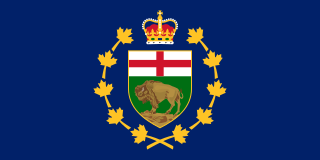
The lieutenant governor of Manitoba is the viceregal representative in Manitoba of the Canadian monarch, King Charles III, who operates distinctly within the province but is also shared equally with the ten other jurisdictions of Canada, as well as the other Commonwealth realms and any subdivisions thereof, and resides predominantly in his oldest realm, the United Kingdom. The lieutenant governor of Manitoba is appointed in the same manner as the other provincial viceroys in Canada and is similarly tasked with carrying out most of the monarch's constitutional and ceremonial duties. The present, and 26th, lieutenant governor of Manitoba is Anita Neville, who has served in the role since 24 October 2022.
Betty Allen, American soprano and educator (d. 2009) births

Betty Allen was an American operatic mezzo-soprano who had an active international singing career during the 1950s through the 1970s. In the latter part of her career her voice acquired a contralto-like darkening, which can be heard on her recording of Sergei Prokofiev’s Alexander Nevsky with conductor Eugene Ormandy and the Philadelphia Orchestra. She was known for her collaborations with American composers, such as Leonard Bernstein, Aaron Copland, David Diamond, Ned Rorem, and Virgil Thomson among others.
Siegfried Lenz, Polish-German author and playwright (d. 2014) births
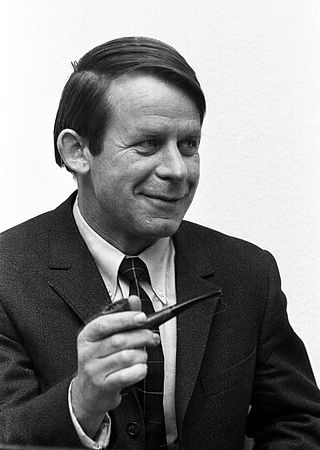
Siegfried Lenz was a German writer of novels, short stories and essays, as well as dramas for radio and the theatre. In 2000 he received the Goethe Prize on the 250th Anniversary of Johann Wolfgang von Goethe's birth. He won the 2010 International Nonino Prize in Italy.
Aleksei Brusilov, Georgian-Russian general (b. 1853) deaths

Aleksei Alekseyevich Brusilov was a Russian and later Soviet general most noted for the development of new offensive tactics used in the 1916 Brusilov Offensive, which was his greatest achievement. The innovative and relatively successful tactics used were later copied by the Germans. Born into the aristocracy to a father who was also a general, Brusilov trained as a cavalry officer, but by 1914 he realized that cavalry was obsolete in the new style of warfare because of its vulnerability to machine gun and artillery. Historians portray him as the only First World War Russian general capable of winning major battles. However, his heavy casualties seriously weakened the Russian army, which was unable to replace its losses.
Gabriele Ferzetti, Italian actor (d. 2015) births
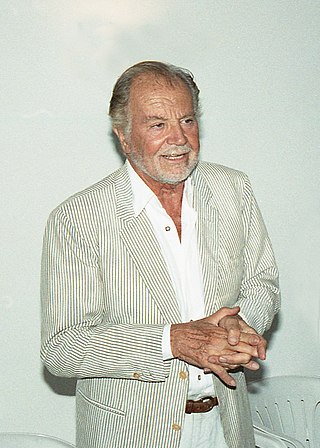
Gabriele Ferzetti was an Italian actor with more than 160 credits across film, television, and stage. His career was at its peak in the 1950s and 1960s.
Stephen Dodgson, English composer and educator (d. 2013) births
Stephen Cuthbert Vivian Dodgson was a British composer and broadcaster. Dodgson's prolific musical output covered most genres, ranging from opera and large-scale orchestral music to chamber and instrumental music, as well as choral works and song. Three instruments to which he dedicated particular attention were the guitar, harpsichord and recorder. He wrote in a mainly tonal, although sometimes unconventional, idiom. Some of his works use unusual combinations of instruments.
Patrick Suppes, American psychologist and philosopher (d. 2014) births
Patrick Colonel Suppes was an American philosopher who made significant contributions to philosophy of science, the theory of measurement, the foundations of quantum mechanics, decision theory, psychology and educational technology. He was the Lucie Stern Professor of Philosophy Emeritus at Stanford University and until January 2010 was the Director of the Education Program for Gifted Youth also at Stanford.
Meir Amit, Israeli general and politician, 12th Israeli Minister of Communications (d. 2009) births

Meir Amit was an Israeli politician and cabinet minister. He served as the Chief Director and the head of global operations for Mossad from 1963 to 1968, before entering into politics and holding two ministerial positions. He was also widely regarded as the most successful intelligence officer and a leading political figure for Israel.

The Ministry of Communications is the Israeli government ministry responsible for Communications in Israel. It is a relatively minor position in the cabinet. The ministry was established in 1952, and until 1970 was known as the Ministry of Postal Services.
Sheikh Mujibur Rahman, Bangladeshi politician, 1st President of Bangladesh (d. 1975) births

Sheikh Mujibur Rahman, often shortened as Sheikh Mujib or Mujib and widely known as Bangabandhu, was a Bengali politician, parliamentarian, diarist, and the founding leader of the People's Republic of Bangladesh. He first served as the titular President of the Provisional Government of Bangladesh between April 1971 and January 1972. He then served as Prime Minister of Bangladesh from the Awami League between January 1972 and January 1975. He finally served as President again during BAKSAL from January 1975 till his assassination in August 1975. In 2011, the 15th constitutional amendment in Bangladesh referred to Sheikh Mujib as the Father of the Nation who declared independence; these references were enshrined in the fifth, sixth, and seventh schedules of the constitution.
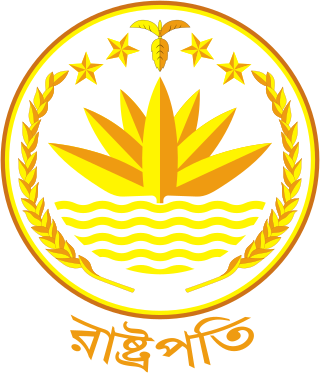
The president of Bangladesh officially the President of the People's Republic of Bangladesh is the head of state of Bangladesh and commander-in-chief of the Bangladesh Armed Forces.
Nat King Cole, American singer, pianist, and television host (d. 1965) births
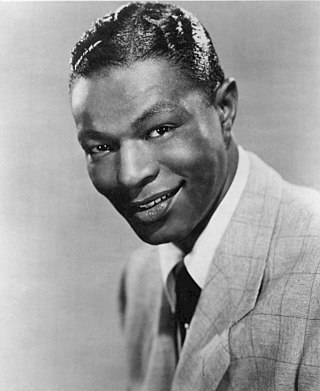
Nathaniel Adams Coles, known professionally as Nat King Cole, was an American singer, jazz pianist, and actor. Cole's music career began after he dropped out of school at the age of 15, and continued for the remainder of his life. He found great popular success and recorded over 100 songs that became hits on the pop charts. His trio was the model for small jazz ensembles that followed. Cole also acted in films and on television and performed on Broadway. He was the first African-American man to host an American television series. He is the father of singer Natalie Cole (1950–2015).
Franz Brentano, German philosopher and psychologist (b. 1838) deaths

Franz Clemens Honoratus Hermann Josef Brentano was an influential German philosopher, psychologist, and former Catholic priest whose work strongly influenced not only students Edmund Husserl, Sigmund Freud, Tomáš Masaryk, Rudolf Steiner, Alexius Meinong, Carl Stumpf, Anton Marty, Kazimierz Twardowski, and Christian von Ehrenfels, but many others whose work would follow and make use of his original ideas and concepts.
Ray Ellington, English drummer and bandleader (d. 1985) births

Henry Pitts Brown, known professionally as Ray Ellington, was an English singer, drummer and bandleader. He is best known for his appearances on The Goon Show from 1951 to 1960. The Ray Ellington Quartet had a regular musical segment on the show, and Ellington also had a small speaking role in many episodes, often as a parodic African, Native American or Arab chieftain.
Robert S. Arbib Jr., American ornithologist, writer and conservationist (d. 1987) births
Robert Simeon Arbib Jr. was an American ornithologist, writer and conservationist. From 1970 to 1984 he was editor of American Birds, the magazine of the National Audubon Society, and was the author of several books on birds and nature, including The Lord's Woods: The Passing of an American Woodland, which was awarded the John Burroughs Medal for the best American nature book of 1972.
Bill Roycroft, Australian equestrian rider (d. 2011) births
James William George Roycroft, OBE was an Australian Olympic equestrian champion. He grew up on a dairy farm and learnt to ride horses there. After serving in the army in World War II, he moved with his family to a soldier's block in western Victoria near Camperdown, where he raised his three sons, all of whom went on to compete alongside their father in the Olympics. At his first Olympics, the 1960 Rome Games, he played a key role on the final day of the team three-day event, despite being thrown off his horse the day before, allowing Australia to win the gold medal in the competition. He went on to compete in four more Olympics from 1964 to 1976, winning bronze medals in team eventing at the 1968 Mexico City and 1976 Montreal Games. He later served as coach of the Australian eventing team.
Sammy Baugh, American football player and coach (d. 2008) births
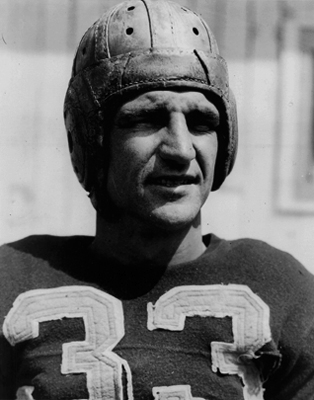
Samuel Adrian Baugh was an American professional football player and coach. During his college and professional careers, he most notably played quarterback, but also played as a safety and punter. He played college football for the Horned Frogs at Texas Christian University, where he was a twice All-American. He then played in the National Football League (NFL) for the Washington Redskins from 1937 to 1952. After his playing career, he served as a college coach for Hardin–Simmons University before coaching professionally for the New York Titans and the Houston Oilers.
Bayard Rustin, American activist (d. 1987) births

Bayard Rustin was an African American leader in social movements for civil rights, socialism, nonviolence, and gay rights.
Sonny Werblin, American businessman and philanthropist (d. 1991) births
David Abraham "Sonny" Werblin was a prominent entertainment industry executive and sports impresario who was an owner of the New York Jets and chairman of Madison Square Garden, and who built and managed the Meadowlands Sports Complex.
Brigitte Helm, German-Swiss actress (d. 1996) births
Brigitte Helm was a German actress, best remembered for her dual role as Maria and her double named Futura, in Fritz Lang's 1927 silent film, Metropolis.
Jean Van Houtte, Belgian academic and politician, 50th Prime Minister of Belgium (d. 1991) births

Jean (Jan) Marie Joseph, Baron Van Houtte was a Belgian politician who served as the prime minister of Belgium from 1952 to 1954.

The Prime Minister of Belgium or the Premier of Belgium is the head of the federal government of Belgium, and the most powerful person in Belgian politics.
Takeo Miki, Japanese politician, 41st Prime Minister of Japan (d. 1988) births

Takeo Miki was a Japanese politician who served as Prime Minister of Japan from 1974 until 1976.

The prime minister of Japan is the head of government of Japan. The prime minister chairs the Cabinet of Japan and has the ability to select and dismiss its Ministers of State. The prime minister also serves as the civilian commander-in-chief of the Japan Self Defence Forces and as a sitting member of the House of Representatives. The individual is appointed by the emperor of Japan after being nominated by the National Diet and must retain the nomination of the lower house and answer to parliament to remain in office.
Lillian Yarbo, American comedienne, dancer, and singer (d. 1996) births

Lillian "Billie" Yarbo was an American stage and screen comedienne, dancer, and singer.
Chaim Gross, Austrian-American sculptor and educator (d. 1991) births

Chaim Gross was an American sculptor and educator of Ukrainian Jewish origin.
Bobby Jones, American golfer and lawyer (d. 1971) births
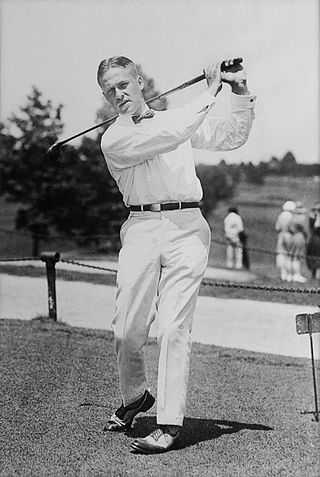
Robert Tyre Jones Jr. was an American amateur golfer who was one of the most influential figures in the history of the sport; he was also a lawyer by profession. Jones founded and helped design the Augusta National Golf Club, and co-founded the Masters Tournament. The innovations that he introduced at the Masters have been copied by virtually every professional golf tournament in the world.
Alfred Newman, American composer and conductor (d. 1970) births

Alfred Newman was an American composer, arranger, and conductor of film music. From his start as a music prodigy, he came to be regarded as a respected figure in the history of film music. He won nine Academy Awards and was nominated 45 times, contributing to the extended Newman family being the most Academy Award-nominated family, with a collective 92 nominations in various music categories.
Lloyd Rees, Australian painter (d. 1988) births
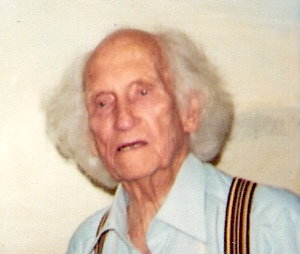
Lloyd Frederic Rees was an Australian landscape painter who twice won the Wynne Prize for his landscape paintings.
Paul Green, American playwright and academic (d. 1981) births
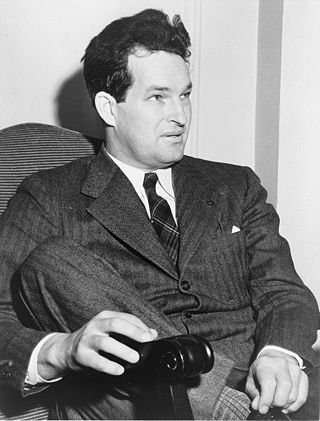
Paul Eliot Green was an American playwright whose work includes historical dramas of life in North Carolina during the first decades of the twentieth century. He received the Pulitzer Prize for Drama for his 1927 play, In Abraham's Bosom, which was included in Burns Mantle's The Best Plays of 1926-1927.
Jules Ferry, French lawyer and politician, 44th Prime Minister of France (b. 1832) deaths
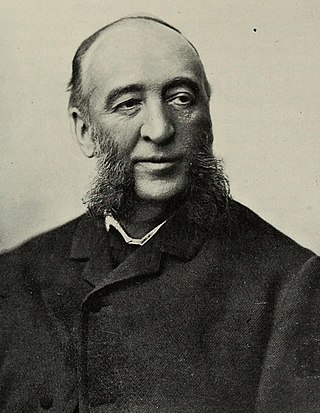
Jules François Camille Ferry was a French statesman and republican philosopher. He was one of the leaders of the Moderate Republicans and served as Prime Minister of France from 1880 to 1881 and 1883 to 1885. He was a promoter of laicism and colonial expansion. Under the Third Republic, Ferry made primary education free and compulsory through several new laws. However, he was forced to resign following the Sino-French War in 1885 due to his unpopularity and public opinion against the war.

The prime minister of France, officially the prime minister of the French Republic, is the head of government of the French Republic and the leader of the Council of Ministers.
Floyd B. Barnum, American college football coach (d. 1965) births
Floyd Bates Barnum was an American football coach He was the fourth head football coach at Jamestown College—now known as the University of Jamestown—in Jamestown, North Dakota, serving for one season, in 1921, and compiling a record of 0–2–1.
Sayed Darwish, Egyptian singer-songwriter and producer (d. 1923) births

Sayed Darwish was an Egyptian singer and composer who was considered the father of Egyptian popular music and one of Egypt's greatest musicians and seen by some as its single greatest composer.
Ross McLarty, Australian politician, 17th Premier of Western Australia (d. 1962) births

Sir Duncan Ross McLarty, was an Australian politician and the 17th Premier of Western Australia.
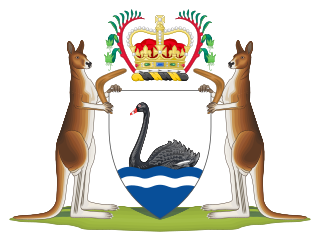
The premier of Western Australia is the head of government of the state of Western Australia. The role of premier at a state level is similar to the role of the prime minister of Australia at a federal level. The premier leads the executive branch of the Government of Western Australia and is accountable to the Parliament of Western Australia. The premier is appointed by the governor of Western Australia. By convention, the governor appoints as premier whoever has the support of the majority of the Western Australian Legislative Assembly. In practice, this means that the premier is the leader of the political party or group of parties with a majority of seats in the Legislative Assembly. Since Western Australia achieved self-governance in 1890, there have been 31 premiers. Mark McGowan is the current premier, having been appointed to the position on 17 March 2017.
Harry Clarke, Irish stained-glass artist and book illustrator (d. 1931) births

Henry Patrick Clarke was an Irish stained-glass artist and book illustrator. Born in Dublin, he was a leading figure in the Irish Arts and Crafts Movement.
Paul Ramadier, French lawyer and politician, Prime Minister of France (d. 1961) births
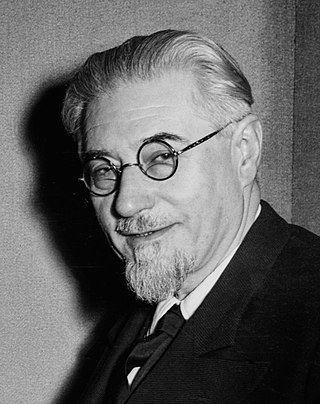
Paul Ramadier was a French statesman.

The prime minister of France, officially the prime minister of the French Republic, is the head of government of the French Republic and the leader of the Council of Ministers.
Princess Patricia of Connaught (d. 1974) births

Princess Victoria Patricia Helena Elizabeth of Connaught, later Lady Patricia Ramsay, was a granddaughter of Queen Victoria. Upon her marriage to Alexander Ramsay, she relinquished her title of a British princess and the style of Royal Highness.
Ralph Rose, American track and field athlete (d. 1913) births

Ralph Waldo Rose was an American track and field athlete. He was born in Healdsburg, California.
Alcide Nunez, American clarinet player (d. 1934) births

Alcide Patrick Nunez, also known as Yellow Nunez and Al Nunez, was an American jazz clarinetist. He was one of the first musicians of New Orleans to make audio recordings.
Walter Rudolf Hess, Swiss physiologist and academic, Nobel Prize laureate (d. 1973) births
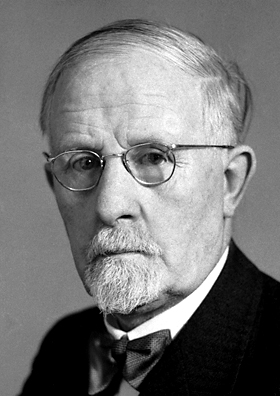
Walter Rudolf Hess was a Swiss physiologist who won the Nobel Prize in Physiology or Medicine in 1949 for mapping the areas of the brain involved in the control of internal organs. He shared the prize with Egas Moniz.

The Nobel Prize in Physiology or Medicine is awarded yearly by the Nobel Assembly at the Karolinska Institute for outstanding discoveries in physiology or medicine. The Nobel Prize is not a single prize, but five separate prizes that, according to Alfred Nobel's 1895 will, are awarded "to those who, during the preceding year, have conferred the greatest benefit to humankind". Nobel Prizes are awarded in the fields of Physics, Chemistry, Physiology or Medicine, Literature, and Peace.
Patrick Hastings, English lawyer and politician, Attorney General for England and Wales (d. 1952) births
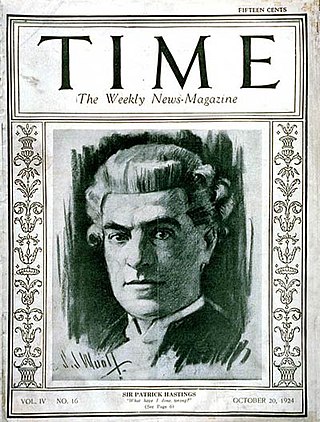
Sir Patrick Gardiner Hastings was an English barrister and politician noted for his long and highly successful career as a barrister and his short stint as Attorney General. He was educated at Charterhouse School until 1896, when his family moved to continental Europe. There he learnt to shoot and ride horses, allowing him to join the Suffolk Imperial Yeomanry after the outbreak of the Second Boer War. After demobilisation he worked briefly as an apprentice to an engineer in Wales before moving to London to become a barrister. Hastings joined the Middle Temple as a student on 4 November 1901, and after two years of saving money for the call to the bar he finally qualified as a barrister on 15 June 1904.

His Majesty's Attorney General for England and Wales is one of the law officers of the Crown and the principal legal adviser to sovereign and Government in affairs pertaining to England and Wales. The attorney general maintains the Attorney General's Office and currently attends Cabinet. Unlike in other countries employing the common law legal system, the attorney general does not govern the administration of justice; that function is carried out by the secretary of state for justice and lord chancellor. The incumbent is also concurrently advocate general for Northern Ireland.
Lawrence Oates, English lieutenant and explorer (d. 1912) births
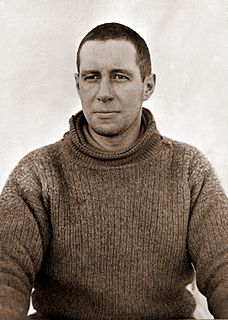
Captain Lawrence Edward Grace "Titus" Oates was a British army officer, and later an Antarctic explorer, who died from hypothermia during the Terra Nova Expedition when he walked from his tent into a blizzard. His death, which occurred on his 32nd birthday, is seen as an act of self-sacrifice when, aware that the gangrene and frostbite from which he was suffering was compromising his three companions' chances of survival, he chose certain death for himself in order to relieve them of the burden of caring for him.
Edith New, English militant suffragette (d. 1951) births

Edith Bessie New was an English suffragette. She was one of the first two suffragettes to use vandalism as a tactic. She and Mary Leigh were surprised to find their destruction was celebrated and they were pulled triumphantly by lines of suffragettes on their release in 1908.
Otto Gross, Austrian-German psychoanalyst and philosopher (d. 1920) births
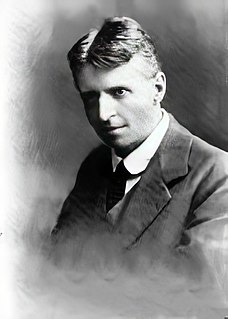
Otto Hans Adolf Gross was an Austrian psychoanalyst. A maverick early disciple of Sigmund Freud, he later became an anarchist and joined the utopian Ascona community.
Ferdinand Laub, Czech violinist and composer (b. 1832) deaths

Ferdinand Laub was a Czech violinist and composer.
Robert Chambers, Scottish geologist and publisher, co-founded Chambers Harrap (b. 1802) deaths
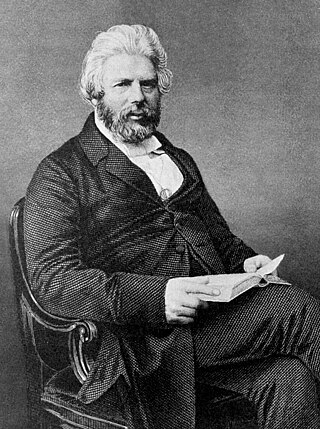
Robert Chambers was a Scottish publisher, geologist, evolutionary thinker, author and journal editor who, like his elder brother and business partner William Chambers, was highly influential in mid-19th-century scientific and political circles.
Chambers is a reference publisher formerly based in Edinburgh, Scotland, which held the property rights of W. R. Chambers Publishers.
Patrice Contamine de Latour, Spanish poet (d. 1926) births
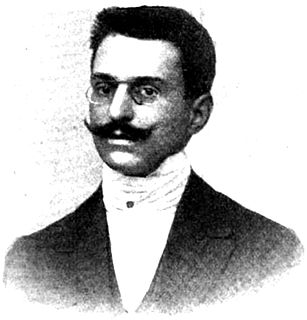
Patrice Contamine de Latour, born in Tarragona as José Maria Vicente Ferrer Francisco de Paola Patricio Manuel Contamine and published as J. P. Contamine de Latour, was a Spanish poet who lived in Paris.
Pierce Butler, American lawyer and jurist (d. 1939) births
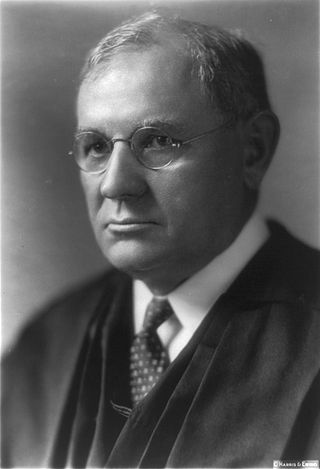
Pierce Butler was an American jurist who served as an associate justice of the Supreme Court of the United States from 1923 until his death in 1939. He was a staunch conservative and was regarded as a part of the Four Horsemen, the conservative bloc that dominated the Supreme Court during the 1930s. A devout Catholic, he was the sole dissenter in the later case Buck v. Bell, though he did not write an opinion.
Joseph Baptista, Indian engineer, lawyer, and politician (d. 1930) births

Joseph "Kaka" Baptista was an Indian politician and activist from Bombay, closely associated with the Lokmanya Tilak and the Home Rule Movement. He was the first president of Indian Home Rule League established in 1916. He was elected as the mayor of Bombay in 1925. He was given the title Kaka that means "uncle".
Martha P. Falconer, American social reformer (d. 1941) births

Martha Platt Falconer was a pioneer social reformer.
Silvio Gesell, Belgian merchant and economist (d. 1930) births

Johann Silvio Gesell was a German-Argentine economist, merchant, and the founder of Freiwirtschaft, an economic model for market socialism. In 1900 he founded the magazine Geld-und Bodenreform, but it soon closed for financial reasons. During one of his stays in Argentina, where he lived in a vegetarian commune, Gesell started the magazine Der Physiokrat together with Georg Blumenthal. In 1914, it closed due to censorship.
Mikhail Vrubel, Russian painter (d. 1910) births

Mikhail Aleksandrovich Vrubel was a Russian painter, draughtsman, and sculptor. A prolific and innovative master in various media such as painting, drawing, decorative sculpture, and theatrical art, Vrubel is generally characterized as one of the most important artists in Russian Symbolist tradition and a pioneering figure of Modernist art.
Christian Doppler, Austrian physicist and mathematician (b. 1803) deaths

Christian Andreas Doppler was an Austrian mathematician and physicist. He is celebrated for his principle – known as the Doppler effect – that the observed frequency of a wave depends on the relative speed of the source and the observer.
Charles F. Brush, American businessman and philanthropist, co-invented the Arc lamp (d. 1929) births

Charles Francis Brush was an American engineer, inventor, entrepreneur, and philanthropist.
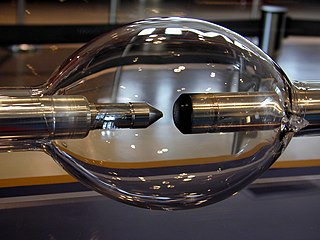
An arc lamp or arc light is a lamp that produces light by an electric arc.
Cornelia Clapp, American marine biologist (d. 1934) births

Cornelia Maria Clapp was an American zoologist and educator, specializing in marine biology. She earned the first Ph.D. in biology awarded to a woman in the United States from Syracuse University in 1889, and she would earn a second doctoral degree from the University of Chicago in 1896. Clapp was the first female researcher employed at the Marine Biological Laboratory, as well as its first female trustee. She was rated one of the top zoologists in the United States in 1903, and her name was starred in the first five editions of American Men of Science.
William II, Dutch sovereign prince and king (b. 1792) deaths
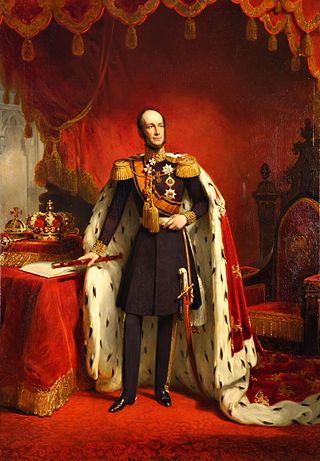
William II was King of the Netherlands, Grand Duke of Luxembourg, and Duke of Limburg.
Kate Greenaway, English author and illustrator (d. 1901) births

Catherine Greenaway was an English Victorian artist and writer, known for her children's book illustrations. She received her education in graphic design and art between 1858 and 1871 from the Finsbury School of Art, the South Kensington School of Art, the Heatherley School of Art and the Slade School of Fine Art. She began her career designing for the burgeoning holiday card market, producing Christmas and Valentine's cards. In 1879 wood-block engraver and printer, Edmund Evans, printed Under the Window, an instant best-seller, which established her reputation. Her collaboration with Evans continued throughout the 1880s and 1890s.
Friedrich Bessel, German astronomer, mathematician, and physicist (b. 1784) deaths

Friedrich Wilhelm Bessel was a German astronomer, mathematician, physicist, and geodesist. He was the first astronomer who determined reliable values for the distance from the sun to another star by the method of parallax. A special type of mathematical functions were named Bessel functions after Bessel's death, though they had originally been discovered by Daniel Bernoulli and then generalised by Bessel.
Rosina Heikel, Finnish physician (d. 1929) births
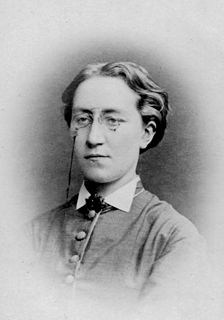
Emma Rosina Heikel was a Finnish medical doctor and feminist. In 1878, she became the first female physician in Finland, and specialised in gynaecology and paediatrics.

A physician, medical practitioner, medical doctor, or simply doctor, is a health professional who practices medicine, which is concerned with promoting, maintaining or restoring health through the study, diagnosis, prognosis and treatment of disease, injury, and other physical and mental impairments. Physicians may focus their practice on certain disease categories, types of patients, and methods of treatment—known as specialities—or they may assume responsibility for the provision of continuing and comprehensive medical care to individuals, families, and communities—known as general practice. Medical practice properly requires both a detailed knowledge of the academic disciplines, such as anatomy and physiology, underlying diseases and their treatment—the science of medicine—and also a decent competence in its applied practice—the art or craft of medicine.
Josef Rheinberger, Liechtensteiner-German organist and composer (d. 1901) births
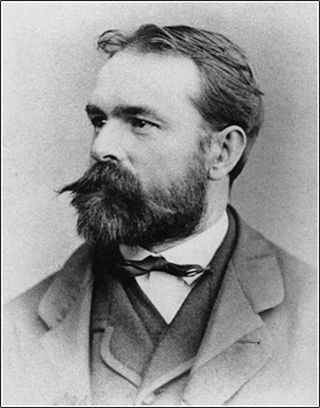
Josef Gabriel Rheinberger was a Liechtensteiner organist and composer, residing in Bavaria for most of his life.
Gottlieb Daimler, German engineer and businessman, co-founded Daimler-Motoren-Gesellschaft (d. 1900) births

Gottlieb Wilhelm Daimler was a German engineer, industrial designer and industrialist born in Schorndorf, in what is now Germany. He was a pioneer of internal-combustion engines and automobile development. He invented the high-speed liquid petroleum-fueled engine.
Daimler-Motoren-Gesellschaft was a German engineering company and later automobile manufacturer, in operation from 1890 until 1926. Founded by Gottlieb Daimler (1834–1900) and Wilhelm Maybach (1846–1929), it was based first in Cannstatt. Daimler died in 1900, and their business moved in 1903 to Stuttgart-Untertürkheim after the original factory was destroyed by fire, and again to Berlin in 1922. Other factories were located in Marienfelde and Sindelfingen.
Laurent de Gouvion Saint-Cyr, French general and politician (b. 1764) deaths

Laurent de Gouvion Saint-Cyr, 1st Marquis of Gouvion-Saint-Cyr was a French military commander in the French Revolutionary and Napoleonic Wars who rose to the rank of Marshal of the Empire. He is regarded as Napoleon's finest commander in defensive warfare.
Sophia Albertina, princess-abbess of Quedlinburg (b. 1753) deaths

Princess Sophia Albertina of Sweden was the last Princess-Abbess of Quedlinburg Abbey, and as such reigned as vassal monarch of the Holy Roman Empire.
James Edward Smith, English botanist and entomologist (b. 1759) deaths
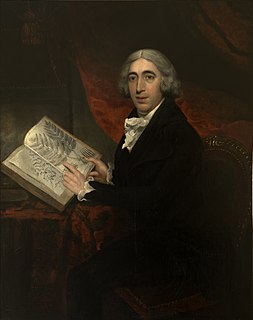
Sir James Edward Smith was an English botanist and founder of the Linnean Society.
Jean Ingelow, English poet and author (d. 1897) births

Jean Ingelow was an English poet and novelist, who gained sudden fame in 1863. She also wrote several stories for children.
Norbert Rillieux, African American inventor and chemical engineer (d. 1894) births

Norbert Rillieux was a Louisiana Creole inventor who was widely considered one of the earliest chemical engineers and noted for his pioneering invention of the multiple-effect evaporator. This invention was an important development in the growth of the sugar industry. Rillieux, a French-speaking Creole, was a cousin of the painter Edgar Degas.
Jim Bridger, American fur trader and explorer (d. 1881) births

James Felix "Jim" Bridger was an American mountain man, trapper, Army scout, and wilderness guide who explored and trapped in the Western United States in the first half of the 19th century. He was known as Old Gabe in his later years. He was from the Bridger family of Virginia, English immigrants who had been in North America since the early colonial period.
Daniel Bernoulli, Dutch-Swiss mathematician and physicist (b. 1700) deaths
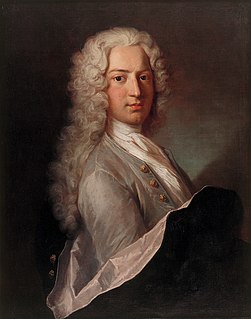
Daniel Bernoulli FRS was a Swiss mathematician and physicist and was one of the many prominent mathematicians in the Bernoulli family from Basel. He is particularly remembered for his applications of mathematics to mechanics, especially fluid mechanics, and for his pioneering work in probability and statistics. His name is commemorated in the Bernoulli's principle, a particular example of the conservation of energy, which describes the mathematics of the mechanism underlying the operation of two important technologies of the 20th century: the carburetor and the airplane wing.
Ebenezer Elliott, English poet and educator (d. 1849) births

Ebenezer Elliott was an English poet, known as the Corn Law rhymer for his leading the fight to repeal the Corn Laws, which were causing hardship and starvation among the poor. Though a factory owner himself, his single-minded devotion to the welfare of the labouring classes won him a sympathetic reputation long after his poetry ceased to be read.
Thomas Chalmers, Scottish minister, economist, and educator (d. 1847) births

Thomas Chalmers, was a Scottish minister, professor of theology, political economist, and a leader of both the Church of Scotland and of the Free Church of Scotland. He has been called "Scotland's greatest nineteenth-century churchman".
Patrick Brontë, Irish-English priest and author (d. 1861) births
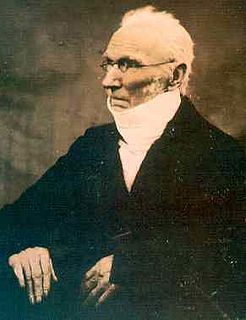
Patrick Brontë was an Irish Anglican priest and author who spent most of his adult life in England. He was the father of the writers Charlotte, Emily, and Anne Brontë, and of Branwell Brontë, his only son. Patrick outlived his wife, the former Maria Branwell, by forty years, by which time all of their six children had died as well.
Roger B. Taney, American politician and jurist, 5th Chief Justice of the United States (d. 1864) births
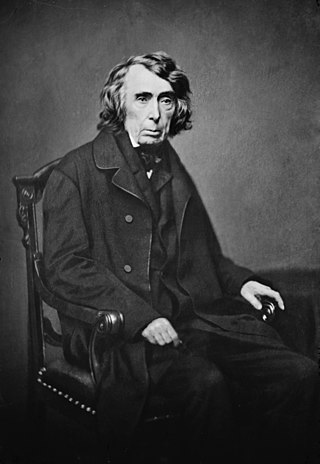
Roger Brooke Taney was the fifth chief justice of the United States, holding that office from 1836 until his death in 1864. Taney infamously delivered the majority opinion in Dred Scott v. Sandford (1857), ruling that African Americans could not be considered U.S. citizens and that Congress could not prohibit slavery in the U.S. territories. Prior to joining the U.S. Supreme Court, Taney served as the U.S. Attorney General and U.S. Secretary of the Treasury under President Andrew Jackson. He was the first Catholic to serve on the Supreme Court.

The chief justice of the United States is the chief judge of the Supreme Court of the United States and the highest-ranking officer of the U.S. federal judiciary. Article II, Section 2, Clause 2 of the U.S. Constitution grants plenary power to the president of the United States to nominate, and with the advice and consent of the United States Senate, appoint "Judges of the supreme Court", who serve until they resign, retire, are impeached and convicted, or die. The existence of a chief justice is explicit in Article One, Section 3, Clause 6 which states that the chief justice shall preside on the impeachment trial of the president.
George Parker, 2nd Earl of Macclesfield, English astronomer and politician (b. 1695) deaths
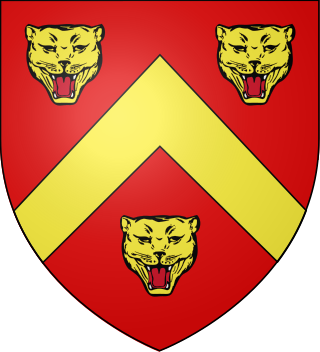
George Parker, 2nd Earl of Macclesfield, PRS was an English peer and astronomer.
Jean-Baptiste Rousseau, French poet and playwright (b. 1671) deaths
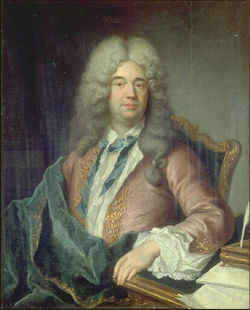
Jean-Baptiste Rousseau was a French playwright and poet, particularly noted for his cynical epigrams.
Lachlan McIntosh, Scottish-American general and politician (d. 1806) births

Lachlan McIntosh was a Scottish American military and political leader during the American Revolution and the early United States. In a 1777 duel, he fatally shot Button Gwinnett, a signer of the Declaration of Independence.
Gilbert Burnet, Scottish bishop and historian (b. 1643) deaths

Gilbert Burnet was a Scottish philosopher and historian, and Bishop of Salisbury. He was fluent in Dutch, French, Latin, Greek, and Hebrew. Burnet was highly respected as a cleric, a preacher, an academic, a writer and a historian. He was always closely associated with the Whig party, and was one of the few close friends in whom King William III confided.
Menno van Coehoorn, Dutch soldier and engineer (b. 1641) deaths

Menno, Baron van Coehoorn was a Dutch soldier and engineer, regarded as one of the most significant figures in Dutch military history. In an era when siege warfare dominated military campaigns, he and his French counterpart Vauban were the acknowledged experts in designing, taking and defending fortifications.
Jean-Baptiste Oudry, French painter and engraver (d. 1755) births

Jean-Baptiste Oudry was a French Rococo painter, engraver, and tapestry designer. He is particularly well known for his naturalistic pictures of animals and his hunt pieces depicting game.
François de La Rochefoucauld, French author (b. 1613) deaths

François VI, Duc de La Rochefoucauld, Prince de Marcillac was an accomplished French moralist of the era of French Classical literature and author of Maximes and Memoirs, the only two works of his dense literary oeuvre published. His Maximes portray the callous nature of human conduct, with a cynical attitude towards putative virtue and avowals of affection, friendship, love, and loyalty. Leonard Tancock regards Maximes as "one of the most deeply felt, most intensely lived texts in French literature", with his "experience, his likes and dislikes, sufferings and petty spites ... crystallized into absolute truths."
Thomas Boston, Scottish philosopher and theologian (d. 1732) births
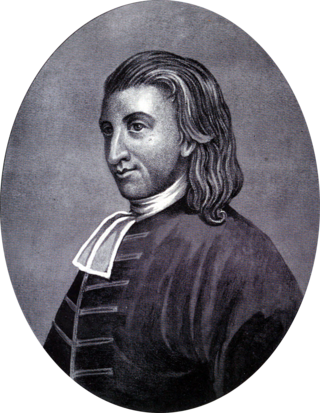
Thomas Boston was a Scottish Presbyterian church leader, theologian and philosopher. Boston was successively schoolmaster at Glencairn, and minister of Simprin in Berwickshire, and Ettrick in Selkirkshire. In addition to his best-known work, The Fourfold State, one of the religious classics of Scotland, he wrote an original little book, The Crook in the Lot, and a learned treatise on the Hebrew points. He also took a leading part in the Courts of the Church in what was known as the "Marrow Controversy," regarding the merits of an English work, The Marrow of Modern Divinity, which he defended against the attacks of the "Moderate" party in the Church. Boston, if unduly introspective, was a man of singular piety and amiability. His autobiography is an interesting record of Scottish life, full of sincerity and tenderness, and not devoid of humorous touches, intentional and otherwise.
Élisabeth Jacquet de La Guerre, French harpsichord player and composer (d. 1729) births

Élisabeth Claude Jacquet de La Guerre was a French musician, harpsichordist and composer.
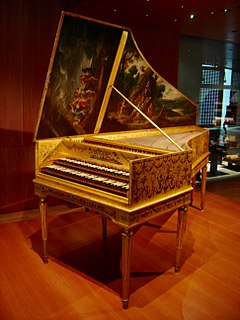
A harpsichord is a musical instrument played by means of a keyboard. This activates a row of levers that turn a trigger mechanism that plucks one or more strings with a small plectrum made from quill or plastic. The strings are under tension on a soundboard, which is mounted in a wooden case; the soundboard amplifies the vibrations from the strings so that the listeners can hear it. Like a pipe organ, a harpsichord may have more than one keyboard manual, and even a pedal board. Harpsichords may also have stop buttons which add or remove additional octaves. Some harpsichords may have a buff stop, which brings a strip of buff leather or other material in contact with the strings, muting their sound to simulate the sound of a plucked lute.
Jerome Weston, 2nd Earl of Portland, English diplomat (b. 1605) deaths
Jerome Weston, 2nd Earl of Portland was an English diplomat and landowner who held the presidency of Munster, Kingdom of Ireland.
Gabriel Lalemant, French missionary and saint (b. 1610) deaths

Gabriel Lalemant was a French Jesuit missionary in New France beginning in 1646. Caught up in warfare between the Huron and nations of the Iroquois Confederacy, he was killed in St. Ignace by Mohawk warriors and is one of the eight Canadian Martyrs.
Philip Massinger, English playwright (b. 1583) deaths

Philip Massinger was an English dramatist. His finely plotted plays, including A New Way to Pay Old Debts, The City Madam, and The Roman Actor, are noted for their satire and realism, and their political and social themes.
John Sarkander, Polish-Moravian priest and saint (b. 1576) deaths

Jan Sarkander was a Polish-Czech Roman Catholic priest. Sarkander was married for a short period of time before he became widowed and pursued a path to the priesthood where he became active in defence of the faith during a period of anti-Catholic sentiment and conflict. He himself was arrested on false accusations as a means of silencing him and he refused to give in to his tormenters who tortured him for around a month before he died.
Robert Douglas, Count of Skenninge, Swedish field marshal (d. 1662) births

Robert Douglas, Count of Skenninge, Baron of Skalby, was a Scottish cavalry general during the Thirty Years' War rising to the rank of Field Marshal (1657–1662) in the Swedish-Polish wars that followed. He founded the Swedish branch of Clan Douglas.
Sophia of Sweden, duchess of Saxe-Lauenburg (b. 1547) deaths

Princess Sophia of Sweden, also Sofia Gustavsdotter Vasa, was a Swedish princess, daughter of King Gustav Vasa of Sweden and Margareta Leijonhufvud. She was formally Duchess consort of Saxe-Lauenburg by her marriage to Duke Magnus II of Saxe-Lauenburg.
Alexander Ales, Scottish theologian and academic (b. 1500) deaths
Alexander Ales or Alexander Alesius was a Scottish theologian who emigrated to Germany and became a Lutheran supporter of the Augsburg Confession.
Toyotomi Hideyoshi, Japanese daimyō (d. 1598) births

Toyotomi Hideyoshi , otherwise known as Kinoshita Tōkichirō and Hashiba Hideyoshi , was a Japanese samurai and daimyō of the late Sengoku period regarded as the second "Great Unifier" of Japan.
Rana Sanga, Indian ruler (b. 1482) deaths

Sangram Singh I, popularly known as Rana Sanga or Maharana Sanga, was an Indian ruler from the Sisodia dynasty. He ruled Mewar, the traditional territory of Guhilas (Sisodias) in present-day north-western India. However, through his capable rule his kingdom turned into one of the greatest power of Northern India in early sixteenth century. He controlled parts of present-day Rajasthan, Gujarat, Madhya Pradesh and Uttar Pradesh with capital at Chittor. His reign was admired by several of contemporaries including Babur, who described him the "greatest Indian king" of that time along with Krishnadevaraya of South India. The Mughal historian Al-Badayuni called Sanga as the bravest of all Rajputs along with Prithviraj Chauhan. Rana Sanga was the last independent Hindu king of Northern India to control a significant territory before the Mughal Era. In some contemporary texts is described as the Hindu Emperor in Northern India.
Giovanni Francesco Commendone, Catholic cardinal (d. 1584) births

Giovanni Francesco Commendone was an Italian cardinal and papal nuncio.
Giuliano de' Medici, Italian nobleman (b. 1479) deaths

Giuliano di Lorenzo de' Medici KG was an Italian nobleman, the third son of Lorenzo the Magnificent, and a ruler of Florence.
James IV of Scotland (d. 1513) births

James IV was King of Scotland from 11 June 1488 until his death at the Battle of Flodden in 1513. He inherited the throne at the age of fifteen on the death of his father, James III, at the Battle of Sauchieburn, following a rebellion in which the younger James was the figurehead of the rebels. James IV is generally regarded as the most successful of the Stewart monarchs. He was responsible for a major expansion of the Scottish royal navy, which included the founding of two royal dockyards and the acquisition or construction of 38 ships, including the Michael, the largest warship of its time.
Ashikaga Yoshikazu, Japanese shōgun (b. 1407) deaths

Ashikaga Yoshikazu was the fifth shōgun of the Ashikaga shogunate who reigned from 1423 to 1425 during the Muromachi period of Japan. Yoshikazu was the son of the fourth shōgun Ashikaga Yoshimochi.
Ibn Khaldun, Tunisian sociologist, historian, and scholar (b. 1332) deaths

Ibn Khaldun was an Arab sociologist, philosopher, and historian widely acknowledged to be one of the greatest social scientists of the Middle Ages, who made major contributions in the areas of historiography, sociology, economics, and demography.
Louis of Enghien, French nobleman deaths
Louis of Enghien titular Duke of Athens, Count of Brienne and Lord of Enghien in 1381–1394, Count of Conversano in 1356–1394. His coat-of-arms was "Enghien, a label gules bezantee".
An-Nasir Hasan, Mamluk sultan of Egypt deaths
An-Nasir Badr ad-Din Hasan ibn Muhammad ibn Qalawun, better known as an-Nasir Hasan, was the Mamluk sultan of Egypt, and the seventh son of an-Nasir Muhammad to hold office, reigning twice in 1347–1351 and 1354–1361. During his first reign, which he began at age 12, senior Mamluk emirs formerly belonging to an-Nasir Muhammad, dominated his administration, while an-Nasir Hasan played a ceremonial role. He was toppled in 1351 when he attempted to assert executive authority to the chagrin of the senior emirs. He was reinstated three years later during a coup against his brother Sultan as-Salih Salih by emirs Shaykhu and Sirghitmish.
Go-Saga, emperor of Japan (b. 1220) deaths

Emperor Go-Saga was the 88th emperor of Japan, according to the traditional order of succession. This reign spanned the years 1242 through 1246.
Philip of Montfort, French knight and nobleman deaths

Philip Ι of Montfort, was Lord of La Ferté-Alais and Castres-en-Albigeois 1228–1270, Lord of Tyre 1246–1270, and Lord of Toron aft. 1240–1270. He was the son of Guy of Montfort and Helvis of Ibelin.
Pierre de Montreuil, French architect deaths
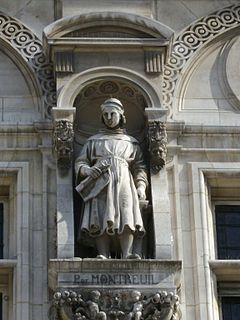
Pierre de Montreuil was a French architect. The name formerly given to him by architectural historians, Peter of Montereau, is a misnomer. It was based on his tombstone inscription Musterolo natus, a place name that was mistakenly identified as Montereau rather than Montreuil.
Emperor Shijō of Japan (d. 1242) births

Emperor Shijō was the 87th emperor of Japan, according to the traditional order of succession. This reign spanned the years 1232 through 1242.
Jocelin of Glasgow, Scottish monk and bishop (b. 1130) deaths
Jocelin was a twelfth-century Cistercian monk and cleric who became the fourth Abbot of Melrose before becoming Bishop of Glasgow, Scotland. He was probably born in the 1130s, and in his teenage years became a monk of Melrose Abbey. He rose in the service of Abbot Waltheof, and by the time of the short abbacy of Waltheof's successor Abbot William, Jocelin had become prior. Then in 1170 Jocelin himself became abbot, a position he held for four years. Jocelin was responsible for promoting the cult of the emerging Saint Waltheof, and in this had the support of Enguerrand, Bishop of Glasgow.
Lulach, king of Scotland deaths
Lulach mac Gille Coemgáin was King of Scots between 15 August 1057 and 17 March 1058.
Harold Harefoot, king of England deaths

Harold I, also known as Harold Harefoot, was King of the English from 1035 to 1040. Harold's nickname "Harefoot" is first recorded as "Harefoh" or "Harefah" in the twelfth century in the history of Ely Abbey, and according to some late medieval chroniclers it meant that he was "fleet of foot".
Kazan, emperor of Japan (b. 968) deaths

Emperor Kazan was the 65th emperor of Japan, according to the traditional order of succession.
Li Yu, Prince of De, prince and emperor of the Tang Dynasty deaths
Li Yu (李裕), né Li You (李祐), briefly Li Zhen (李縝), formally the Prince of De (德王), was an imperial prince of the Chinese dynasty Tang Dynasty. He was the oldest son of the penultimate emperor Emperor Zhaozong and Empress He and was Crown Prince from 897 to 900. In 900, Emperor Zhaozong was briefly forced by the eunuch Liu Jishu to abdicate in Li Yu's favor; after Emperor Zhaozong was restored, Li Yu was no longer Crown Prince but remained a favored son. After Emperor Zhaozong was assassinated by the powerful warlord Zhu Quanzhong in 904, Li Yu, whom Zhu was apprehensive of, was bypassed in favor of his younger brother Emperor Ai, and in 905, Zhu had Li Yu, along with eight of his younger brothers, killed. As Li Yu's brief reign was under duress from a eunuch, he is not typically considered a true emperor of Tang.
Haito, bishop of Basel deaths
Haito was a Christian monk and Bishop of Basel.
Harun al-Rashid, Abbasid caliph (d. 809) births

Abu Ja'far Harun ibn Muhammad al-Mahdi or Harun ibn al-Mahdi, famously known as Harun al-Rashid was the fifth Abbasid caliph of the Abbasid Caliphate, reigning from September 786 until his death. His reign is traditionally regarded to be the beginning of the Islamic Golden Age. His epithet "al-Rashid" translates to "the Orthodox", "the Just", "the Upright", or "the Rightly-Guided".

The Abbasid Caliphate was the third caliphate to succeed the Islamic prophet Muhammad. It was founded by a dynasty descended from Muhammad's uncle, Abbas ibn Abdul-Muttalib, from whom the dynasty takes its name. They ruled as caliphs for most of the caliphate from their capital in Baghdad in modern-day Iraq, after having overthrown the Umayyad Caliphate in the Abbasid Revolution of 750 CE (132 AH). The Abbasid Caliphate first centered its government in Kufa, modern-day Iraq, but in 762 the caliph Al-Mansur founded the city of Baghdad, near the ancient Babylonian capital city of Babylon. Baghdad became the center of science, culture and invention in what became known as the Golden Age of Islam. This, in addition to housing several key academic institutions, including the House of Wisdom, as well as a multiethnic and multi-religious environment, garnered it a worldwide reputation as the "Center of Learning".
Gertrude of Nivelles, Frankish abbess deaths

Gertrude of Nivelles, OSB was a seventh-century abbess who, with her mother Itta, founded the Abbey of Nivelles, now in Belgium.
Amr ibn Hishām, Arab polytheist deaths
ʿAmr ibn Hishām al-Makhzūmī ,, also known as Abu Jahl, was one of the Meccan polytheist pagan leaders from the Quraysh known for his opposition towards the Islamic prophet Muhammad and the early Muslims in Mecca.
Marcus Aurelius, Roman emperor (b. 121) deaths

Marcus Aurelius Antoninus was Roman emperor from 161 to 180 AD and a Stoic philosopher. He was the last of the rulers known as the Five Good Emperors, and the last emperor of the Pax Romana, an age of relative peace and stability for the Roman Empire lasting from 27 BC to 180 AD. He served as Roman consul in 140, 145, and 161.
Titus Labienus, Roman general (b. 100 BC) deaths
Titus Labienus was a high-ranking military officer in the late Roman Republic. He served as tribune of the Plebs in 63 BC. Although mostly remembered as one of Julius Caesar's best lieutenants in Gaul, mentioned frequently in the accounts of his military campaigns, Labienus chose to oppose him during the Civil War and was killed at Munda. He was the father of Quintus Labienus.
Publius Attius Varus, Roman governor of Africa deaths
Publius Attius Varus was the Roman governor of Africa during the civil war between Julius Caesar and Pompey. He declared war against Caesar, and initially fought Gaius Scribonius Curio, who was sent against him in 49 BC.
Children's Day (Bangladesh)
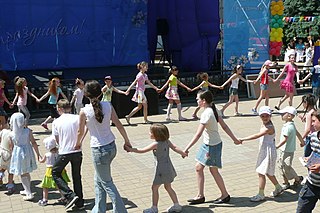
Children's Day is a commemorative date celebrated annually in honor of children, whose date of observance varies by country. In 1925, International Children's Day was first proclaimed in Geneva during the World Conference on Child Welfare. Since 1950, it is celebrated on June 1 in most Communist and post-Communist countries. World Children's Day is celebrated on the 20th November to commemorate the Declaration of the Rights of the Child by the UN General Assembly on 20 November 1959. In some countries, it is Children's Week and not Children's Day.

Bangladesh, officially the People's Republic of Bangladesh, is a country in South Asia. It is the eighth-most populous country in the world, with a population exceeding 165 million people in an area of 148,460 square kilometres (57,320 sq mi). Bangladesh is among the most densely populated countries in the world, and shares land borders with India to the west, north, and east, and Myanmar to the southeast; to the south it has a coastline along the Bay of Bengal. It is narrowly separated from Bhutan and Nepal by the Siliguri Corridor; and from China by the Indian state of Sikkim in the north. Dhaka, the capital and largest city, is the nation's political, financial and cultural centre. Chittagong, the second-largest city, is the busiest port on the Bay of Bengal. The official language is Bengali, one of the easternmost branches of the Indo-European language family.
Christian feast day: Alexius of Rome (Eastern Church)

Saint Alexius of Rome or Alexius of Edessa, also Alexis, was a fourth-century Greek monk who lived in anonymity and is known for his dedication to Christ. There are two versions of his life that are known, a Syriac one and a Greek one.

Eastern Christianity comprises Christian traditions and church families that originally developed during classical and late antiquity in Eastern Europe, Southeastern Europe, Asia Minor, the Caucasus, Northeast Africa, the Fertile Crescent and the Malabar coast of South Asia, and ephemerally parts of Persia, Central Asia, the Near East and the Far East. The term does not describe a single communion or religious denomination.
Christian feast day: Gertrude of Nivelles

Gertrude of Nivelles, OSB was a seventh-century abbess who, with her mother Itta, founded the Abbey of Nivelles, now in Belgium.
Christian feast day: John Sarkander

Jan Sarkander was a Polish-Czech Roman Catholic priest. Sarkander was married for a short period of time before he became widowed and pursued a path to the priesthood where he became active in defence of the faith during a period of anti-Catholic sentiment and conflict. He himself was arrested on false accusations as a means of silencing him and he refused to give in to his tormenters who tortured him for around a month before he died.
Christian feast day: Joseph of Arimathea (Western Church)

Joseph of Arimathea was, according to all four canonical gospels, the man who assumed responsibility for the burial of Jesus after his crucifixion. The historical location of Arimathea is uncertain, although it has been identified with several towns. A number of stories that developed during the Middle Ages connect him with Glastonbury, England and also with the Holy Grail legend.

Latin liturgical rites, or Western liturgical rites, are Catholic rites of public worship employed by the Latin Church, the largest particular church sui iuris of the Catholic Church, that originated in Europe where the Latin language once dominated. Its language is now known as Ecclesiastical Latin. The most used rite is the Roman Rite.
Christian feast day: Patrick of Ireland

Saint Patrick was a fifth-century Romano-British Christian missionary and bishop in Ireland. Known as the "Apostle of Ireland", he is the primary patron saint of Ireland, the other patron saints being Brigit of Kildare and Columba. Patrick was never formally canonised, having lived prior to the current laws of the Catholic Church in these matters. Nevertheless, he is venerated as a Saint in the Catholic Church and in the Eastern Orthodox Church, where he is regarded as equal-to-the-apostles and Enlightener of Ireland.
Christian feast day: March 17 (Eastern Orthodox liturgics)

March 16 – Eastern Orthodox liturgical calendar - March 18
Evacuation Day (Suffolk County, Massachusetts)

Evacuation Day is a holiday observed on March 17 in Suffolk County, Massachusetts and also by the public schools in Somerville, Massachusetts. The holiday commemorates the evacuation of British forces from the city of Boston following the siege of Boston, early in the American Revolutionary War. Schools and government offices are closed. If March 17 falls on a weekend, schools and government offices are closed on the following Monday in observance. It is the same day as Saint Patrick's Day, a coincidence that played a role in the establishment of the holiday.

Suffolk County is located in the Commonwealth of Massachusetts, in the United States. As of the 2020 census, the population was 797,936, making it the fourth-most populous county in Massachusetts. The county comprises the cities of Boston, Chelsea, Revere, and Winthrop. The traditional county seat is Boston, the state capital and the largest city in Massachusetts. The county government was abolished in 1999, and so Suffolk County today functions only as an administrative subdivision of state government and a set of communities grouped together for some statistical purposes. Suffolk County is located at the core of the Boston-Cambridge-Newton, MA-NH Metropolitan Statistical Area as well as the greater Boston-Worcester-Providence, MA-RI-NH-CT Combined Statistical Area.
Saint Patrick's Day, a public holiday in Ireland, Montserrat and the Canadian province of Newfoundland and Labrador, widely celebrated in the English-speaking world and to a lesser degree in other parts of the world.

Saint Patrick's Day, or the Feast of Saint Patrick, is a cultural and religious celebration held on 17 March, the traditional death date of Saint Patrick, the foremost patron saint of Ireland.

Montserrat is a British Overseas Territory in the Caribbean. It is part of the Leeward Islands, the northern portion of the Lesser Antilles chain of the West Indies. Montserrat is about 16 km (10 mi) long and 11 km (7 mi) wide, with roughly 40 km (25 mi) of coastline. It is nicknamed "The Emerald Isle of the Caribbean" both for its resemblance to coastal Ireland and for the Irish ancestry of many of its inhabitants. Montserrat is the only non-fully sovereign full member of the Caribbean Community and the Organisation of Eastern Caribbean States.
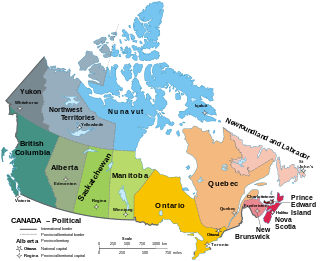
Within the geographical areas of Canada, the ten provinces and three territories are sub-national administrative divisions under the jurisdiction of the Canadian Constitution. In the 1867 Canadian Confederation, three provinces of British North America—New Brunswick, Nova Scotia, and the Province of Canada —united to form a federation, becoming a fully independent country over the next century. Over its history, Canada's international borders have changed several times as it has added territories and provinces, making it the world's second-largest country by area.

Newfoundland and Labrador is the easternmost province of Canada, in the country's Atlantic region. The province comprises the island of Newfoundland and the continental region of Labrador, having a total size of 405,212 square kilometres. In 2021, the population of Newfoundland and Labrador was estimated to be 521,758. The island of Newfoundland is home to around 94 per cent of the province's population, with more than half residing in the Avalon Peninsula.